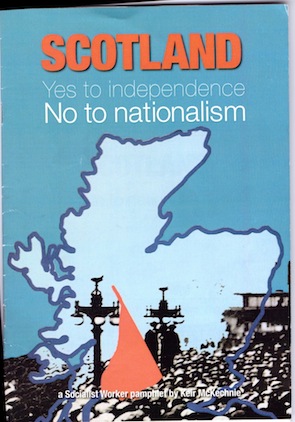 The following extended review of Keir McKechnie’s pamphlet, Scotland – Yes to Independence: No to Nationalism, was started before the most recent crisis in the SWP became public. Until the SWP resolves this crisis, its political interventions are likely to have more limited impact on the Left than in the past. Socialists should support those SWP members who are rebelling against their party’s bureaucratic and sectarian regime. The whole of the Left will benefit when the shared need for a democratic, non-sectarian and anti-sexist culture is accepted.
The following extended review of Keir McKechnie’s pamphlet, Scotland – Yes to Independence: No to Nationalism, was started before the most recent crisis in the SWP became public. Until the SWP resolves this crisis, its political interventions are likely to have more limited impact on the Left than in the past. Socialists should support those SWP members who are rebelling against their party’s bureaucratic and sectarian regime. The whole of the Left will benefit when the shared need for a democratic, non-sectarian and anti-sexist culture is accepted.
But, whichever way the party crisis is eventually resolved (or not), it is still useful to address the specific arguments raised by Keir in his pamphlet, because many have a wider resonance on the Left. As the SWP moves away from its recent Left Unionist approach to the ‘National Question’ in Scotland, it appears to be following others in adopting elements of a Left Nationalist approach.
However, with the SWP being at an early stage in this transition, Keir’s pamphlet shows elements of both Left Unionism and Left Nationalism. The fact that these two political approaches can live in a symbiotic, and not always conflicting relationship with each other, makes it worth devoting the space to showing some of these connections.
The links between mainstream Scottish Nationalism and British Unionism can be seen very clearly in the SNP’s ‘Independence-Lite’ referendum proposals. These provide us with a good example of riding two horses at once. However, the SNP is not alone in this – a large section of the Left in Scotland is following them in their own way, either wittingly or unwittingly.
In the SWP, tactics ‘of the moment’ override all other considerations. Their leadership offers no real political strategy other than getting recruits. The SWP’s somewhat notorious political U-turns are not based on firm principles. This raises the question, if the political climate changes, of whether the SWP, or part of it, will continue to move along a Scottish Nationalist road, or whether some could yet return to their earlier ‘British road to socialism’?
Since many members and ex-members are beginning to question the SWP leadership’s politics, this review outlines an alternative Socialist Republican and ‘Internationalism from Below’ approach to the ‘National Question’ in Scotland, This is a contribution to the wider the debate on the Scottish Left, in the run-up to and beyond the SNP government’s ‘Independence-Lite’ referendum on September 18th, 2014.
The championing of genuine Scottish self-determination offers the prospect of mounting a much wider challenge to the exploitation, oppression and alienation, which we experience in the context of today’s multi-facetted crisis of capitalism. The strategy suggested for the revolutionary transformation of society begins with support for the break-up of the UK state and the US/British imperial alliance, and culminates, by joining with others throughout the world, in the creation of a global commune.
____________
Contents
1. STEP WE GAILY ON WE GO
WITH TACTICS YES, BUT STRATEGY NO
a) Tactics based on assessing the current ‘mood music’, or a strategy based on developing an alternative to a the multi-facetted crisis of capitalism
b) The combination of British Left Unionist and Scottish Left Nationalist approaches
c) The problem of conflating nation with class
2. WHEREVER BRITANNIA WAIVES THE RULES
THERE YOU’LL FIND BENIGHTED FOOLS
a) The UK is an imperialist and unionist class-divided state
b) The UK state unites the national sections of the British ruling class and helps them promote both imperialism and generalised class oppression
c) The UK state’s unionist form has helped the national sections of the British ruling class to promote division between and within the ‘lower orders’ of Ireland, Scotland, Wales and England
d) ‘Relative degrees of oppression’ and divisive or principled responses
3. ROAMIN’ IN THE GLOAMIN’
WITH ‘YES SCOTLAND’ BY MY SIDE
a) Without a strategy, Socialists end up as bit players in the SNP leadership’s game of building up a Scottish wannabe ruling class
b) After the 2014 referendum – then what?
c) The SNP has changed from being a Left/Right Populist alliance to being a mainstream Social Democratic-type party
d) The political nature of the SNP-led official national ‘Yes’ campaign
e) The SNP official ‘Yes’ campaign is neither anti-Unionist nor anti-Imperialist
4. NO, NAE, NEVER – THE UK FOR EVER
THE UNIONIST LEFT ARE NAE SAE CLEVER
a) The SWP’s lack of any understanding of strategy leaves them politically disarmed in the face of the British ruling class and Left unionism
b) Is the British ruling class prepared to concede further constitutional reform?
c) The limitations of the British Unionist Left and Broad Leftism
d) The need for a Socialist Republican, ‘Internationalism from Below’ and Rank and File strategy
5. SAE COME A’ YE AT HAME WI FREEDOM
GENUINE SELF-DETERMINATION TODAY
a) Karl Marx, Lenin (via Kautsky), John Maclean and James Connolly – a roundabout way to ditch the principle of national self-determination for Scotland
b) The exercise of genuine Scottish self-determination is the principle, and the break-up of the UK and US/British imperial alliance is the strategy, on which to build an independent class campaign
c) Self-determination is the Socialist Republican and Communist answer to the alienation we experience under capitalism
d) Oppression amounts to more than repression
6. “ITS MY PARTY AND I’LL DO WANT I WANT TO”
WHY THE SWP CC’S TACTICS ARE BAD FOR YOU!
a) The Right’s Independence-Lite, the Broad Left’s Charter for change tactics or the Rank and File’s Socialist Republican and ‘Internationalism from Below’ strategy
b) Developing a strategy to achieve genuine Scottish self-determination
c) Developing the demands to challenge the divisions promoted by British Unionists and the SNP leadership
c) Developing the organisation we need to challenge the British ruling class, its UK state, the British Unionists and the Scottish wannabe ruling class and its SNP leadership backers
___________
1. STEP WE GAILY ON WE GO
WITH TACTICS YES, BUT STRATEGY NO

a) Tactics based on assessing the current ‘mood music’, or a strategy based on developing an alternative to the multifaceted crises of capitalism
The SWP has recently published its own contribution to the Scottish independence referendum debate – Scotland – Yes to independence, No to nationalism – written by its Scottish organiser, Keir McKechnie. Keir writes that the purpose of his pamphlet is “to convince readers that socialists should vote Yes to independence in the 2014 referendum.”
The immediacy of Keir’s declared purpose, and its elevating of a tactic – in this case voting ‘Yes’ – to an issue of strategy, bears the hallmark of many SWP pamphlets. These are often written to address whatever current issue the SWP leadership wishes to highlight, mainly with the aim of getting fresh new recruits.
Thus, SWP pamphlets tend to be ‘of the moment’. They do not account for the party’s past theories, positions and practice concerning the particular issue its leadership has decided to focus upon. The SWP hopes that its new readers and supporters will know relatively little about these. It is assumed that they will only need answers to the immediate arguments they are likely to face in discussions with others [1]. Therefore providing such arguments for Scottish independence is the prime purpose of Keir’s pamphlet.
Although not mentioned in the pamphlet, the SWP opposed Scottish independence up until 2010. However, articles written before this date had not ruled out the possibility of the SWP giving their support in the future, if there was a different balance of class and political forces – or if the ‘mood music’ were to change.
Nevertheless, the SWP’s newfound support for Scottish independence, agreed at their January 2010 all-Britain annual conference, still caused some ripples on the Left. Prior to this, the SWP had earned a name for itself in Scotland, alongside a few others like George Galloway, as being supporters of a ‘British road to socialism’ [2].
However, as far as the SWP leadership was concerned, by 2010 the political situation had changed. Neil Davidson, who had been the theoretician of the SWP’s earlier Left Unionist approach, thought that the time had arrived for a reassessment. He was able to win majority support for the new change of line, which was now to support Scottish independence. However, it has not been until the publication of Keir’s pamphlet last October (2012) that the SWP has provided the rest of us with arguments to justify their new stance.
b) The combination of British Left Unionist and Scottish Left Nationalist approaches
What is new about Keir’s pamphlet is its adoption of some Scottish Left Nationalist arguments. It still retains, though, some of the British Left Unionist arguments inherited from the SWP’s earlier political stance in opposition to Scottish independence.
Socialists have been only too prone to resort to name-calling to characterise those they disagree with – e.g. Stalinist, Trotskyist, Reformist, Revisionist, Liquidationist, anti-Bolshevik, Feminist, Autonomist, etc. This means they can avoid addressing the substance of other people’s arguments. Therefore, it is important that the terms Left Unionist and Left Nationalist are first explained. A large part of this review tries to put some flesh on these characterisations. It shows how they have influenced the politics advocated in Keir’s pamphlet.
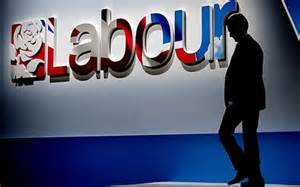
A Left Unionist is a Socialist who accepts the territorial framework of the UK or the British state [3] as the basis for their political, economic and social campaigning, and the geographical extent of their organisations. Left Unionists believe this state framework has united a British working class, usually demonstrated by the existence of the British trade union movement, the TUC and the British Labour Party. However, as it has become harder and harder to see the British Labour Party as representative of anything ‘progressive’, some Socialists point to their own organisations’ British geographical basis instead, and claim this ‘progressive’ British legacy for themselves. There, is also quite a strong tendency amongst many Left Unionists to accept the existing constitutional basis of the UK state, or confine their proposed political reforms to its territorial framework. As a consequence, when it comes to constitutional politics, many Left Unionists tend to tail the political demands of the liberal section of the Unionist ruling class, e.g. over Home Rule/Devolution.
A Left Nationalist is a Socialist who rejects the existing UK state, and supports its break-up on national lines, beginning with the separation of their own particular nation. Left Nationalists also concentrate most of their political, economic and social campaigning to the geographical limits of their chosen nation. They tend to believe that the working class within their particular national section of the UK state is particularly hard done-by, which is why they would benefit from political separation. Following from this, Left Nationalists usually call for the separation of political parties on national lines as an organisational principle, and sometimes this is extended to other campaigning organisations too. On constitutional issues, Left Nationalists tend to tail the strongest section of the Nationalist wannabe ruling class, over the extent of political independence being sought at a particular time, e.g. the current SNP leadership’s ‘Independence-Lite’ proposals.
Clearly, taking a critical attitude towards both Left Unionism and Left Nationalism implies a different stance. The stance adopted in this review is that of Socialist Republicanism and ‘Internationalism from Below’. This means supporting the break-up of the UK state and, in particular, abolishing the ruling class’s Crown Powers, as well as the US/British imperial alliance. However, it also means replacing the existing top-down forms of bureaucratic association promoted by British Labour and Socialist organisations and the separatism of Nationalist organisations by seeking new forms of democratic association between workers and Socialists in England, Scotland, Wales and Ireland, on an ‘Internationalism from Below’ basis. On constitutional issues, Socialist Republicanism means developing an independent class approach, advocating, for example, a Workers’ or Socialist Republic in a revolutionary situation, or a Democratic, Secular and Social Republic as an immediate demand in a non-revolutionary situation.
Some of the new (for the SWP) Left Nationalist elements, which appear in Keir’s pamphlet, have already been present for some time in the SSP and in Solidarity and, in particular, in the International Socialist Movement (which developed out of splits in the CWI in Scotland) and its various successors [4]. However, as other organisations, such as the Alliance for Workers Liberty (AWL) and the CPGB-Weekly Worker [5], with whom the SWP recently shared a British orientation, have pointed out, the SWP has been unable to point to any principled reasons for its political U-turn.
From the Left Nationalist camp, Donald Anderson of the Scottish Republican Socialist Movement has welcomed the SWP’s latest move, but has noticed that Keir’s pamphlet still carries some British Unionist baggage [6]. Donald has helpfully offered to give Keir [7] the lesson in the Scottish history he needs to get over this. This basically means applying the principle:- Scotland = good, Britain/England = bad!
Donald is particularly outraged at Keir’s suggestion that the Scots historically played a role in the slave plantations. Keir provides evidence about extensive Scottish slave holding on Jamaica’s sugar plantations. Donald ignores this by focussing on North American tobacco plantations. In the latter case, Donald hides behind the fact that Scots were mostly involved in the tobacco trade, rather than as owners or managers on the slave worked plantations. However, these merchants could not have acted in these roles without the existence of extensive chattel slavery on the tobacco plantations [8].
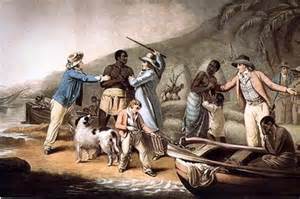
Furthermore, Tom Devine has provided new evidence about the key role that profits from the slave trade played in Scotland’s capitalist take-off [9]. Now, Nationalists can choose to ignore or denigrate Devine, because he is a liberal Scottish-British Unionist who only wants ‘Devolution-Max’. He may even be using his new research to suggest – “Look at what would happen if we Scots are given too much freedom. Let us hold on to that benevolent, paternalistic UK state to protect us from ourselves!” Nevertheless, his historical evidence about Scottish participation in slavery is persuasive.
The role of Scottish businessmen, army and naval officers, regiments, and missionaries, in the various nefarious activities of British Empire building, is just too great to be dismissed. Nor can this role be offset by the undoubted role of other Scots in challenging slavery and colonial rule. Of course, the same could be said about the equivalent people from England. And, even though Ireland has produced far more examples of people actively resisting imperial control (more so in Ireland than elsewhere in the British Empire), there were also plenty of Irishmen involved in extending and maintaining the British Empire too, particularly as colonists, soldiers and missionaries (both Protestant and Catholic).
However, there is an answer to those British Unionists, who like to highlight the role of Scots and others in the British Empire; and when they suggest that Scots might have been as ‘bad’, or even ‘worse’ than the English. It was only through the creation of the British Empire, that Scots, Welsh, Irish, and indeed English people could have been involved in slavery (and other forms of enforced labour), ethnic cleansing, and land and resource seizure on such a massive scale. It is the British half of whatever hybrid identity somebody holds, e.g. Scottish-British, that best accounts for the large number of people who ended up in such occupations as slave owner, slave overseer and colonial soldier. ‘Britishness’ is very much a product of the Empire and Union, and has been the identity promoted to uphold both.
We can also agree with Donald, that many of those Highlanders and other Scots who took on some of these unsavoury roles faced limited choices, given the hardships and repression, and particularly the Clearances, they faced at home. But, this also applies not only to many Irish, who suffered land seizure, rack-renting, evictions and many other forms of oppression, but also to many of the ‘lower orders’ from England too. They were thrown off their land during the Enclosures, or transported to the colonies for breaking draconian property laws.
c) The problem of conflating nation with class
The problem with the largely Left Unionist inspired evidence that Keir provides to show the ‘badness’ of Scotland, “even before the act of Union”, is highlighted by the title of his chapter, where this information is provided – Is Scotland oppressed? Quite clearly, once the reader has taken in the contents of this chapter s/he is meant to come to a definite conclusion – ‘No, Scotland is not oppressed’, which, of course, sets Scottish Nationalists a-birling!
Having dismissed Scotland as an oppressed nation, though, Keir fails to find any other underlying principle to justify the SWP’s newfound support for Scottish independence. Instead, it is all down to ‘tactics, tactics, tactics’!
The concept of oppression [10] can cover a number of things. It can be used in the political sense of meaning the denial, or the unequal application, of democratic rights. It can also mean the unequal territorial effects of economic development, or lack of such development in some cases. Kier provides examples of both uses of the meaning of oppression in this chapter.
The problem lies, not so much with Keir’s use of ‘oppressed’, but in his linking it with Scotland – a nation – a particular territory encompassing all the people living here.
Keir makes use of the orthodox Leninist theory, which makes the distinction between “an oppressor nation” and an “oppressed nation”. However, unless a clear class perspective is maintained, this formulation can soon lead you into Nationalist modes of thought. Oppression under capitalism is linked with class, even if it can also be mediated through people’s nationalities, ethnicities [11] and gender.

No nation or country ever oppresses another nation or country. It is real people, not territorial abstractions, who bring about oppression. Thus, in those cases, where one particular state has had direct (e.g. colonial) or indirect (protectorate) control over another, this has involved the ruling class of the dominating state, exercising this control, either through its own imported officials and their local state machinery, or through the use of preferred indigenous leaders who constitute a local, albeit subordinate privileged class.
Nowadays, global corporate capital prefers an updated version of the old ‘protectorate’ form – permitting formal political independence and backing favoured local elites. Direct or indirect military intervention is only mounted as required. This relationship is sometimes called neo-colonialism.
Keir soon ditches that vitally important distinction between territory/state and class, when he argues that where “there is genuine national oppression, both workers and bosses will benefit from independence, even if they are still in conflict over other issues.” This formulation can easily slide into the possibility of workers and bosses joining forces to fight for national independence (presumably by coming to a ‘gentleman’s agreement’ to differ “over {those} other issues” in the meantime) – much in the way the leaders of the SNP’s official ‘Yes’ campaign would like us to do [12]!
Having come to the conclusion that Scotland, the nation, is not oppressed, then Keir then gives us an overall historical assessment of Scotland’s socio-economic and political trajectory. Scotland has “moved from being a co-partner in the British empire to being an… increasingly peripheral part of the United Kingdom.”
This is how Keir explains why it is that some Scottish capitalists have started to give their support to Scottish independence. This is something they would have very much opposed in the past. And, the ‘New SNP’, represented by the current party leadership, has given a political voice to these people’s interests. Tailing their politics is, therefore, not a good starting point for Socialists who advocate genuine self-determination for Scotland. We can also see why those British Left Unionists are grinding their teeth, now that the SWP has turned to giving its support to Scottish independence!
It is only towards the end of the pamphlet that Keir brings in the notion of Scotland: a nation divided by class. Without any further explanation, though, this new emphasis tends to argue against Keir’s earlier points about Scotland not being an oppressed nation. However, when you look at this chapter, you can see that the class-divided nature of Keir’s Scottish nation is not connected to the unionist and imperialist form of the UK state. Instead, Keir concentrates on the economic dimensions of the Scottish nation and ignores the political dimensions.
However, capitalism is a combination of both the economic and the political. The extraction of surplus value [13] is politically dependent on there being an oppressive state, as well as there being an economy where market conditions prevail. This combination is the way that the wage slavery at the heart of capitalism is maintained.
There are occasions when the state suppresses some aspects of the market because the latter can be destructive in its operation, sometimes even towards powerful capitalist interests. There have been times when some states have resorted to extensive state capitalist measures, either because of the pressures they felt from other more powerful states; or the pressures they felt from the ‘lower orders’, particularly the working class. Social Democratic and Labour parties and the Democrat Party in the USA have, in the past, been more willing to take such state measures than the Conservative or Republican Party.
Nevertheless, there are clear limits to how far the state can replace the market within a capitalist society, because of the effect on capital’s profitability. Profits provide the fuel for further capitalist expansion. This was highlighted by the capitalists’ neo-liberal revolt against the profit crisis of the 1970’s, after three decades of the encroaching welfare state.
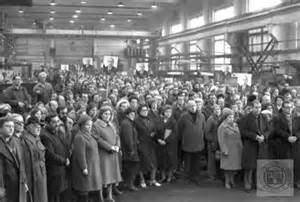
And, whether you think the old USSR was some form of state socialism or state capitalism, it was unable to produce an adequate economic surplus, because of the declining productivity rates associated with a command economy. Workers felt alienated from this system – “They pretend to pay us; we pretend to work!”
The decisions taken in a statified economy are only ever as ‘rational’ as the interests of the class or bureaucracy running it. Neither capitalist nor one-Party rule can ever express the interests or the ‘moral economy’ of the working class. These are based on meeting needs, not profits, nor bureaucratically set targets. This is important, when so many on the Left today argue that an increased role for the state is the answer to the current crisis brought about by neo-liberalism [14].
Neo-liberalism gained much of its strength as a result of the economic crisis brought about through the failure of Keynesian state interventionism in the ‘West’ in the late 1970’s. Neo-liberalism got a further dramatic fillip, after 1989, due to the failures of the more thoroughly statified economies in the ‘East’. These led to the collapse of the USSR and its Warsaw Pact subsidiaries.
Today, the biggest beneficiaries of state largesse in the USA, UK and the EU are the very bankers who helped bring about the crisis of neo-liberalism. But then, the state has always acted in the dominant class’s interests, even if, as a result of class struggle, they have felt the need to offer concessions, to maintain their overall control.
However, it is also necessary to go beyond the more abstract features of global capitalism in its current corporate imperialist phase. We need to look more concretely at how its local agents operate in the UK. So, any real understanding of Scotland: a nation divided by class, has to recognise the specific nature of the UK state. This state unites the British ruing class, the better to impose certain laws upon workers and others throughout the UK. However, there are also specific English-British, Scottish-British, Welsh-British and Ulster-British institutions and laws, which help British ruling class to divide and rule us.
This review will examine the nature of this UK state. It will examine the strategy of the SNP leadership, acting on behalf of a wannabe Scottish ruling class. It will then look at the strategy of the British ruling class, which is trying to maintain its imperialist role, in a context where its economic and political weight continues to decline in today’s world. It will conclude, by arguing that, Socialists have to develop our own independent class strategy, rather than adopting tactics, which merely end up with us being part of another class’s political game.
______________
2. WHEREVER BRITANNIA WAIVES THE RULES
THERE YOU’LL FIND BENIGHTED FOOLS
a) The UK is both an imperialist and a class-divided unionist state

The difficulties Keir experiences in dealing with oppression, and his resort to both British Left Unionist and Scottish Left Nationalist arguments, stem from his failure to comprehend the dual imperialist and unionist nature of the UK state. This is something he shares with most Left Unionists and Left Nationalists. Their thinking lies within a nationalist [15] rather than a class framework. This is highlighted by the prominence given to the terms ‘Scotland’ or ‘Britain/England’, rather than the term ‘class’, in their analysis of oppression.
However, it was not Scotland, but the majority of the Scottish ruling class, who made that Unionist deal back in 1707, not with England, but with the English ruling class [16]. They agreed to this so that they could both benefit from the joint exploitation of the British Empire (then dominated by merchant and landed capitalist interests). Following on from the Union, a British ruling class formed itself [17]. British Unionism and British Imperialism are inextricably linked.
The unionist constitutional set-up also provided the space for the interests of specific subordinate Scottish-British (and after the 1801 Union, Anglo-Irish) members’ class interests to be pursued on their home patch. The protection of such interests has been the prime reason for maintaining and extending the unionist form of the UK state.
This development of the British ruling class (including its subordinate hybrid-British sections) was achieved in the context of the British Empire becoming the global hegemonic power. Other hybrid national identities were formed – first, when Irish-Britishness slowly nudged aside an older Anglo-Irish identity; then later, with the rise of a new Welsh-British identity. As far as the British ruling class was concerned, including its Scottish-British, Irish-British (today Ulster-British) and Welsh-British components, the degree of national self-determination required to meet their class needs had already been recognised under the UK’s unionist constitution [18].
However, the British ruling class not only extended itself geographically, until it covered the whole of Great Britain and Ireland. It has also widened itself on a class basis, to incorporate the new rising industrial capitalist class. The key political struggles conducted by this rising class took place between the 1820’s and 1849. In the process, the economic policies of the Liberal advocates of ‘free trade’ displaced the Tory protectionist policies supported by the earlier dominant landed and mercantile capitalist class. The old mercantile protectionist Empire was revamped on ‘free trade’ lines to provide more profits for British industry. This new hegemony of the industrial capitalist class was highlighted by the abolition of the Corn Laws in 1845.
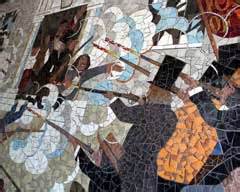
But, another class was beginning to make its influence felt – the growing working class. They had become politically organised in the Chartist Movement. Some Chartists also sought allies amongst the Irish. The Chartist challenge had sometimes reached insurrectionary proportions, as with the Newport Uprising in Wales in 1839. It was not until the defeat of the Chartists’ last challenge in 1849 that the political position of the new industrial capitalist class was finally secured.
It was this challenge from below, which led to the overwhelming majority of the industrial capitalist class making its peace with their old landed and mercantile capitalist class adversaries. They agreed to conduct their political debates in a gentlemanly fashion as Liberals and Conservatives in Westminster’s House of Commons; whilst maintaining, and where necessary upgrading, the existing UK state machinery for dealing with ‘lower order’ challenges, especially those in Ireland. They feared the consequences of class division at the top, in the face of various ‘lower orders’ challenges from below.
Liberal members of the industrial capitalist class might once have entertained thoughts about moving beyond the old Tories’ ‘out-dated’ British unionist state. This would have meant the creation of a unitary British state, ending previous subordinate national distinctions, such as Scotland and Ireland [19] Such an ideal Radical-Liberal state would have had a secular republican constitution. France provided an earlier model. However, such idealistic thoughts were soon abandoned [20].
Instead, the new Liberals accepted the essence of the inherited conservative unionist constitution. The Crown Powers and the established and state-backed religions were retained to help discipline the ‘lower orders’. The House of Lords was still resented, but even this feeling became diluted to opposing some of its powers, as new life lordships allowed the larger industrial capitalists to join its ranks. So there was very little motivation for any of the older or newer Scottish-British ruling class members (or those from other hybrid-British identities) to ever consider making a break with the UK state. They were doing too well out of both the Union and the Empire.
However, by the end of the nineteenth century, the beginnings of a new political split began to emerge within this British ruling class. With the extension of the franchise, a new class of smaller businessmen and professionals emerged. They also wanted their place within the UK and British Empire. They too backed the Liberal Party, sometimes its Radical wing. Coming as many did from specific Irish, Scottish and Welsh backgrounds, where these national cultures still influenced people’s lives and consciousness, they supported Home Rule for their specific nations.
Eventually the Liberal Party leadership, under Gladstone, appreciated that Home Rule for Ireland, Scotland and Wales, offered no fundamental challenge to the UK and British Empire. Irish, Scottish and Welsh Home Rule supporters were keen to retain wider career opportunities within the Union and Empire, as well as seeking protected career opportunities within their particular subordinate nation.
Until the mid-1880’s, the working class had been largely excluded from direct political representation. They were also legally deemed to be the servants of their masters up until 1889. Therefore, they did not necessarily hold any great affection for the ‘Britishness’ promoted by their employers or the UK state. Many held on to other local or national identities, some encouraged by more popular Irish, Scottish and Welsh traditions, kept alive by oral and written means. They also developed their own forms of association, locally, nationally and on a British and all-UK basis to meet their economic, social and political needs.
Liberal Home Rulers were prepared to make Populist appeals to some amongst these ‘lower orders’, in order to gain wider electoral support, as the franchise was extended. They hoped to draw support away from more radical alternatives. Under Liberal versions of Home Rule, though, everybody was still meant to be a subject of the British Crown.
Pitted against the Liberal Home Rulers were the Conservative and Liberal Unionist anti-Home Rulers. They mainly came from the longer established and bigger landowners or businessmen with all-UK and British Empire interests to defend. Some held land or other property in two or more of the nations constituting the UK, or even further afield, in the British colonies.
These Unionists saw no need for Home Rule. Indeed they feared it might conjure up ‘lower order’ demons, especially in Ireland. Their preferred method of dealing with such challenges was resort to repression, jingoism, racism and sectarianism [21], and to make use of cross-class organisations like the Orange Order. Hybrid-British identities were catered for by administrative devolutionary measures, particularly for Ireland, and by promoting Scottish, Irish, Welsh (and various English regional) regimental identities in the British Army.
Home Rulers looked for liberal constitutional reform, whilst Unionists defended the constitutional status quo. Both sides supported the British Empire “upon which the sun never sets”, even when they held differences over the policies they wanted to promote there.

It was only after the First World War, when the British Empire went into serious decline, that key cultural figures in Scotland, backed by some small businessmen and professionals, seriously began to think about Scottish independence. As Keir states, this was because Scotland was “becoming an internally divided and increasingly peripheral part of the UK.”
And, it is only much more recently, with British imperialism continuing its long term decline, that important sections of big business, or Scottish corporate capital, have also begun to consider giving support to their own version of Scottish independence – the one now promoted by the SNP leadership.
However, if we were to equate the rise of the demand for Scottish independence with the changing class interests of Scottish capitalists, then it would be very hard to make a Socialist case for Scottish independence [22]. And, this is one reason why Keir’s arguments appear so contradictory at times.
b) The UK state unites the national sections of the British ruling class and helps them promote both imperialism and generalised class oppression
We have to go back once again, and look at that term ‘Scotland’, which Keir and many others invoke. It has already been shown that, when separated from class, it creates serious problems if equated with a territorial nation with no real recognition of the class divisions involved. Once you begin to see the UK and British Empire from the point of view of the exploited and oppressed classes, though, a very different picture emerges.
The link between the imperialist and unionist form of the UK state, and the creation of hybrid identity membership of the British ruling class has already been shown.
The UK state form, though, has also provided the British ruling class with powerful means to enforce class oppression, both generally throughout the UK and the British Empire, and specifically on a national basis within Ireland, Scotland, Wales and England.
The rise of British imperialism locked the UK into very definite patterns of socio-economic development. These cannot be equated with general progress that benefitted all classes, constituent nations or regions. That is very much a Whig view of history, only thinly disguised by those on the Left who extend this to a historic ‘British road to progress’, then hopefully to a ‘British road to socialism’.
The very fact that UK economic development was spurred on by British imperial expansion, led to the mass deaths of many tribal peoples, and to the expansion of the brutal slave plantations, throughout the Empire. However, another other side of this was also the high death rates amongst those sent overseas as indentured labour or convicts [23], those attempting to escape destitution, and those in the merchant and royal navies, all drawn overwhelmingly from the ‘lower orders’ within the UK.
The numbers of British soldiers killed in colonial wars were proportionately much lower than those of the tribal adversaries or Asian state armies they fought against. However, eventually growing imperialist competition led to more deadly wars between the major powers, such as those against Napoleon, and the First and Second World Wars. These killed hundreds of thousands (Napoleonic Wars) then later millions (the two world wars), again largely from the ‘lower orders’, and increasingly from the working class [24]. This was another consequence of the British imperial path of development, which the unionist form of the UK state has been designed to promote.
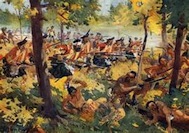
Furthermore, specific areas of the UK have been locked, for long periods of time, into particular patterns of economic development. Examples of this can be found in those areas that have acted as recruitment reserves for British armed forces, e.g. the Highlands and Islands of Scotland. Soldiers from this area experienced way-above-average UK death rates in battle, particularly during the First World War. In the nineteenth century, rural Ireland contributed a disproportionately large percentage of soldiers to the British Army.
The British military recruited its manpower most heavily from areas that were deprived of the possibility of alternative economic development by rampant landlord interests [25]. Staunch British Unionists had veto powers in their House of Lords over any laws that challenged their reactionary economic stranglehold over these areas.
The UK state’s attempts to suppress the Gaelic (both Irish and Scottish) and Welsh languages formed part of an offensive to undermine these peoples and cultures. They were seen to be an impediment to capitalist ‘progress’. Many previously non-English speakers were forced to seek jobs in the new industrial regions of the UK, hence the insistence on the English language being the only one spoken in Highland and Islands, Irish and Welsh schools.
When these migrants were drawn into the industrial labour force, their children, now English speakers, faced the same forms of school discipline that their other schoolmates endured. This was designed to make those who were already members of working class families know their place in society, by denigrating their specific urban or regional accents [26].
However, when the children of monoglot Gaelic or Welsh families had gone to schools in their original home areas, only English language use had been permitted. Such children were obviously in a considerably worse position than other children, in the industrial regions of the UK, who, although they had strong regional or urban dialects or accents, still spoke English. Thus, Gaelic and Welsh speaking children experienced considerably greater physical punishment and ritual denigration, at least up until they learned how to speak English.
Although Ireland was possibly a majority Gaelic-speaking country up until the 1845-9 Famine, and Wales a majority Welsh-speaking country as late as 1900, the class domination, particularly of English speaking landlords, and later industrialists (in the north east of Ulster and south of Wales), ensured there was a marked national aspect to this cultural oppression. ‘The Language Question’ [27] has contributed to the national democratic movements in both these countries.
In Scotland, the suppression of the language was confined to a relatively small Gaelic-speaking minority, who lived in the Highlands and Islands. As Keir points out, “It was fellow Scots (Highland ex-clan chiefs now turned capitalist landlords and their allies in Scottish police and military regiments) who forced the mass evictions from the Highlands on a grand scale from 1815.”
What Keir fails to point out, though, was that they did this as Scottish-British class exploiters and oppressors, using the wider machinery of the UK state to assist them. As, in the case of Scottish involvement in plantation slavery, this would not have been possible, on such a scale, without the existence of this UK state.
Furthermore, there was an opposing tradition, which developed amongst Radicals and Socialists, even before being taken up by later Scottish Nationalists. A widely shared opposition to landlordism in Scotland ensured that, as the land struggles developed from the 1880’s [28], the cultural oppression of Gaelic was seen to be a Scottish national issue. Amongst the ‘lower orders’ and some Liberal versions of Home Rule, this was linked to the issue of Scottish self-determination. The Gaelic language issue also became linked later to support for Scottish Devolution, Independence or for a Scottish Republic.
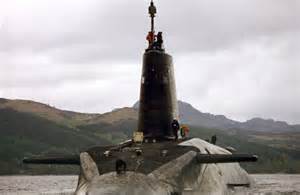
A more recent case provides us with another example of how the British ruling class’s unionist constitution and continued support for British imperialism have locked some areas into particular backward forms of economic development. All British Unionist parties are committed to the continued stationing of Trident at Faslane. This has held up the finance for other potentially more beneficial forms of economic development in Scotland, as Alistair Darling’s and Chris Huhne’s scrapping of two carbon-storage schemes has revealed [29].
Consecutive British governments have argued that only Scotland has the required deep-water facilities for nuclear submarines, whether it was the US base at Holy Loch in the past, or Faslane today. So, it is perhaps not surprising that the removal of such bases has long been linked to the demand for the exercise of greater Scottish self-determination. This has become even clearer with the demise of any effective all-Britain opposition to nuclear weapons within the British Labour Party.
Such a focus on Scotland can, of course, also produce a Scottish Nationalist response. Some Right wing SNP ‘nimbyists’ are quite happy for Trident to be removed from Scotland, whilst Scotland continues to be part of NATO’s nuclear alliance. Scottish internationalists, however, see Trident’s removal as but the first step to mounting a wider campaign to get rid of nuclear weapons altogether [30].
Such ‘Internationalism from Below’ presents much greater possibilities than waiting for the ‘actually existing’ official Labour Movement to begin any meaningful campaign against nuclear weapons. Indeed, more vocal opposition to Trident has come from some British senior military figures [31], than from Ed Miliband, Alistair Darling, Jim Murphy, Johann Lamont and their ilk.
The degree to which support for the UK has trapped official British Labour thinking within a completely reactionary mind-set has been highlighted by the arguments they use to keep Scotland locked into British imperialist forms of economic ‘development’.
Scottish Labour and trade union officials have been vehement in their support for the continuation and upgrading of the Trident base at Faslane, under the cover of ‘protecting jobs’. However, the number of jobs involved is relatively small – far fewer than the many thousands who have lost their jobs under Labour governments and local councils, without them making much fuss.
It is fairly obvious that the cost of investment in new industries, the creation of new jobs (sometimes using the existing skills of those currently employed), or proper retraining, would only amount to a small proportion of the massive savings that would result from scrapping Trident.
You are left wondering what the attitude of these British Unionist Labour politicians and trade union leaders would have been to the proposals in the last century to abolish the British slave trade – “Oh no, just think of the loss of all those slaving ship mariners’ jobs”! And, what would their attitude have been if they had represented gas fitters in the Nazis’ German Labour Front!
c) The UK state’s unionist form has helped the national sections of the British ruling class to promote national division between and within the ‘lower orders’ of Ireland, Scotland, Wales and England
The unionist form of the British state, with its associated constitutionally privileged position for conservative and reactionary class forces, has been reinforced by the Crown Powers, the monarchy, the House of Lords and the established Church of England [32] (with its one-time Irish and Welsh Anglican subordinates). These powers have been wielded, at different times, to attack workers and others across the whole of the UK.

However, the UK state constitutionally recognises England, Scotland, Wales and Northern Ireland (and in the past the whole of Ireland). This has allowed the English-British [33], Scottish-British, Welsh-British and Ulster (in the past, Irish)-British sections of the British ruling class to draw support from their class allies in the other national constituent areas of the UK state, whenever their interests appear to be threatened locally.
They have thus been able to make specific national uses of the anti-democratic features of the UK constitution. Repressive powers have sometimes been targeted upon the ‘lower orders’ within a particular constituent nation. This has contributed to ensuring that the ‘National Question’ has remained a feature of UK politics.
Non-Irish British regiments were stationed regularly in Ireland, up until 1922. They buttressed first the Anglo-Irish, then later the wider local Irish-British forces of ‘law and order’. In 1969, the beleaguered Ulster Unionist government, which had ruled over its Orange sectarian statelet since 1922, was helped out by British troops provided by the Labour government, when it faced the challenge of the Civil Rights Movement to its rule. They have remained there to this day.
In 1911, the London Metropolitan Police were used in Wales against strikers, when there were doubts about local Welsh police strength and possible loyalties. In 1919, English troops were brought up to Glasgow to deal with the 40 hours Strike, when there were also doubts about the loyalty of the local regiments.
The British large landowner class has been particularly well served by the UK’s unionist constitution, and especially by the House of Lords. The issue of land reform has long been a major issue in Ireland, Scotland and Wales. After the extension of the franchise in the 1880’s, a much more significant land redistribution could have been implemented in each of these countries by means of majority approved legislation in the House of Commons, or in Home Rule parliaments, if there had been no House of Lords, with its specific English-British, Scottish-British and Irish-British representation. Irish-British, Scottish-British and Anglo-Welsh [34] landlords were able to get their class allies in the House of Lords to help them block both significant land reform and Home Rule [35].
The unionist form of the state [36] has mainly benefitted the industrial capitalist class on an all-UK basis. It unites them as a single force for key capitalist purposes – ensuring that the UK acts as a geographically bounded market and labour pool, where commodities and labour are meant to flow freely. The further up the class hierarchy you go, the easier it has been ‘to get on your bike’ (or, according to your position – feet, carriage, train, boat, car or plane), to seek your fortunes anywhere within the UK.
However, some sections of the industrial capitalist class have sometimes found it profitable to interfere with this labour mobility to divide the ‘lower orders’. That word ‘United’ in the UK should draw our attention to the constitutionally recognised areas that today make up the UK – England, Scotland, Wales and Northern Ireland. British Unionists have been able to make use of this feature of the UK constitution to promote divide-and-rule policies.
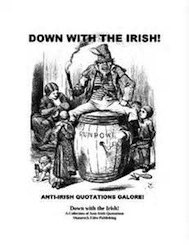
The discrimination against migrant Irish labour in the north east of Ulster, Scotland and England, during the nineteenth century, is a well-known case. Ethnic protectionist and supremacist organisations were formed amongst particular groups of skilled workers (e.g. shipyard workers in Belfast and Glasgow), and amongst other less skilled groups facing more immediate job competition, e.g. miners and dockers. This was so they could exclude Irish workers from employment. Furthermore, when trade depressions occurred, even those Irish who had found a foothold at the bottom of the labour market ladder, could find themselves and their communities violently attacked. Sections amongst the longer-established local workforces sometimes sought to evict them from jobs and homes in their desperate search for jobs.
Some employers clearly appreciated the benefits of backing or creating over-arching cross-class organisations, such as the Orange Order, to make use of these divisions. Three cities stand out in particular – Belfast, Glasgow and Liverpool. In all three, the massive inflow of impoverished Irish Catholics was one factor, whereas in the second two there was the additional factor of impoverished migrant Highlanders. The Irish, in particular, were subjected to active discrimination, leading to super-exploitation, high degrees of casual labour (precarious labour today), appalling housing conditions, minimal social provision [37], and sometime violent assaults on their persons or communities.
It is significant that these three cities are located on the major interfaces of particular ethnic labour contact within the UK: Belfast – the Irish-British (later Ulster British [38]) and the Irish-Irish (largely Catholic); Glasgow – the Lowland Scots and Irish-British (later Ulster-British) and the Irish-Irish and Highland Scots [39]; and Liverpool – the English, Irish-British (later Ulster-British) and the Irish-Irish and Highland Scots [40].
Now, the divisions that were encouraged by Unionists and Loyalists were not national, but ethnic. The concept of a ‘nation’ encompasses all those who live and work in a particular nation-state, or the constituent nations of a multi-nation state like the UK. Ethnic identity, however, is a narrower cultural term. People from different ethnic backgrounds can be integrated, or even assimilated, [41] into a wider nation, provided equal democratic rights prevail. However, a key of feature reactionary organisations such as the Orange Order has been their attempts to prevent such integration or assimilation, by excluding particular ethnic (Irish-Irish) or ethno-religious (e.g. Irish Catholics) from their own version/s of the ‘nation’.
Thus, the Orange Order, and other Unionist and Loyalist organisations, have been able to make their own use of the UK’s constitutional set-up to push their own perceived ‘national’ divisions, e.g. between the loyal English-British/England, Scottish-British/Scotland and Ulster-British/Ulster, on the one hand, and the disloyal Irish-Irish/Ireland (occasionally extended to wider ‘Gaeldom’) on the other.
One particularly reactionary aspect of this has been these organisations’ attempts to maintain ‘Britishness’ as an ethno-religious identity. The British ruling class majority, supported by the Orange Order, has insisted upon the maintenance of the Church of England as an established religion with the monarch at its head, and the continued presence of Anglican bishops in the House of Lords. The Orange Order and Loyalists have argued that this should also involve the extension of economic privileges to British Protestants.
Orangeism and Loyalism have also been encouraged higher up the Unionist hierarchies (particularly, but not exclusively by Conservative and Liberal Unionists), when they thought that this could bring them some political advantage. Furthermore, as the demand for Scottish self-determination increases, Scots who do not accept a Scottish-British identity have been added to the Scottish Loyalists’ and British neo-Fascists’ hate-lists.
The reactionary use of Unionism and Loyalism within specific nations of the UK has also often been linked to these areas being locked into particular economic roles within the Union and Empire. This has produced visible social effects. In the nineteenth century, the Scottish Unionist capitalists’ ability to divide the workforce in Glasgow, the ‘Second City of the Empire’, and impose widespread deprivation (or squalor as it was then known), contributed to a generational decline in the bodily weight of those Glaswegians from migrant worker families. Here, the slum landlords were able to get away with some of the worst housing provision in Europe. To this day, Irish Nationalist areas in West Belfast class continue to have the worst socio-economic conditions in the UK.
The British ruling class’s ability to pursue ‘national’ divide-and-rule policies has also undermined ‘lower orders’ attempts to unite across these ethnic boundaries more effectively. Engels highlighted the attempts by employers to use Irish migrant workers to undercut the wages and conditions of English workers in in Manchester in the 1840’s. Nevertheless, many Irish played a key part in united working class organisations in the UK. These people included Feargus O’Connor and Bronterre O’Brien, prominent in the Chartists. So, it is not surprising that sections of the British Unionist ruling class have sometimes resorted to anti-Irish racism, and have encouraged particular Loyalist protectionist and supremacist organisations [42].
The recent ‘Troubles’ in Northern Ireland led to the introduction of the Prevention of Terrorism Acts (PTA) beginning with Labour’s 1974 act. As a consequence, the UK government helped to maintain a highly repressive legal system in Northern Ireland [43]. Many laws protecting civil rights over here were either never put in place or were suspended. British Unionist governments pursued shoot-to-kill policies and resorted to clandestine use of Loyalist death squads. These were sanctioned under the UK’s Crown Powers. The PTA also allowed UK state security agents to harass those from Irish backgrounds living ‘on the mainland’. Juryless ‘Diplock Courts’ still operate in Northern Ireland even after the Good Friday Agreement.

But, it has not just been in Ireland, Northern Ireland, or specific cities in the UK, that the unionist form of the UK constitution has provided succour for conservative and reactionary classes and political forces. Thatcher’s Tory government came to the aid of well-heeled Scottish Tory ratepayers, a small electoral minority here, when she introduced the poll tax one year earlier in Scotland in 1989. This provides a blatant example of the use of a Unionist Right wing majority in the House of Commons to impose its will on a subordinate class in a particular constituent nation of the UK – in this case, the working class of Scotland – despite the lack of any democratic mandate here.
And, Tony Blair’s New Labour government created the first precedent for the use of non-English British Westminster support – Scottish Labour MPs – to impose its will upon England, or to be more precise, upon the English working class who would be worst affected. Scottish Labour MPs were called upon to railroad through the bill, which introduced foundation hospitals to England (and Wales) in 2002. This was done to accelerate the privatisation of the NHS begun under the Tories. This was as blatant an example as the Tories’ poll tax, given that the Labour controlled Holyrood government in Scotland, at the time, opposed foundation hospitals here.
Scottish Nationalists and British Unionists often ignore or downplay class. When they see national oppression, they attribute this to either England/English or to Scotland/Scottish. However, once you appreciate the dual imperialist and unionist form of the UK state, you can avoid that hoary old Scottish Nationalist versus British Unionist debate.
Thus, the UK constitution allows the British ruling class and its hybrid-national components to be united in pursuing their imperial interests overseas, and in imposing class legislation and the use the Crown Powers on an all-UK basis. It is the latter that has led to generalised class oppression in the UK. However, the UK constitution has also been able to unite particular hybrid sections of the British ruling class, so they can advance or protect their own local class interests by drawing upon the support of the other hybrid British sections of their class. This has led to specific national oppression on a class basis.
What becomes clear is that the UK is neither a unitary state, which has led to generalised all-islands, all-UK, or all-British socio-economic ‘progress’, nor is it a specific instrument for imposing English national rule. The British ruling class has been able to use both dimensions of the UK constitution to try to maintain its imperial position in the world, and to aid its hybrid-British components by protecting their particular national interests within the UK set-up.
Once this is appreciated, the way begins to open up for a Socialist Republican, ‘Internationalism from Below’ view, based upon advancing the class interests of the exploited and oppressed. Such a view can help to unite the working class of Scotland, England, Wales and Ireland, because we have faced examples of both generalised exploitation and oppression, and of specific national oppression under the existing UK set-up.
d) ‘Relative degrees of oppression’ and divisive or principled responses
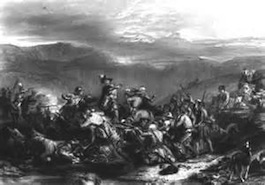
The degrees of national oppression experienced have differed markedly, within the different constituent nations of the UK, at different times. Furthermore, the most advanced national focus of resistance to the ruling class at particular historical periods, has been located in different nations – the English Levellers in the late 1640’s, the radical wing of the Scottish Covenanters from the 1660-1707, the United Irishmen between 1792–8, the Welsh Radicals and Chartists between 1829-39, the Irish Republicans, Social Republicans and Socialist Republicans between 1879 and 1895, 1913-22 and 1969-98.
Today, Scotland has moved to the forefront, albeit still representing a relatively low level political challenge to the British ruling class and its UK constitutional set-up. However, in the context of today’s multi-facetted crisis of capitalism, that challenge could yet become more significant.
The Left has sometimes responded with a number of false arguments, when faced with oppression that does not take on an immediate class form. Thus, any support for resistance to oppression, targeted at ethnic or ethno-religious minorities, women, gays and lesbians, youth or the disabled, has sometimes been dismissed as being divisive – nationalist, sectarian, feminist, etc. – or treated as a secondary or side issue.
Sometimes, the degree of oppression a particular group experiences is questioned – e.g. some people point to women and gay bosses, or to particular minority ethnic groups practicing their own forms of discrimination, etc. They then claim that women, or certain ethnic and ethno-religious groups, do not face the generalised oppression experienced by the working class.
However, the specific forms of oppression – e.g. national, ethnic or sexual – nearly always have a class dimension. Thus, they often manifest themselves in particular forms within the working class. Indeed, they amount to additional forms of oppression, to those they share with the rest of their class. The ruling class and the employers often resort to the opportunities provided by such oppression for their own divide-and-rule purposes. So, Socialists should have a particular interest in opposing all forms of oppression from our own class perspective.
Some cases of oppression are indeed far worse than others. But, if the Left only provides support, when they are claiming to oppose oppression, to those who are ‘really oppressed’ or suffering immediate repression, then this just helps to disunite us. Just as a refusal to support a strike by relatively high-paid skilled workers, because there are much ‘more deserving’ cases amongst the unskilled, would not help the latter, but the employers. Such an attitude does not build class unity or consciousness.
To British Left Unionists, support for the exercise of the right of Scottish self-determination does not appear justified, because Scottish workers are not sufficiently oppressed. This is because many on the Left apply a sliding scale of national oppression. This would only permit them to support the exercise of national self-determination whenever blatant national repression takes place.
This usually means they are seen very much as ‘Johnny-come-latelies’, when it comes to any later ‘Damascus road’ conversion, when repression, or the threat of such repression, does occur. The oppressive situation in the Northern Ireland hardly registered amongst the overwhelming majority of the British Left, until the Civil Rights Movement in the late 1960’s made such negligence untenable. That was because they had neglected earlier lower levels of oppression, including the denial of the democratic right of Irish self-determination under Partition.
Since British Left Unionists have largely ignored lower levels of oppression, they find it hard to win the support of the working class within their nation, when circumstances change. This is because they have usually been arguing that the exercise of national self-determination is not an issue, and those advocating this policy are Nationalists. Not surprisingly, members of the particular national group, whose political demand for self-determination they have previously ignored, also treat them with suspicion.
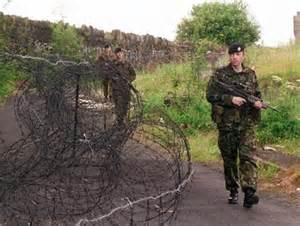
However, this ‘relative degrees of oppression’ argument sometimes figures within Nationalist thinking too. There are quite a number of Irish Republicans (and some Irish Socialists) who do not consider the people of Scotland to be oppressed. This understanding has been reinforced by the unionist nature of the UK. That has allowed the British ruling class to make use of Scottish regiments in Northern Ireland, where they gained a reputation for being particularly brutal. Irish Nationalists have also been subjected to Orange Order and other Loyalist triumphalist marches, where Scottish bands and the Scottish saltire flag figure prominently.
The fact that such repressive and reactionary forces have been mobilised by the UK state and its backers for their own wider British Unionist ends, using Scottish-Britishness to aid them, can easily get lost sight of, when you are at the receiving end of a Scottish soldier’s rifle round, or Scottish Loyalists’ sectarian jeering.
Yet, any resort to the ‘relative degrees of oppression’ argument could also be used to justify not giving support for those Irish resisting British oppression too. Compared to the plight of the Palestinians, at the hands of the Israelis since 1948, the levels of oppression experienced by the Irish at the hands of ‘the Brits’, over the same period, have been considerably lower. And, even in Palestine, there have been active collaborators of the Israeli state, particularly amongst those running the Palestinian Authority.
Socialists, though, should apply a quite different and principled method, when it comes to giving our support to the exploited and oppressed. This means extending solidarity to those who are struggling against whatever manifestation or level of exploitation and oppression they currently face.
______________
3. ROAMIN’ IN THE GLOAMIN’
WITH ‘YES SCOTLAND’ BY MY SIDE
a) Without a strategy, Socialists end up as bit players in the SNP leadership’s game of building up a Scottish wannabe ruling class
It has already been stated that a key weakness of the SWP is that it has no real strategy – only tactics. The failure to appreciate strategy makes it harder for Keir to see the strategy that is being pursued by others. When a political organisation substitutes immediate tactics for developing a longer-term strategy, this inevitably leads to politically tailing somebody else.
Keir equates support for voting ‘Yes’ with actually voting “Yes to independence”. Yet, nowhere does he really consider what type of ‘independence’ is on offer, or what a ‘Yes’ vote in 2014 would actually lead to. To do this, first you need to have to have some understanding of the aims of those in control of the official national ‘Yes’ campaign – the SNP leadership.

The SNP leadership’s long-term strategy is to build up a wannabe Scottish ruling class. They see the opportunity for this arising from the continued decline of British imperialism and the ossification of the UK’s state machine to the point that it is less and less fit-for-purpose. Hence, the SNP leadership can see the possibility of forging more favourable alliances with the British ruling class, global corporate capital, and hopefully with US imperialism and the EU bureaucracy. To do this, they need more enhanced powers than they currently have under the existing Scottish Devolution set-up within the UK state.
Keir only provides us with the tentative beginnings of an understanding of what the SNP leadership is up to. He stops well short of what is required, if we are to develop our own strategy and tactics, and not end up as mere bit-players in the SNP leadership’s game.
Keir recognises that, certain Social Democratic-style economic and social reforms or promises notwithstanding, the SNP is not on the side of the working class. Enhancing our power plays no part in the SNP’s proposed constitutional reforms – far from it! Policies and specific electoral promises (e.g. reregulation of bus services, abolition of council tax, reduced school class sizes, removal of student debt burden to loans companies,) have been abandoned to conciliate major financial backers, and the SNP leadership’s opposition to increasing the taxes on the rich. Other flagship policies, such as opposition to student tuition fees, have been partly funded by major cuts in the less sexy FE sector, once again, to avoid challenging corporate power and high-income earners.
Keir does provide us with an example of the SNP government’s general economic approach. He points out that when the first SNP government was elected at Holyrood, in 2007, John Swinney, Finance Minister, set a “budget, which passed with Tory support, {and} aimed to get rid of business rates for 120,000 enterprises and reduce them for 30,000 more. The public sector on the other hand faced strict financial discipline and 2% ‘efficiency’ savings, year on year.”
But Swinney has gone considerably further than this. Before the 2007 election, Alex Salmond told Swinney to keep shtum over his own support for flat-rate income taxes – in effect, the replacement of a graduated income tax by another even wider form of poll tax. John Swinney and Michael Russell’s openly Right wing policies had not being going down too well. SNP electoral support declined between 1999 and 2003. Nevertheless, after the return of Salmond, and the election of the first (minority) SNP government, in 2007, Swinney made sure that the income tax-raising powers, voted for in the Devolution referendum in 1997, were quietly allowed to lapse. In 2012, one year after the election of the second (majority) SNP government, when Lena Wilson, CEO of publicly owned Scottish Enterprise, supplemented her £200,000 annual salary, by moonlighting for the FTSE-100 Board for 12 days, earning a further £55,000, an SNP government spokesperson welcomed this. The SNP government is sending out strong signals about the way that the prominent business figures would likely be treated in a future SNP-run ‘independent’ Scotland.
Keir also recognises that, in 2007, “the biggest change to Scottish politics came at the local level… {and} destroyed the Labour party’s hegemony.” He does not see the full significance of this for the SNP leadership’s strategy, though. The Labour Party in Scotland is keenly aware of the challenge. The SNP leadership is trying to steal the Labour Party’s traditional clothes – and dress itself up in Labour’s role as the main dispenser of patronage in Scotland.
After having lost control of so many Local Authorities in 2007, and after the unexpected drubbing they received at the hands of the SNP in the 2011 Holyrood election, Labour put up a ferocious defence of its control of Glasgow City Council in the 2012 local elections.
Although the SNP increased its number of councillors in Glasgow [44], Labour did even better [45]. For both Labour and the SNP leaderships, control of patronage has been the key issue in national and local elections. If the SNP were to replace Labour both nationally (currently achieved for the moment) and locally, they would become the primary focus for every aspiring Scottish careerist. This would represent a considerable step in the creation of that wannabe Scottish ruling class the SNP leadership seeks. They would be able to get the backing of those well-paid SNP supporters, who had benefitted from the party’s increased powers of patronage over national and local government managerial posts.
The SNP leadership is very aware that it only attracts minority big business political support, most of which still goes to the Unionist parties. This is why it is so interested in gaining office at Holyrood and at Local Authority level. This provides even better opportunities for patronage, rather than ‘rocking the boat’ too much by encouraging people to take action now in the period of the official ‘Yes’ campaign.
This is also why the first priority of the SNP leaders, in all negotiations with Westminster, whether in its submissions to Westminster’s Calman Commission, or its behind-the-scenes manoeuvring to have a fall-back ‘Devolution-Max’ option in the referendum, has been to get Holyrood control over Scotland’s tax-raising powers.
People like Sir Tom Farmer wanted the SNP government to have a second string to their bow, and include a ‘Devo-Max’ option in the 2014 referendum. If the SNP’s own preferred referendum option were to be rejected, then ‘Devo-Max’ could still contribute to a gradual increase of fiscal powers (e.g. tax-cutting) to the benefit of Scottish bosses. This could strengthen their position, preparing them for a later more extensive ‘managerial buy-out’, at a more opportune moment.

Furthermore, the SNP leadership has been seeking to establish its own international connections, just like every other national or wannabe ruling class. They have never disguised their desire to cut tax for the global corporations, and have fallen over themselves to ensure minimum (zero even) taxes for such anti-trade union employers as Amazon. And, as Keir recognises, both Donald Trump and Rupert Murdoch have been avidly courted in the recent past. And, looking to the future, the Scottish government is wooing the Chinese government for support too. No wonder those Edinburgh zookeepers have been prodding their two Chinese government-gifted pandas to make them mate and to consummate the relationship!
b) After the 2014 referendum – then what?
Salmond and the SNP leadership have not planned beyond the 2014 referendum. If the ‘Yes’ vote is defeated, there will probably be a temporary drop in the SNP’s electoral support. However, UK-wide political and economic developments, leading up to the 2016 Scottish Holyrood election, including the outcome of the 2015 Westminster election, could still contribute to the SNP maintaining its electoral position.
When it comes to the UK’s constitution, the SNP leadership would likely follow the path of Parti Quebecois whose own Quebec independence referendum proposals were defeated in 1995; or of parties like Catalan Convergence and the Basque Nationalist Party, which after many years of running the Spanish state’s devolved parliaments, have all settled, in the meantime, for the further slow trickle-down devolution of powers. This is consistent with their strategy of gradually extending the power of their own local wannabe ruing classes.
Salmond is one of the UK’s most astute politicians. Given his behind-the-scenes attempts to get ‘Devo-Max’ on to the 2014 referendum ballot, we can be pretty sure that he would try to hold British Unionists to account if the ‘Yes’ vote were to be defeated. They are currently ‘promising’ more powers to Holyrood, but only when the SNP’s official ‘Independence’ proposals are seen off.
Salmond appreciates that such a stance could provide the SNP with a good basis for future campaigning, given the obvious insincerity of most British Unionists’ constitutional ‘promises’. There could well be a slide towards even more reactionary politics at Westminster level, even if Miliband’s Labour Party replaced Cameron’s Tories. Blair and New Labour stepped up the Tory neo-liberal offensive. Miliband would pay whatever the bankers demand, and impose whatever austerity measures this requires.

Miliband’s ‘One-Nation’ Labour draws directly from Tory thinking, whilst ‘Blue Labour’ is a not an inconsiderable force within the Party leadership. It draws elements of its thinking from UKIP and the BNP (with a green light originally provided by Gordon Brown’s ‘British jobs for British workers’). ‘One Nation’ Labour is ‘Tory-Lite’ for the middle class; whilst Blue Labour is ‘UKIP-Lite’ for the working class – particularly in its anti-migrant sentiments.
And, if the present economic crisis deepened even further, then the current Labour/Tory ‘No’ coalition could even take on governmental form. There are already six Scottish local councils with such a ruling coalition [46]. Then ‘Devo-Plus’ might just be on the cards. But if the Tories were to form the next government, this would probably mean that they have bowed to the ‘Little Englanderism’ of UKIP. So the prospects of even ‘Devolution-Plus’ would be reduced considerably.
Thus, both possible future Labour and Tory Westminster scenarios could provide the basis for Salmond, or his likely successor, Nicola Sturgeon, to win continued electoral support for the SNP.
However, you can be fairly certain that, if the SNP government were able to win a ‘Yes’ vote on its own terms in 2014, then its current big business backers would be demanding their ‘pound of flesh’. They would promote their perceived spokespersons within the government.
For, historical experience shows one thing quite clearly. Nationalist parties do not remove themselves from the political scene, once they have gained independence. This is the time when they complete their project and move on from creating a wannabe ruling class, to consolidating it as an actual ruling class. Such a ruling class needs its political representatives and, in the circumstances, none is better placed than the very Nationalist party that helped them to rise in the first place. This is why Nationalist parties become more firmly entrenched after independence – just think of Fine Gael/Fianna Fail in Ireland, Indian Congress and the ANC in South Africa (ANC).
This entrenchment occurs because those taking office in any new Nationalist government want their own ‘just rewards’ for all their earlier efforts. They quickly develop a symbiotic relationship with the country’s principal business leaders, so they can benefit (e.g. through business sponsorships, joining company boards, etc.). In return, they provide business leaders with government contracts and patronage.
Even those capitalists, who had earlier supported the pre-existing political set-up, soon switch their support to the new political order. Welcoming such new forces also helps the new Nationalist governments to further consolidate their political position. This can help them in marginalising and, if necessary, crushing any radical forces which may have arisen in the campaign for independence.
We have recently seen one of the consequences of this with the ANC in South Africa – a party of much more radical origins than the SNP. ANC government ministers, some themselves now prominent businessmen, have joined forces with the bosses of the big mining companies. The massacre of 34 striking miners, last August, at the Marikana Platinum, was the result of this process.
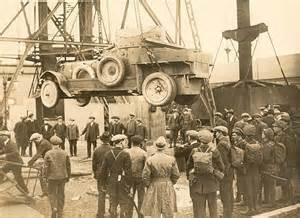
Nor are Nationalists necessarily averse to seeking the backing of their former dominant-state adversaries, if they think their class interests are threatened. The British Crown-supporting Irish Free Staters got help from the UK state to militarily crush the Republican opposition in the Irish Civil War (1922-3).
The Cumann na nGaedheal (today Fine Gael) government then ensured that the tribute demanded from the British Treasury, to pay for the Irish land originally stolen by the old Ascendancy class, was still paid out after ‘Independence’. The Free State government also abolished much of the old British Liberal government pension, sickness, invalidity and unemployment benefits legislation, which had been inherited from the UK [47] – only to replace these with charities run by the Catholic Church!
And Michael Russell has already stated in his Grasping the Thistle that, in his ‘independent’ Scotland, he wants “to slash public spending to East Asian levels to make us lean and competitive” [48]. And the SNP leadership is prepared to accept those British Crown Powers after ‘independence’. You can see why they might need them!
c) The SNP has changed from being a Left/Right Populist alliance to being a mainstream Social Democratic-type party

Keir takes us through a brief history of the development of the SNP in his chapter, The SNP: a real alternative? However, he does not use this to relate the changing political nature of the SNP to the changing class nature of its backers. Examining this transition helps to explain why the current SNP leadership’s official ‘Yes’ campaign is different from their earlier more exclusive Populist-style campaigns (e.g. the 1970’s ‘It’s Scotland’s Oil’), and why this leadership is now prepared to reach out beyond party ranks, in an attempt to win wider support.
The early SNP was a party of small business owners, professionals and some members of the Scottish intelligentsia. From the 1950’s, this SNP went on to a make some inroads amongst workers, particularly in those New Towns, where the Labour Party was slower to extend its traditional urban support. But, in those days, there was virtually no support for the SNP from Scottish big business, nor from the officials or the activists of the trade union movement.
The old SNP was a Left/Right Populist alliance. Such politics dominated much of the SNP’s earlier existence. It appeared to be different things in different places. It was Right wing in many rural areas and in some middle class city suburbs, but Left wing in the major urban and (often former) industrial areas. To outsiders this sometimes made it appear to be Tartan Tory, at other times Tartan Social Democrat. This contradiction mattered less, when the SNP presence at Westminster was only episodic, and when there was no Scottish parliament.
However, from the 1990’s, accelerating through the 2000’s, there has been a shift in the class base of the party, and especially in those whom the leadership seek to woo. Over the years, the SNP has begun to attract wider and significant big business backing, including Sir George Mathewson, former CEO of the Royal Bank of Scotland, Sir Brian Souter, CEO of Stagecoach (a major global transport corporation), and Jim McColl CBE, Chair of Clyde Blowers. Less committed to the SNP, but still drawn within its political orbit, are Sir Tom Farmer of Kwikfit and Craig Beveridge, former CEO of Scottish Enterprise.
As a consequence, a new Social Democratic-style politics has come to dominate the SNP leadership at national level [49]. Keir quotes SNP Leader, Alex Salmond, who has stated that “independence is our idea, our politics is social democratic”. At first glance, it perhaps seems surprising that, whilst seeking support from big business, the SNP leadership should want to promote Social Democratic-style politics. But, as Keir states, “the SNP is not a social democratic party in the classic ‘labourist’ sense”, i.e. based on trade union affiliations.
Social Democracy’s further Right drift internationally has been reinforced by wider socio-economic developments. Social Democracy has sought to loosen its dependence on traditional Labour organisations, and presented itself as a better management team for the running of capitalism than its conservative political opponents. In the process, Social Democracy has extended its appeal to senior managerial figures, particularly those working for the state, but also to some important business leaders.
The essence of mainstream Social Democracy is offering people the prospect of economic and social reforms based on maintaining a vibrant capitalist economy [50]. Therefore, a thoroughgoing commitment to such reforms can only be pursued when the capitalist economy is booming. However, when boom turns to recession, the first job of Social Democracy is to bail out capitalism, and to take whatever steps are needed to restore profitability.
Inevitably, this means clawing back many of those reforms previously granted. Since workers’ labour is the primary source of capitalist profits, this always leads to an attack on jobs, working conditions and pensions, i.e. austerity. Meanwhile, in contrast, the bosses have to receive generous personal ‘incentives’ to invest in order to get capitalism rolling again.
Quite clearly, we are currently confronting the austerity phase of Social Democracy, or as Keir puts it – they are helping to make “huge public spending cuts {leading to} the erosion of social welfare systems {which} are tearing apart the fabric of society”. All this is done to appease the controllers of capitalism – the “unelected bankers and bosses.” Keir locates Scotland within “the crisis {which} is at its deepest in Europe.”
Wherever the current crisis is most severe in Europe, mainstream Social Democratic parties are in open coalition with Conservatives, e.g. in Greece, Italy and Ireland. Here they bow before the punitive demands of the Troika (EU, ECB and IMF). Elsewhere, where the crisis is not quite so severe, e.g. in France, Social Democratic governments hope to temporarily divert some of the state tribute being paid out to the banks into economic investment and social spending, in an attempt to kick-start the ailing economy.
Yet, all mainstream Social Democrats remain as committed as the Conservatives, when it comes to fully paying up the money demanded by the banksters. Therefore, as far as French workers are concerned, there has been no obvious reversal in their declining living standards, as a result of the recession, despite Francois Hollande’s attempts at stimulating the economy [51].
The UK has now followed France in losing its AAA credit rating. So, with the UK’s economy facing a possible further dip into recession, the SNP government is finding its economic room for manoeuvre narrowed further, especially since it relies on declining Westminster block grants, provided under the Barnett Formula.
The SNP has now gained a permanent foothold in Westminster and it has risen to being the first-placed party at Holyrood. This has reinforced the move towards the adoption nationally of Social Democratic-style politics. The SNP leadership wants to insert itself into Scotland’s dominant Left Centre (but currently Right moving) politics. Therefore, they have made Social Democratic-style electoral ‘promises’ more as part of a political triangulation exercise to win disgruntled Labour voters, than from any commitment to what many anti-capitalist Radicals would understand by ‘social justice’ – a term the SNP leadership likes to use rather like the US government uses ‘freedom’.
With workers’ self-confidence and organisation currently at a low ebb, the pressures to hold any government to a consistent reforming course are low. Instead of self-mobilisation in our shared direct interests, many workers do place their hopes, albeit misguided, in either the Labour Party or the SNP, and their limited election ‘promises’.
Keir states that, in its battle for the hearts and minds of traditional Labour supporters in Scotland, the SNP has “cloaked itself in the traditional social democratic language of ‘old Labour’”, and indeed “implement{ed} some of its minor but genuine reforms.” However, the fact that the SNP is moving down its own austerity escalator at a slower rate than Labour is moving down theirs, should not disguise these two parties’ Rightwards trajectory [52].
The shared modern Social Democratic illusions of both New Labour and SNP leaders, in the years before the 2008 Crash, are revealing. New Labour’s 1997 electoral victory was preceded by the leadership’s ‘Prawn Cocktail Offensive’ to attract business leaders. Immediately upon taking office, as New Labour’s Chancellor of the Exchequer, Gordon Brown, ended the last remaining government controls over sterling.

This left the UK economy almost entirely at the mercy of the banksters in the City. New Labour’s ‘Prince of Darkness’, Peter Mandelson, was “intensely relaxed about people getting filthy rich – provided that they paid their taxes” [53]. The funding, which was required for any remaining Social Democratic ‘promises’, was meant to ‘trickle-down’ from the massive profits taken by those ‘masters of the universe’ in the City.
Alex Salmond held as many illusions in the ‘miracles’ emanating from the financial sector as Brown did. Salmond worked closely with then Royal Bank of Scotland CEO, Sir George Mathewson, before drawing up the SNP’s 2007 Holyrood election manifesto. This also promised some mild Social Democratic reforms, financed out of the small change from the then highly profitable Edinburgh-registered (but not majority Scottish-owned) banks.
The SNP still only enjoys minority support amongst Scottish business figures. Nevertheless, its new business supporters are no longer the type of small businessmen who were once in the Populist leadership of the old SNP, such as former party Chair, William Wolfe. They are now figures with real economic clout and wider political influence. They have changed the political nature of the SNP – out with the old Left/Right Populist alliance, in with the new-style Social Democracy.
There is no longer any organised Left [54] within the SNP. There is not one individual Left member in their Holyrood government. The SNP Ministers’ unanimous support for NATO last October highlighted this. Those, once on the Left, from the old 79 Group or the short-lived Scottish Labour Party, including Alex Salmond, Ken MacAskill and Alex Neill are now firmly in the Centre, and prepared to take their lead, at times, from the Right. They are following the same political trajectory as their equivalents in the British Labour Party [55].

These developments have also very much changed the nature of the SNP as an organisation, in a very similar manner to what happened with New Labour. Some have noted this change and dubbed the party ‘New SNP’. This is most visible at the SNP annual conferences. Here the ‘suits’ and the corporate sponsors dominate. And, in a similar manner to that switch from old Labour to New Labour, the active participation of the ordinary SNP members in the running of their party has been undermined.
In both parties, conferences have been increasingly transformed into conveyor belts for the policies, or more often the ‘sound-bytes’, of the new leadership. They are neatly packaged to try to get favourable media attention [56]. Instead of discussing and debating concrete policies, emphasis is placed upon aspirational slogans – New Labour’s ‘Things can only get better’, or the SNP’s just as vacuous ‘We’ve got what it takes’ – in order to give the party leadership the maximum room for manoeuvre. Real policy-making is made elsewhere, and largely out of sight of the membership.
There are now far more, better-paid, party organisers in the ‘New SNP’. These people are much more personally ambitious than those voluntary activists and party officials found in the old SNP [57]. They expect to be well rewarded, especially in the future, for all their efforts. And, beyond their behind-the-scenes attempts at political ‘fixing’ lie those informal meetings between individual party leaders, and key influential figures. Some of Salmond’s private meetings with such people seem to have produced very direct effects on either party policy, or upon the business interests of those concerned [58].
d) The political nature of the SNP-led official ‘Yes’ campaign

With its new big business backers, the SNP has been able to confidently throw its weight behind its official ‘Yes’ Campaign. This has all the hallmarks of those media-savvy public relations operations that have been developed to serve corporate capitalism. The SNP leadership handed the political responsibility for the campaign to Right-winger, Angus Robertson. The more liberal-minded Blair Jenkins OBE was made Chief Executive. Although not a member of the SNP, he is a safe pair of hands, and fully agrees with the SNP leadership’s strategy. All the campaign full-timers, with one exception (a Green), are well-paid officials from the SNP.
There is also a National Advisory Board (NAB), with businessmen, entertainers and selected non-SNP politicians. These include Patrick Harvie of the Scottish Greens, Colin Fox of the SSP, and ex-Labour and Independent MSP, Dennis Canavan. However, the overall class and political make-up of NAB, which includes people such as Sir George Mathewson, is designed to ensure that it never steps beyond the political boundaries acceptable to the SNP leadership. The calling, timing, real agenda and decisions about the public activity of any NAB meeting, are in the effective control of the SNP leadership, Jenkins and the appointed officials [59]. Surely, Keir can recognise a classic Party-front organisation when he sees one [60]!
The SNP leadership is fully aware of the fact that it has to win support beyond the party’s own electoral base to obtain a ‘Yes’ vote in September, 2014. This is why they have set up the nominally independent official ‘Yes’ campaign. The organisers have taken a leaf out of Barack Obama’s 2008 Presidential election campaign. This had an enthusiastic, radically inclined, ‘Yes We Can’ component. They often came from outside the traditional Democrat Party. The official ‘Yes’ campaign promotes the same unbounded optimism as these people [61]. Just ooze enough good vibes, get out enough slick material, and a ‘Yes’ majority vote can be won in 2014.
Those involved in the wider national campaign, who are not in the SNP leadership’s inner circle, are being allowed to ‘dream their dream’ for a future independent Scotland. But that is all – it is just dreams. If anyone suggests taking up a real radical policy commitment, or organising a real fight back around a particular issue before 2014, they are politely [62] told by the campaign organisers to add these to their wish list of ‘post-independence’ aspirations.
But, when it comes to meeting the demands of Scottish business interests, or of conciliating US corporate imperial pressures, the SNP leadership does not tell these people – ‘Oh, wait until after 2014’. Instead it is – just “ask and it will be given to you”, and as soon as we possibly can.
Once Obama was elected back in 2008, the ‘Yes We Can’ wing of his campaign team was closed down – no longer required. In came the corporate business backers, and the careerist politicians – both Democrat and Republican – who had always been there, though not necessarily so publicly visible. Their task now was to rebrand US imperialism and to save the financial and other corporations, e.g. Chrysler (often from themselves!).
Similarly, the task of the SNP government is to rebrand the UK, or what Michael Russell has approvingly called giving Scotland ‘Independence within the Union’. Their overriding priority is to increase the political weight of a wannabe Scottish ruling class, and marginalise anyone who threatens to challenge this.
A good example of this was provided at the SNP annual conference last October in Perth. The decision to drop the party’s anti-NATO policy can be seen as the party’s ‘Clause Four’ moment. The old Populists, particularly on the Left, were put in their place. This was a public step the SNP leadership knew it had to take, if it was to achieve its aim of becoming an accepted ‘player’ in the institutions of the global corporate order.
In this case, a full debate was permitted, but only after party leaders and managers got unanimous support for the leadership’s pro-NATO stance beforehand from every SNP government minister [63] (to a man and woman – no resignations), and from all the full-time paid organisers (again without any hint of public opposition). This ensured that the party’s long-standing opposition to NATO was ditched in the teeth of strong rank and file member opposition, and even from two of their MSPs. Credit, though, to those who voted to uphold existing policy. They ran the leadership much closer than expected. This was not quite the public triumph that the leadership had hoped for.
But this is also why Blair Jenkins, CE of the nominally ‘independent’ official ‘Yes’ campaign, weighed in to give his public support to the SNP leadership. The US State Department doubtless thinks that the ‘Yes’ campaign’s National Advisory Board (NAB) has some politically ‘dubious’ characters on it, but Jenkins was giving a strong indication that these people are a sideshow, and the SNP leadership remains in firm control.
We can be fairly certain, now that the US military and security agencies (e.g. the CIA), have become an acceptable part of Scotland’s political set-up for the SNP government, there will be more pressure exerted, in order to get them to retreat even further. Their next target is ending SNP opposition to Trident.

For, as Keir points out, “in Germany, Belgium and the Netherlands… Nato has simply ignored the wishes of their parliaments and the people not to have nuclear weapons on their soil.” The SNP’s own CND group recognises that “Nato will become an essential ‘roadblock to a nuclear-free world.’” But, acceptance of NATO will also be a substantial roadblock to creating a nuclear free Scotland.
Although Trident is a specifically UK state contribution to NATO forces, the US State Department knows there is no possibility of British nuclear weapons ever being deployed without the approval of the US. So, in effect, UK taxpayers are making a colossal payment for a US auxiliary force.
The US State Department will quietly provide backing to those SNP Right wingers who are prepared to go along with the leasing out of a British ‘Guantanamac’ base for Trident on the Clyde. And they already have their supporters in the current Scottish government. These people are currently holding their tongues in public, and allowing the Centre majority to create a smokescreen behind which Trident will be kept in Scotland.
Much has been made about the SNP leadership’s proposed new constitution’s opposition to nuclear bases in Scotland. However, even if this were ever to be passed, it would most likely take the form, not of a constitutional imperative, but of a constitutional aspiration. One precedent for this would be Ireland’s 63 years’ constitutional claim to Northern Ireland, under articles 2 and 3. But, even after 63 years, this was not finally implemented, but scrapped!
Whilst the US government remains strongly committed to supporting the existing UK constitutional set-up, and hence the objectives of the Labour/Tory/Lib-Dem ‘No’ alliance, they will still be exerting pressure on the SNP behind the scenes. This is to provide them with the option of supporting an even more thoroughly tamed SNP leadership in the future, if and when the political circumstances change. The US ruling class is the most powerful in the world the world, so it makes sure it has a Plan B, and even Plans C and D, to meet other contingencies.
The SNP Centre has been quick to take its lead from the SNP Right over other policies too. After the recent Libya war, Nicola Sturgeon claimed that any independent Scotland, could have provided as many bombing sorties as Denmark (almost as many as the UK!) Clearly, in her version of an ‘independent’ Scotland, Scottish military forces would still be at the beck and call of the British High Command and NATO. The SNP has clearly moved a long way from Salmond’s stance back in 1999. Keir quotes him favourably, accusing NATO of “an unpardonable folly” then in bombing Serbia.

Furthermore, with the dramatic change in the Middle East politics, since the Arab Spring, the US government is trying to cultivate new Islamic allies, hoping to create a more US imperialist-friendly pragmatic leadership from a section of those subscribing to the politics of the Muslim Brotherhood.
The US State Department has financed Osama Saeed, former SNP candidate, and Humza Yousef, current SNP MSP, through its International Visitor Leadership Programme (IVLP) [64]. Saeed is now working for Al Jazeera, based in Qatar. Qatar has moved into the frontline defending US interests in the Middle East, and providing finance and arms to topple regimes that have fallen out of US government favour [65].
Now, some Socialists have pointed out that the local ‘Yes’ Scotland groups are more radical than the official national leadership. Many include SNP and ex-SNP members, who have been distinctly unhappy about party’s climb down over NATO, and the leadership’s adoption of ‘Independence-Lite’. These people possibly formed a majority of the SNP membership at the time of the October 2012 Conference, whilst their numbers in the party will remain substantial despite resignations.
Although there are local ‘Yes’ groups, which take their lead from the national office in Glasgow’s Hope Street, or from the ‘Yes’ campaign’s officials; others have developed their own local material. Some even allow other participating groups to distribute their material. This could lead to quite contradictory messages being given out – such as ‘Save the Scottish regiments’ and opposition to the war in Afghanistan!
Leaders of the national ‘Yes’ campaign can turn a blind eye to this, perhaps seeing it as a way to increase the ‘Yes’ vote. They just hope that pushing such contradictory policies does not come out in the open! However, these leaders will not be so happy if material criticising the SNP government or local councillors appears, even when they are involved in actions which undercut support for independence – such as cutbacks in provision for FE students or for specific local services.
A useful precedent for establishing the best relationship between people in mainstream parties, such as the Labour Party and the SNP, who still wish to work with others on specific campaigns, occurred during the early days of the Anti-Poll Tax Campaign in 1988. At an East of Scotland Anti-Poll Tax meeting, held in Edinburgh, a keen Labour Party member put forward a motion saying the Anti-Poll Tax groups should affiliate to the Labour Party. She claimed there were plenty of Labour Party members prepared to take the action needed to defeat the tax.
Those who opposed her suggested course of action agreed with her argument about there being willing Labour members. Only, it was pointed out that the Labour leadership, who wielded the power in the Party, were certainly not amongst their number. Should the Anti-Poll Tax groups try to affiliate, most likely they would be rejected, but even if accepted, this would only be so the Labour leadership could police them and render them ineffective. Therefore, a suggestion was made instead that local Labour Party branches could affiliate to their local Anti-Poll Tax group – and a few did!

The Radical Independence Campaign could build itself into the type of organisation, which becomes the equivalent of the Anti-Poll Tax Federation. The official national ‘Yes’ campaign cannot go beyond the similar limitations of official Labour’s ‘Axe the Tax’ campaign. This refused to support the non-legal tactics that eventually defeated the poll tax. The SNP’s big business backers will ensure that similar restrictions are place upon the official national ‘Yes’ campaign.
So, if there are members amongst the local ‘Yes’ groups, who want to go further, then they could be invited to join RIC. If they form a majority in their local ‘Yes’ group, then, like those few Labour Party branches, which did eventually affiliate to the local Anti-Poll Tax groups, they could affiliate to their local RIC branch.
Such flexible tactics flow from a having definite strategy. This is one that sees the only chance of winning meaningful Scottish self-determination, as being through the building up of an independent class campaign, which challenges the SNP government, not in tailing their national ‘Yes’ campaign.
e) The SNP official ‘Yes’ campaign is neither anti-Unionist nor anti-Imperialist
Keir warns us of, “the danger of thinking that Scottish independence won on SNP terms will automatically improve living standards for the people of Scotland, or be intrinsically more equal, radical, peaceful or socially just”. However, he underplays the extent of the problem when he states that, “At the heart of {SNP} leadership strategy and politics is a commitment to neo-liberal policies and making Scotland a more successful capitalist country”.
But it goes much further than this. The SNP leadership’s strategy is not just confined to neo-liberal economics. It also accepts a continuation of Unionist and Imperialist politics too. They want to renegotiate the Union, not to abolish it. They want Scottish capitalists to get a better deal within the existing corporate global order, not to fundamentally challenge US/British imperialism.
Yet Keir tells us, “The Socialist Workers Party is campaigning for a Yes vote in the referendum to break up the British state”. Here he is already providing a Left cover for the strategy behind the SNP leadership’s official ‘Yes’ campaign. This campaign hardly amounts to support for a fundamental “break-up of the British state”.
A ‘Yes’ vote gives the current SNP government a carte blanche to organise the type of ‘independence’ it really seeks. They want to transfer Westminster’s remaining Scottish powers to Holyrood. And Keir, in addressing “ordinary people”, also confines his thinking to “breaking with Westminster entirely.”
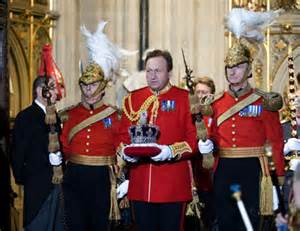
But there is more to the UK state than Westminster – ‘Mother of Parliaments’. Westminster acts as a front for the exercise of British ruling class power. The UK’s constitutional monarchical system does not even pretend to popular sovereignty, but only recognises the sovereignty of the Crown in Parliament. Under this formula, the British ruling class retains a whole host of undemocratic powers – the Crown Powers – beyond Westminster’s control. These can be resorted to when required. All the key personnel in the UK state declare an oath of allegiance to the Crown.
Although, the demand to “abolish the monarchy in Scotland” is mentioned in Keir’s pamphlet, in the proposed Charter for change at the end, clearly he sees this as an issue that only needs to be addressed after ‘independence’. Then we can “use the {monarchy’s} wealth for all.” The British monarchy is only viewed in its (costly) economic aspect. Its current political significance, as the public face of the Crown (with those anti-democratic oppressive powers) is ignored.
Thus, there is no hint in Keir’s Charter for Change of any opposition to the Crown Powers. Yet, these powers already provide a formidable weapon, placed in the hands of the British ruling class. The UK state and Cameron’s government have used them to pressurise the SNP leadership over the referendum.
Keir does acknowledge that the “No campaign has sought to deny… the people of Scotland… the fundamental right to decide what form of government they live under… from day one.” However, British Unionists will not be confining their opposition to further Scottish self-determination to the public arena, Westminster, its devolved Holyrood offspring, or the media.
And, the SNP government has already accepted that the rules for its referendum campaign are set down under the Crown Powers. This means that their hands are tied. In contrast, those upholding the UK state, which the Crown Powers are designed to serve, can resort to a whole host of anti-democratic and even repressive measures, should this prove necessary. Having already accepted all these retreats from the exercise of meaningful Scottish self-determination, the aim of the official SNP ‘Yes’ campaign has, with good reason, been dubbed ‘Independence-Lite’.
Since the SNP leadership wants Scotland to remain within the UK, this means that, even after a successful ‘Yes’ vote in 2014, these anti-democratic Crown Powers can still be used to threaten any formally ‘independent’ Holyrood. And, as Keir recognises, the SNP leadership is also prepared to concede ultimate control of financial policy to the City of London. The City is completely wedded to neo-liberalism and austerity – except for themselves, of course. Furthermore, as Keir does not point out, the City is protected under the Crown Powers too – its activities clothed in secrecy [66].
Thus, instead of conducting a “referendum to break-up the British state”, the SNP government is only seeking a mandate to initiate negotiations with the Westminster government over the delegation of its parliamentary powers, not the dismantling of the Crown Powers, nor other key components of the UK state.
The result of such negotiations would be little more than a junior managerial buy-out of the Scottish branch of UK plc – an analogy openly made by SNP-supporting businessman, Jim McColl. Then, following Scotland’s rebranding – with saltires and tartan figuring prominently – it would be business as usual, not only with the UK plc, but also with the much larger US Imperial Corp.
The SNP government, despite occasional rhetoric claiming otherwise, does not see its mandate coming from the people of Scotland. Thus, any successful ‘Yes’ vote would not lead to the setting up of a Scottish Constituent Assembly to draw up a new constitution, nor to decide upon Scotland’s relationship with other states and international organisations.
Instead, the SNP government sees its mandate as coming from holding office in Westminster’s devolved Holyrood parliament. It appears to accept that even if people vote for ‘Independence-Lite’, then this is still subject to further dilution. They have already clearly stated that they will bring existing Labour, Lib-Dem and Tory MSP’s into their Scottish negotiating team with the Westminster government, following any ‘Yes’ vote! Any new future Scottish constitution will have to be within the limitations set by these negotiations.
Under ‘Independence-Lite’, the SNP government has already set its ‘independence’ bar pretty low, even before any possible future negotiations. And, with these Unionist ‘allies’ on their negotiating team, the final outcome would lower this bar even further. Even the most adept independence seeking ‘limbo dancers’ would not be able to straighten their spines after stooping so low. As a consequence, there would be very little headroom for any meaningful self-determination for the majority of people living in Scotland.
However, Scottish business leaders could find that bar lifted just enough to let them get their desired lower corporate and income taxes. This, though, would only lead to a generalised ‘race-to-the-bottom’ [67] in the ensuing competition between states for inward corporate investment.

Another reason, given by Keir for voting ‘Yes’, is that “Britain remains one of the globe’s major imperialist powers. Under Tony Blair alone, Britain fought five foreign wars including the illegal invasion and occupation of Iraq. This is not a Union worthy of defending, not then, not now.” Therefore, Keir argues for a ‘Yes’ vote as a “significant step in weakening British {or US} imperialism”, and “to diminish Britain’s role as junior partner to US imperialism, weakening both sides of the ‘special relationship.’”
One problem with this is that back “then”, under Blair’s New Labour government, the SWP opposed independence for Scotland, at a time when the SNP at least officially opposed the Iraq war and membership of NATO. Today, however, the SNP government supports all US/British imperial wars, including that in Afghanistan, and it officially supports NATO.
After ‘independence’ the SNP government still want Scottish armed forces to operate under the British High Command [68]. Scottish military bases and troops would still be available for future imperialist wars. Following the underlying logic of Keir’s arguments, the SWP should have supported Scottish independence under the Blair regime, but oppose voting ‘Yes’ in the referendum campaign now!
The current SNP leadership has no desire to “diminish” Scotland’s part in assisting “Britain’s role as junior partner to US imperialism.” Nicola Sturgeon has just attacked the UK government for reneging on its promise to station more British troops at a revamped Leuchars. ‘British troops in now’ is not a traditional anti-imperialist demand!
Keir’s pamphlet was written before the official SNP climb down on NATO membership. His “key demand of quitting Nato” will certainly not now be “at the heart of the” SNP’s official ‘Yes’ campaign”. The SNP leadership retains only a paper-thin commitment to ending Trident nuclear weapons, now that it has accepted NATO.
Thus, if Keir and the SWP want to campaign for Scottish independence on anti-unionist and anti-imperialist grounds, then this means mounting a fundamental challenge to the SNP government and its official ‘Yes’ campaign.
______________
4. NO, NAE, NEVER – THE UK FOR EVER
THE UNIONIST LEFT ARE NAE SAE CLEVER
a) The SWP’s lack of an understanding of strategy also leaves them politically disarmed in the face of the British ruling class and Left unionism
Keir is aware of the need to confront the British Unionists. But, as in the case of the SNP leadership, he does not appreciate their strategy either. Hence his opposition is focused on a narrow front, whilst also appearing to accept some of their arguments. Thus, he will not be able convince those workers still influenced by Left Unionists.
Keir warns us that the “No camp’s rhetoric of ‘positive Britishness” is tacked on to their campaign. This is because “what lies beneath the surface are imperialist values, racism and anti-immigrant hysteria”, and these are likely to lead a resort to “the worst features of British nationalism”.
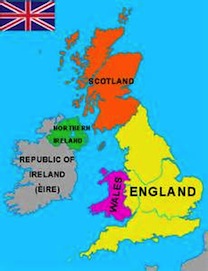
But, ‘Britishness’ is the ideological glue that helps to hold the whole geographical extent of the UK state together – Great Britain and Northern Ireland. Britain, though, is the geographical area covering England, Scotland and Wales. Keir gives one of his chapters the title, Reasons to break-up Britain. It would take tectonic plate movements to “break up Britain”. It needs a political movement to break up the UK. This is not an abstract geographical point. The ‘No’ campaign is seeking support across Scotland, England, Wales and Northern Ireland (and they do not look too pretty there either!)
Keir’s pamphlet has the subtitle No to nationalism. This should mean a clear commitment to mounting an internationalist campaign across these islands. Such a democratic ‘Internationalism from Below’ campaign is needed to counter the UK state-backed ‘No’ campaign’s bureaucratic ‘internationalism from above’. So, this means seeking support in England, Wales and all of Ireland [69], despite Ireland having fallen well below Keir’s British radar [70].
The ‘No’ campaign is acting on behalf of the overwhelming majority of the British ruling class. However, Keir shows little appreciation that their strategy is not confined to the ‘No’ campaign’s public activities. This is, once again, because Keir does not see the significance of the Crown Powers at the ruling class’s disposal.
The strategy the British ruling class has pursued to maintain its UK state has changed over time. Indeed, the British ruling class can draw upon formidable historical experience in this regard. We can begin to understand their current strategy by examining recent historical developments and their real concerns [71].
Between the late 1960’s and 1998, Scotland was not the main concern of the British ruling class when it came to maintaining the unity of the UK [72]. Their prime worry lay in the challenge they confronted in the ‘Six Counties’ of Northern Ireland [73]. Here they faced first the large direct action mobilisations of the Civil Rights Movement and the 1969 electoral victory of Bernadette Devlin/McAliskey. This initial challenge was later transformed into that of the armed struggle, led by the Provisional IRA, backed by the growing support for Sinn Fein after Bobby Sands’ electoral victory, during the Hunger Strikes of 1981.
After the failure of both the Wilson and Callaghan governments’ (in the periods from 1969-70 and 1974-9) and the Conservatives’ (1970-74) half-hearted Stormont reforms, all backed by state repression, the British ruling class opted for Direct Rule and stepped-up repression. Roy Mason, Labour’s Northern Irish Secretary, began the anti-Republican criminalisation offensive. This culminated in the Republican challenge of the Hunger Strikes.
However, faced with a sudden SNP electoral spurt in the two General Elections of 1974, the British ruling class only moved to a somewhat half-hearted support for liberal constitutional reform – Devolution for Scotland, and with even less enthusiasm for Wales. But, the increasingly confident conservative wing of the British ruling class organised to marginalise these tentative reformers. The Labour government’s Scotland and Wales Devolution referenda were defeated in 1979. The existence of considerable conservative unionist sentiment within the Labour government and the wider party also helped in this. This defeat ushered in a period of Tory Unionist reaction.
The very mild constitutional campaigning of Labour, Liberals, SNP and Plaid Cymru had given the Tory Right confidence. Their approach also meant that the ruling class did not need to resort to any of the more draconian Crown Powers to derail the two Devolution campaigns. In contrast, in Northern Ireland, the Republican opposition mounted a much more robust challenge to the UK set-up (74). Therefore, they faced far more repressive Crown Powers in an attempt to break them. Control of the province was virtually handed over to the security forces.
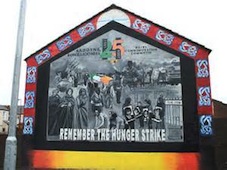
By 1985, the constitutional Irish Nationalists of the SDLP and the Irish government (much to the chagrin of the still intransigent Ulster Unionists) were brought on board under the Anglo-Irish [75] Agreement, to try and marginalise the Irish Republicans. Yet, Republican resistance continued. This eventually forced the British ruling class into a more serious rethink and the beginnings of a ‘New Unionist’ reforming strategy. This was designed to bring the Republican leadership on board. After ditching Thatcher, the Tories came up with the Downing Street Agreement in 1993. It raised the prospects of Stormont being resurrected – albeit now reformed to attract Irish Nationalists.
In Scotland and Wales, by way of contrast, the Tories felt confident that they did not need to make any readjustment to their conservative unionist approach [76]. The very mildness of the constitutional nationalism of the SNP and Plaid Cymru continued to reinforce the Tories’ belief that no political concessions were needed in either of these countries.
But, the Tories’ ‘scorched earth’ de-industrialisation policies [77] seriously undermined their electoral support in Scotland and Wales. The public powerlessness of the Labour Party, in ‘Labour Scotland’, in the face of constant Tory Westminster attacks, led to the marginalisation of the anti- and more half-hearted Devolution supporters in the party [78].
Devolution came to be seen as holding out the promise of at least providing some protection from rampant Toryism, and the ‘Dented Shield’ model was very much part of the thinking under Labour’s ‘New Realism’ at the time. Supporters of Devolution also emerged on the Scottish Labour Left. They dreamt of the possibility of a creating a Ken Livingstone-style GLC politics in Scotland.
However, it was the opposition to the poll tax, which really put the ‘National Question’ back on to the political agenda in Scotland. With its massive defiance of Tory Westminster law and its local Labour agents, this has turned out to be of considerably greater long-term import than the short-lived SNP electoral spurt of 1974-77. The former produced the first unsuccessful Labour government 1979 Devolution proposals. The latter contributed to the political climate, which allowed New Labour to successfully introduce ‘Devolution-all-round’ in 1997-8.
By the late 1980’s Labour Party members already wielded some influence in the Scottish Constitutional Convention (SCC) [79], which supported advanced Devolution. However, the SCC leadership, with Labour backing, ensured that support for constitutional reform policies was kept firmly separated from any support for the most vital issue motivating those drawn to the Scottish democratic movement at the time – opposition to the poll tax.

Later, in 1997, when New Labour became the Westminster government, the SCC was marginalised. New Labour produced its own much less radical Scottish Devolution proposals. They mounted their own tightly policed ‘Yes, Yes’ campaign, to win support for their new Scottish Devolution Bill [80].
However, the most significant feature of New Labour’s constitutional reforms, at the time, was its ability to win support from the majority of the British ruling class. These people realised, however reluctantly for some of them, that it was New Labour’s expanded ‘New Unionist’ Devolution proposals, which would best enable them to hold their UK state together. This contributed to the favourable press backing that New Labour received in the 1997 General Election.
The combination of the ‘Peace (pacification) Process’ in Ireland and ‘Devolution-all-round’ for Scotland, Wales and Northern Ireland now constitutes the accepted ruling class political framework for dealing with the ‘National Question’. New Labour had appreciated that, for longer-term political stability, ‘New Unionism’ needed to cover Scotland and Wales too [81], and not just Northern Ireland, as the Tories had thought.
This version of ‘New Unionism’ has been officially backed by British Labour, the Lib-Dems, and (later) even by the Conservatives; the SNP in Scotland; Plaid Cymru in Wales; Sinn Fein, the SDLP, the UUP, the DUP and Alliance in Northern Ireland [82]; the TUC, STUC, WTUC, the ICTU and its Northern Ireland Committee; the US government and the EU bureaucracy.
The reason for the overwhelming ruling class political support is that the ‘Peace Process’ and ‘Devolution-all-round’ have created the optimum political conditions throughout these islands for corporate business to maintain their profits. National democratic movements (even the one led by Sinn Fein that once represented a serious threat) have been ‘house-trained’ and allowed inside the UK ‘home’ to help run things in a subordinate role.
Meanwhile, the official trade union movement has been committed to ‘social partnerships’ between union officials, the state and the bosses, first in Ireland under Fianna Fail, and then later, under New Labour, throughout the UK. The effect of ‘social partnerships’ has often been to reduce trade union officialdom to a free personnel management service for the bosses [83]. These union officials have also officially backed the UK and Irish government’s constitutional reforms. They continue to provide political support whenever they think it is necessary.
b) Is the British ruling class prepared to concede further constitutional reform?
If Socialists are to develop a clear strategy, then we need to have some understanding of the options open to British ruling class under the present UK constitutional set-up. This begs the question – how much further constitutional reform is the British ruling class prepared to concede, especially now that the economy has been in long-term recession?
After all, it was Thatcher’s appreciation that the UK was facing a economic ‘rough ride’ and increased international competition, in the late 1970’s, that persuaded the majority of the ruling class to adopt her ‘batten-down the hatches’ of ‘UK plc’, and to jettison any ‘costly’ and ‘unnecessary’ liberal Devolution reforms.
The short answer to this question is likely to be that British ruling class would be prepared to make further constitutional reform if sufficiently pressed, provided they also remain firmly in control of this process, and could gain some advantages for themselves.

In 2011, well into the current economic crisis, the Welsh Assembly passed an act [84], giving it similar powers to those already enjoyed by the Scottish Parliament in Holyrood, Although this move was proposed by the then Welsh Labour/Plaid Cymru coalition in Cardiff Bay, it was also backed by the Welsh Lib-Dems and Conservatives [85]. Significantly, it was approved by Cameron’s Tory/Lib-Dem Westminster coalition. The Welsh TUC backed it too.
Indeed, British Unionists were so much in control that, after the result of the 2011 Welsh Assembly elections, the Labour Party smugly ditched its previous coalition partner, the very mildly constitutional nationalist Plaid Cymru, to form an exclusively Welsh Labour government. Plaid lost Assembly seats, whilst the Tories were able to overtake Plaid as the second party in the Cardiff Bay Assembly.
In Northern Ireland, the British ruling class and its UK state is no doubt pleased at the ‘progress’ it has made there too, especially considering the extent of the challenge they originally faced. Up until 1973, they were in the position that they depended almost entirely upon the Ulster Unionists to maintain law and order. Hence, they had to turn a blind eye for 50 years to the particularly repressive nature of their Orange statelet there.
Since the 1998 Good Friday Agreement the UK government has been able to reposition itself, though. It now occupies a more internationally acceptable position. It can claim to be an ‘honest broker’ between the Unionists and Nationalists. These political divisions have been constitutionally entrenched under the Good Friday Agreement [86].
A real bonus for the British ruling class, in the context of the current economic crisis, is that the majority of workers in the Unionist and Nationalist communities have not taken any significant united class action to oppose the Westminster austerity measures [87]. The ministers of the two main Stormont parties, the Unionist DUP (backed by the UUP and Alliance), and the Nationalist Sinn Fein (backed by the SDLP) implement Westminster imposed budget cuts, but disagree about which community they should mainly fall upon. This sets the pattern for much of the politics in the two sets of communities, particularly those of the working class, divided in Northern Ireland by a new social partition.

At the moment, though, Loyalists are ahead in the politics of putting on the pressure. They ‘negotiate’ by rioting. They make their weekly marches to Belfast Council’s City Hall. This has led to big falls in business in the city centre. On the return leg, the marchers make attacks on the Nationalist residents living in the isolated Short Strand in East Belfast. They finish it all off by some burning of property (especially Alliance offices) in their own residential areas in East Belfast [88].
The fact that the PSNI/RUC units accompanying these ‘protests’ treat Loyalists with kid gloves, compared to much milder protests by Republicans, helps to explain the longevity of such action, even after it has been publicly disowned by the DUP and the UUP. These two parties had initially encouraged this protest, but the more plebeian Loyalists saw their chance and ‘hijacked’ the campaign [89].
A key thing, though, is that, so far, British troops have not had to be deployed, although regiments are still at hand in nearby barracks. In the meantime, the new MI5 Belfast HQ has been designed to produce the level of surveillance and state intelligence necessary to make direct British armed forces’ intervention less necessary. This makes their behind-the-scenes manipulation more effective. So the UK government still remains relatively confident of its ability to control things there.
However, since the late 1990’s, Scotland has replaced Ireland as the frontline of concern for the British ruling class. For a brief period between 1999 and 2004, an alternative to the tame constitutional nationalism of the SNP emerged. The SSP, which was able to increase the number of its MSPs from one to six, between 1999 and 2003, supported the break up of the UK and opposed US/UK imperialism.
When the Queen opened the new Holyrood parliament in 2004, warmly welcomed by the then Labour/Lib-Dem Scottish government, the SNP official opposition and the Scottish Tories; the SSP was able to mount a well-supported, and well-publicised protest based on the republican Declaration of Calton Hill.
The growing movement for Scottish self-determination could no longer just be equated with the SNP. A radical and potentially Socialist Republican alternative was growing. Furthermore, the roots of the SSP lay back in the anti-poll tax campaign, which successfully defied the UK state. Then came ‘Tommygate’ [90]!
Since then, the SSP has split, and the two successive SNP Holyrood election victories (in 2007 and 2011) have had the effect of restoring the SNP to the largely unchallenged leader of the wider movement for Scottish self-determination. In the process, the meaning of ‘self-determination’ has become considerably watered down. Neither the remaining SSP, nor its Solidarity breakaway, has made any attempt to build an independent class campaign for meaningful Scottish self-determination.
The SSP and Solidarity first wooed the fringe Right/Left Populist Nationalists of Independence First, and then the Social Democrats of the SNP in the Scottish Independence Convention. Now the SSP leadership has tailed the increasingly Right-moving SNP government in the official national ‘Yes’ campaign. They are happy to have been granted the official Left franchise.

The newly formed Radical Independence Campaign represents the first indication of the emergence of a political arena, in which the raising of the idea of building an independent class campaign and genuine self-determination can be discussed. But, Left Nationalist pressures are still strong, with some, such as Colin Fox, wanting to confine RIC activities to acting as a Left pressure group on the SNP’s official ‘Yes’ campaign.
So, what about the SNP’s own ‘Independence-Lite’ referendum challenge to the current version of the UK constitution? It already has been shown that this does not amount to any fundamental challenge to the UK state machinery, nor to US/British imperialism.
Nevertheless, the prospect of Scotland gaining its own seat in the UN General Assembly raises the possibility of the removal of a future ‘not so Great Britain’ from the Security Council. This is very much opposed by both the British ruling class and the US – where else are they going to get such a reliable stooge?
And, whilst the SNP’s official anti-NATO climb down will have reassured the US, official SNP attempts to marginalise the issue of the Trident base will still be contested strongly. Furthermore, a jittery post-financial crash EU bureaucracy does not like the political and economic uncertainty that Scottish independence would bring, and important member states, such as Spain and Belgium, would not like to see such a breakaway precedent being set [91].
The SNP leadership has acted quite skilfully to gain almost complete hegemony over the movement for Scottish self-determination. In the process, ‘Independence-Lite’ has so watered down the notion of self-determination, that it has stripped its meaning of much of its democratic content. Furthermore, behind-the-scenes contacts with British Unionist politicians and UK and US state officials will make the SNP leadership even more conciliatory in practice than their public statements.
But, the British ruling class still does not like what it sees as the SNP’s political adventurism during a time of severe economic instability. For them, this is symbolised by the ever-cocky Alex Salmond. Furthermore, there is that very real competition between the SNP and Scottish Labour over control of patronage and career opportunities. The Labour Party, in particular, wants to knock Salmond off his roost and clip the wings of the SNP.
Therefore, the first priority for Scottish Labour, in particular, is to humiliate the SNP in the 2014 referendum vote. They hope by denting SNP credibility, this would allow Labour to increase its Holyrood representation at the subsequent election in 2016, thus restoring some of its lost powers of patronage.
However, they are also probably well aware that this would only provide a relatively short breathing space. Their austerity measures (e.g. Johann Lamont’s announcement of the ending universal benefits, and the introduction of university student tuition fees) would probably soon dent any temporary spurt in their electoral support.
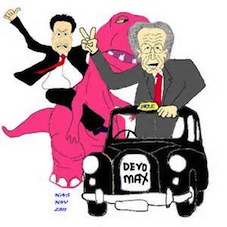
Little doubt, there are Labour members, who do support ‘Devo-Max’. After all, this would also provide them with new career opportunities, whilst retaining their options at an all-UK level. And the further devolution of tax-cutting powers to Holyrood, under ‘Devo-Max’ (as opposed to increasing corporate taxes and income taxes for the rich) would enable the Labour leadership to ratchet-up its austerity offensive [92]. The political direction that Labour would finally take, though, will depend on whether or not they form the next Westminster government, and the state of the economy the banksters and their friends leave them with.
There is another even more reactionary alternative, possibly prefigured by the fact that Labour is allied with the Tories in the ‘Better Together’ campaign, and is in coalition with the Tories in six Scottish local councils. And in another possible scenario, a new Tory government, with UKIP breathing down their neck, would be as ready to drop any post-referendum ‘promises’ as Thatcher’s Tories were, when they ditched Sir Alec Douglas-Home’s pre-1979 better Scottish Devolution ‘promise’. And, in such a situation, Scottish Tory leader, Ruth ‘once against more Scottish powers, now for more powers’ Davidson would probably soon follow Cameron into political oblivion, as the Tory Right took over.
So the British ruling class has more options than are available to the SNP leadership. This reflects the difference in the resources the former can draw upon compared to the latter – their long historical experience, the Crown Powers and their more powerful international allies. The British ruling class is also aware that the SNP leadership does not want to mobilise any radical movement from below, which could challenge its own project of building up a wannabe Scottish ruling class.
c) The limitations of the British Unionist Left and Broad Leftism

Given a choice between the ‘Yes’ and the ‘No’ campaigns Keir can easily dismiss the latter. After all, it is an alliance led by the Tories. Although, as Keir appreciates, “even arch-Thatcherite, former Scottish secretary Michael Forsyth pleaded with the Tories to take a back seat and let Labour spearhead the campaign” in Scotland.
However, “Salmond’s gallop rightwards {still} makes it more difficult to muster enthusiasm for a Yes vote.” Therefore, the SWP seems to think it can offer the ‘Yes’ campaign better tactics to win that ‘Yes’ vote.
Nevertheless, the SWP is not prepared to challenge the British ruling class, nor the wannabe Scottish ruling class, over the very limited nature of self-determination on offer. They both accept the continuation of the UK in some form. As we have seen, Keir leaves the matter of the state’s Crown Powers out of things today, in favour of dreams of ditching the monarchy after 2014.
But Keir feels on much firmer grounds when he states what the central issue is –“Its ‘austerity stupid’”. So, he starts by looking for the forces that might challenge austerity. In Keir’s Introduction (emphasising its central importance for the SWP), he states that the “trade union movement in Scotland can mount an anti-austerity and anti-poverty offensive in opposition to today’s dominant neo-liberal orthodoxies” [93].
You might think that Keir would go on to show what potential existed in the ‘actually existing’ “trade union movement” to do this, or to point out what is required for it to take on this role. Unfortunately, when he returns later to this trade union movement, he promotes a deceptive argument found more widely on the Left. Keir claims that, “the strike by 2.5 million public sector workers across Britain [94] in 2011 is a brilliant example of the kind of working class unity we need north and south of the border to oppose Tory austerity.”
Presumably, for Keir, this “brilliant” example is being used to demonstrate working class power. Unfortunately, it shows no such thing. For, within less than 24 hours of November 30th, 2011, the TUC and the majority of the public sector trade union leaders, who had organised this a national day of action against the government’s pension cutting proposals, were in headlong retreat. Having briefly raised their heads above the parapet, telling the Tory government – “Look, this is what we can do” – they then quickly ducked down again and became involved in an ignominious scramble. They hoped to negotiate the most minimal concessions on a union by union, sector by sector basis.
A “brilliant example of the kind of working class unity we need” – this was not [95]. It certainly did little to alter the course of the government either. They have gone on to make even more sweeping cuts in social provision, including the ‘Bedroom Tax’.
Keir, though, is arguing within a set of assumptions shared by many others on the Left. These provide another example of what happens when you elevate tactics to strategy. All attention was paid on getting the maximum vote for strike action on November 30th, followed by self-congratulatory pats-on-the-back, over the numbers striking on the day [96].
There was no real attempt to warn people of the clear intentions of the trade union leaders to confine this protest to a one-off token day of action. Instead, the emphasis was placed upon calling upon the very same trade union leaders to organise more of the same. There was no campaign to develop a genuine rank and file movement, which could begin to defy these misleaders [97]. It is only when workers have become persuaded of the need to take effective action in defiance of well-paid and privileged careerist officials, that we will get the kind of working class unity we really need to win such campaigns.
Neither does Keir deal with one very obvious obstacle in using the official trade union movement to achieve a ‘Yes’ vote. The further up the official trade union hierarchy you go, the stronger the ties with the official Labour Party, and the stronger the opposition to breaking the British Union.
If neither the STUC, nor many senior trade union officials in Scotland, have publicly come out quite as vociferously in favour of the ‘No’ campaign as Ed Miliband, Douglas Alexander and Johann Lamont might have liked, this is mainly because they know that many Labour-supporting trade union members can not stomach the official link with the Tories, and that quite a number of their former Labour-supporting members now vote for the SNP. They do not want to lose these members who contribute towards their salaries and perks. So, although, many officials will try to use their behind-the-scenes power to prevent the ‘Yes’ campaign mobilising any support directly within the trade unions, they are quite happy to leave it to leave the Labour Party to campaign for a ‘No’ vote in the public.
Furthermore, if Socialists are serious about raising the issue of meaningful Scottish self-determination in the trade union movement, there is another problem, apart from the officials’ bureaucratic limiting of debate. There is also the British Unionist Left. Their members are still active at the lower levels of trade unions. Politically, this Left Unionism draws its support mainly from the ever-dwindling Labour Left, and the Communist Party of Britain remnant of that once much more influential old CPGB. They have an organised political voice in the Red Paper Collective [98].

However, Left Unionism in Scotland draws succour from more widely held Social Democratic sentiment. It feeds from the same pool of post-war Labour nostalgia that is being cynically used by Alistair Darling and Johann Lamont [99] for the Tory/Lib-Dem/Labour ‘Better Together’ campaign. Scottish-born Danny Boyle also drew inspiration from this for his Olympic Isles of Wonder ceremony. Even Boris Johnson was impressed!
Keir does mention the influence of this Left Unionism immediately before his weak November 30th example, in the chapter, For unity of the working class NOT the British state. But his resort to the 2011 pensions as a “brilliant example” has another fatal flaw. The obvious response to this from any Left Unionist would be to point out that such unity occurred precisely because of the current territorial extent of the UK. These trade unionists are all employed by the UK state (including those with jobs in its nationally devolved agencies). This is why so many trade unionists were striking on that day.
Furthermore, UNITE, which also organises south of the border in Ireland, did not bring its members out on strike there, because Ireland is constitutionally politically independent of the UK. UNITE’s members in ’26 counties’ Ireland are not subject to the UK government’s pension reforms [100]. This would also be the case if Scotland became independent too.
Keir then states that, “The necessity for workers in Scotland to unite with their brothers and sisters in England and Wales {but apparently not in Northern Ireland!} will not evaporate just because Scotland votes for independence”. This statement is made as an assertion. It is not backed up with any real arguments.
For it is more than likely that some careerist trade union officials would push to create specifically Scottish trade unions in an independent Scotland. They could argue for the break-up of existing all Britain or all-UK trade unions, especially when there were now separate negotiations for workers in Scotland. And, behind any pragmatic arguments they might use to justify such moves, they would privately be thinking – and the salary of the new national general secretary would need to be considerably greater than that of a regional official! [101]
Only by taking a Socialist Republican, ‘Internationalism from Below’, and Rank and File trade unionist stance, can such Left Unionist arguments effectively be challenged. Far from any existing all-Britain, all-UK or all-islands trade unions bringing about concerted solidarity action, their bureaucratic unity has done little more than enhance the pay levels and expenses of union officials. Meanwhile, union members have suffered massive attacks on their working and living conditions.
Most of those wider actions, like November 30th, 2011, have been tokenistic. It is as if, in rejecting New Labour’s total hostility to industrial action, the Left has retreated to it immediate predecessor – old Labour’s 1980’s ‘New Realism’. Yet, it was their tokenistic ‘days of action’, that provided the conditions for New Labour to emerge and triumph. Today, tokenistic ‘days of action’ only offer the prospect of a possible future Ed Miliband government. This would take up where Alistair Darling left off. He made a 2010 General Election promise that if New Labour were re-elected, he would “make cuts deeper and tougher than Thatcher”!
All existing union leaderships accept the anti-trade union laws in practice. None try to extend solidarity beyond those balloted under the anti-trade union laws’ very restrictive legal conditions. None of these union leaderships hold to any perspective of building up members’ support to actively defy these class laws. Most look to some future Labour government to abolish them. They very conveniently forget that Blair’s last Labour government left them untouched [102]; and that the political make-up of any likely future one will be just as, if not more, Right wing [103].

Furthermore, the promotion of such anti-trade union thinking has not been confined to New Labour at Westminster. Glasgow Labour city council went beyond this and actively promoted new policies to divide and weaken trade unionism. Their leaders dreamt up the idea of Arms Length External Organisations (Aleos) to break up the council’s direct control of the particular services they ran. The prime purpose behind this was to deny their employees the possibility of taking legal united industrial action. Thus, Labour, the main party in Scotland claiming to defend the benefits of all-British trade union unity, was working to prevent its own council employee’s from uniting together, even when working out of the same Glasgow office! [104]
British trade union leaders (mainly Labour Party members) are quite unable to conceive of an active trade unionism, which goes beyond reacting to, and organising only in response to those employers operating within the existing territorial extent of the UK state. But, this is also largely true of those Left British Unionists who, whether in or out of the Labour Party [105], follow a Broad Left road within the trade unions.
In many ways Broad Left trade union thinking mirrors the workings of the UK state. Broad Lefts claims that sovereignty lies in the union’s AGM (Parliament), when, in reality, this only fronts the source of real control – the union HQ (Cabinet). Union officials work in conjunction with the state and bosses in ‘social partnerships’ (the Cabinet works with senior state officials – in the armed forces, security agencies, judiciary and civil service – and with influential bosses). Broad Left union leaders (Government ministers) argue for their own continued high pay rates, expenses and other perks (not all of which are made public) regardless of their success in enhancing the pay and conditions of their members (the people of the UK).
There is, of course, a newer Scottish Broad Leftism, which accepts Scotland as its political framework, in the same way as British Broad Leftism accepts Britain. But, as we shall see later, such transference of political affections has not been uncommon over the last quarter century.
d) The need for a Rank and File, or ‘republican industrial’ and ‘Internationalism from Below’ strategy
In contrast to the Broad Left approach, a Rank and File, or a ‘republican industrial’ strategy (Socialist Republicanism in the economic arena), sees sovereignty lying collectively with trade union members in their workplaces [106]. We need to be able to take the action we see fit, at whatever level – workplace, community, regional, national or international. Union officials’ dismissal of particular groups of workers’ industrial action as ‘unofficial’ needs challenging. Such action is independent action. Workers should aim to get solidarity action, either through picketing, or by calling for wider meetings to win more support.
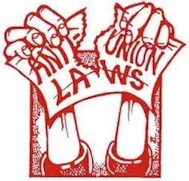 Independent action is the only way that the existing anti-trade union laws are ever likely to be beaten. However, such a ‘republican industrial’ strategy goes much further than this. It also means that the political discussion, at present confined to union conference delegates and union affiliated (i.e. bureaucrat controlled) Labour conference delegates, would need to take place at workplace level [107]. This would lead to a much more politically informed working class, as well as providing an independent class foundation [108], upon which to build a wider Socialist Republican politics.
Independent action is the only way that the existing anti-trade union laws are ever likely to be beaten. However, such a ‘republican industrial’ strategy goes much further than this. It also means that the political discussion, at present confined to union conference delegates and union affiliated (i.e. bureaucrat controlled) Labour conference delegates, would need to take place at workplace level [107]. This would lead to a much more politically informed working class, as well as providing an independent class foundation [108], upon which to build a wider Socialist Republican politics.
This is the only way that workers can move beyond responding to particular employers within a particular state, other than in the reactive manner of current official trade unionism. The alternative is for rank and file workers to take the initiative, thus extending both our thinking and our action beyond current official union limitations.
A Rank and File approach also opens up the door to ‘Internationalism from Below’. If we want to see an example of this in action, we have to look beyond those trade union struggles, which are currently so thoroughly policed by union officials. Back in the late 1980’s, the Tories introduced the poll tax in Scotland, a year before extending this to England and Wales [109].
The Labour Party and the STUC formed the official ‘Axe The Tax’ campaign. After some token actions it soon gave up – sound familiar! Instead, Labour councils became the main agents collecting the Tories’ hated tax, just as they comply so willingly today with implementing Westminster’s austerity measures. Back then, having recently defeated the miners in 1985, the Tories thought they could ‘walk on water’. They had not the slightest inkling there might be opposition beyond the official Labour movement, whose early capitulation they had quite correctly anticipated.
But, the Anti-Poll Tax Unions, based largely on working class communities, formed and organised a vibrant independent class campaign. They were prepared to defy the Tories’ law, and all those, including Labour councils, prepared to implement it. The government faced a lot more than it had anticipated.
The then SNP leadership thought they could make political capital and try to confine the opposition to the poll tax mainly to electoral protests in Scotland [110]. The Scottish Anti-Poll Tax Unions, however, organised on ‘Internationalism from Below’ basis. They defied the Tory law, Labour councils, registration and sheriff officers, and occupied council chambers and sheriff officers’ premises. They sent out delegations to England and Wales, in advance of the poll tax being introduced there, to prepare for extended action the following year.
By early 1990, the Scottish local authorities were already overwhelmed by a combination of non-registration and non-payment, but the coup-de-grace was delivered in the anti-poll tax riot in Trafalgar Square in London on Saturday, March 30th of that year. The poll tax was scrapped. Soon the previously adulatory Tory leadership ditched Thatcher.
This is the kind of ‘Internationalism from Below’ independent class approach, which Socialists need to argue should be extended into the trade unions themselves. We are seeing the first possible hints of a wider challenge in the recent electricians’ strikes. This is also the background that has led to Rank and File candidate Jerry Hicks, mounting a challenge to Miliband-supporting Len McCluskey’s continued Broad Left leadership of UNITE.
Furthermore, when workers see sovereignty lying with themselves in their workplaces (and hopefully their communities too), and ‘Internationalism from Below’ as the way to organise effectively, then the issue of which national flag flies over union HQ can be seen as the British Unionist and Scottish Nationalist diversion it is. Yet, these are the type of arguments that Keir fails to make in his pamphlet. This makes the SWP a relatively easy target for Left Unionists.

There is another argument used by Keir, which highlights his inability to counter Left Unionists. Without realising the real significance of what he has written, Keir provides a good example of how the divide-and-rule effects of the UK constitution can reach deeply into the official Labour Movement. He criticises the divisive impact of the ‘Save Scottish Steel’ at Ravenscraig campaign which “happened during the Great Miners’ Strike of 1984-85”. However, he neglects to tell us, that this was mounted, not by the Scottish Nationalists he appears to be attacking, but by Labour Party and CPGB trade union officials – supporters of a continued British Union!
There is one particularly sad indication of the Unionist Left’s lack of preparedness to take the political initiative. As we have already seen, their thinking and arguments are largely reduced to suggesting reactive responses by organisations based on the existing UK state boundaries, or more often, Britain. As a consequence, we are told that, if there were to be Scottish independence, then there would never be another British Labour government, or in some self-delusionary cases, possibly even a future British Socialist government.
Left Unionists’ belief in the ‘progressiveness’ of Scottish Labour MPs is touching, given their ignominious role in helping Blair to implement foundation hospitals in England. And, when it came to that defining vote, for and against Blair over starting the Iraq War, only 17 Scottish Labour MPs voted against, whilst 33 voted for!
And, as for those Socialists who believe in an all-Britain (perhaps better styled all-British!) Socialist Party, there are currently only three organisations of any significance in Scotland, and that is the Communist Party of Britain (CPB), Socialist Appeal, and the Socialist Labour Party. However, ‘significance’ is only used here as a very relative term.
The CPB, a rump, coming from the once much more influential CPGB in Scotland, is a shadow of that party’s former self. The CPB has no real belief that it will ever become the dominant force in the official British Labour Movement. It quite happily hands that role over to the rapidly declining Labour Left. They currently work together in the Red Paper Collective, whilst the old CWI, now Socialist Appeal, try to provide a ‘Maginot Marxist’ [111] cover for their own deep entrism within the Labour Party. As for Scargill’s SLP, it only ever surfaces as an election slate in Scotland, and is otherwise a phantom organisation.

Yet, even today there are two responses in England to the situation in devolved Scotland, where limited social reforms (e.g. free elderly care provision, free student tuition fees, non-introduction of some NHS counter-reforms) have been maintained or extended. There has been the reactionary response – ‘Cut that Scottish budget, scrap those reforms!’ (with special thanks to Johann Lamont for adding to this clamour!) However, there has also been a more progressive – ‘Well done, we want those reforms down here too’.
The best way to reinforce that second response, and to advance the Socialist cause in England, would be for Scotland to break away from the UK, and to provide an example of a much more radical alternative to the existing state of affairs. Socialists can help provide this example by openly contesting the whole UK political set-up, undermining the Crown Powers and breaking the imperial links, especially through NATO and the British High Command. These have done so much to hold back real further progress throughout these islands.
A Socialist Republican, Scottish Internationalist understanding of the UK state and the current British ruling class strategy clearly shows that, not only Scottish, but Irish, Welsh and English workers have a real interest in breaking-up the UK state. This can contribute to helping us mount the ‘Internationalism from Below’ challenge we really need.
____________
5. SAE COME A’ YE AT HAME WI FREEDOM [112]
MEANINGFUL SELF-DETERMINATION TODAY
a) Marx, Lenin (via Kautsky), John Maclean and James Connolly – a roundabout way to ditch the principle of national self-determination for Scotland
We have seen that Keir provides a variety of Left Nationalist and Left Unionist arguments for voting ‘Yes to independence’ but ‘No to nationalism’. However, neither of these options is actually going to be on the 2014 ballot paper. There will be a choice between a ‘Yes’ vote for the SNP government’s proposal – ‘Independence within the UK’ (this is, itself, a compromise between two kinds of nationalism – Scottish and British) – and a ‘No’ vote, which means support for the conservative British Nationalist UK status quo.
The SWP claims to be a revolutionary party in the tradition of Lenin and the Bolsheviks. So, Keir feels he has to include a chapter with a reference to the “Marxist approach to nationalism”. It is titled Socialists, the national question and the SNP. However, problems arise when you confuse nationalism with the ‘National Question’. Nationalists have their own ways of addressing this issue, but Socialists approach it in a quite different way. This reflects the different class interests being expressed.
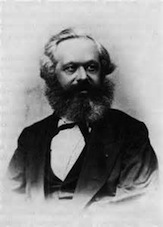
Kier takes us rapidly through Vladimir Lenin, Karl Marx, “the great Scottish socialist and Red Clydesider, John Maclean” and the “Edinburgh revolutionary James Connolly.” They are all lumped together as if they shared identical positions on the ‘National Question’. Whilst some common threads in their thinking can be teased out, not only did they not necessarily share the same approach to the ‘National Question’, they all changed their minds over time – with the exception of Connolly.
Marx supported three different approaches to the ‘National Question’ during his lifetime. First there was his cosmopolitan approach, which denied the ‘National Question’ had any real significance, because capitalism itself was solving that problem. He held to this understanding up to the 1847-9 International Revolutionary Wave.
This was followed by a period in which Marx saw Tsarist Russian reaction as the main political problem in Europe. Thus, he gave his support to national democratic movements in what he termed ‘historic nations’ [113], e.g. Poland and Hungary, and their struggles against Tsarist Russia and its Hapsburg Austro-Hungarian ally. He vehemently opposed national movements amongst the ‘non-historic’ peoples, particularly in eastern Europe, viewing them as only a catspaw for Tsarist Russia.
It was only from the 1860’s that Marx came to an ‘Internationalism from Below’ position, partly influenced by developments in Ireland. This was when he took up the issue of Ireland in the First International. The First International supported ‘the right of every people to dispose of itself’ – an early form of ‘the right of national self-determination’ later adopted by the Second International. If Marx had disagreed with this, he would have certainly challenged it.
Lenin’s view of the ‘National Question’ was greatly influenced by Karl Kautsky, who supported ‘the right of national self-determination’ at the 1896 London Conference of the Second International. Kautsky tended to emphasise the ‘progressive’ role of capitalist economic development in solving the ‘National Question’, through its encouragement of the assimilation of nationalities.

Kautsky saw the expanding capitalist economy as eventually bringing about a situation whereby, “Once we have reached the state in which the bulk of the population of our advanced nations speak one or more world languages besides their own national language, there will be a basis for a gradual reduction leading to the total disappearance of languages of minor nations, and finally, to the uniting of all civilised humanity into one language and one nationality.” Although not clearly expressed, this would appear to suggest a process, which would be completed in many states by capitalism itself. However, Kautsky probably thought it would take socialism to extend this assimilatory process across the whole of the globe.
Lenin took on some of Kautsky’s thinking in his interpretation of the ‘National Question’ in Ukraine. “For several decades a well-defined process of accelerated economic development has been going on in the South, i.e. the Ukraine, attracting hundreds of thousands of peasants and workers from Great Russia to the capitalist farms, mines and cities. The assimilation – within these limits – of the Great Russian and Ukrainian proletariat is an indisputable fact. And this fact is undoubtedly progressive”.
Despite that vague reference to “within these limits”, Lenin’s real emphasis is on the “undoubtedly progressive” nature of this assimilation – something he chose to emphasise through his italicisation of these words. There is no mention here of the cultural oppression that Ukrainians faced, nor that, under Tsarist and employer-enforced ‘Russification’, this ‘assimilation’ was a one-way process. It looks as if Lenin did not think there was anything in Ukrainian culture that could usefully be taken up by Russians – a view also held by the overwhelming majority of Great Russians.
However, both Kautsky and Lenin realised that unimpeded capitalist ‘progress’, and the national assimilation they desired, might not always be possible. This was why they conceded that raising the issue of national self-determination might sometimes be necessary, in states overburdened by feudal and semi-feudal remnants.
But, this was meant to be a temporary expedient until such time as ‘normal capitalist progress’ could assert itself, and allow further assimilation to take place. In the meantime, Social Democrats (and later, the official Communists) should confine their support to upholding the right to national self-determination. They should avoid becoming embroiled in leading national democratic movements trying to exercise that right.
When Kautsky and the Second International took up ‘the right of national self-determination’, they were adopting another sort of ‘Maginot Marxism’. They hoped that by upholding this right on paper, this would mean they would never need to support its exercise in practice. Therefore, when events overtook them, and national democratic movements developed, Social Democrats were outmanoeuvred. Thus, Nationalists almost inevitably led these.

In 1913, Lenin went on to identify the two parts of the world where the ‘National Question’ and the issue of ‘the right of self-determination’ were still on the historical agenda – the decaying Asiatic Empires (which he later expanded to cover all the imperially dominated colonies), and backward Tsarist Russia, with Hapsburg Austro-Hungary being in a more ambiguous position. However, Lenin declared that “the epoch of bourgeois-democratic revolutions in Western, continental Europe embraces a fairly definite period, approximately between 1789 and 1871”. Thus, “It is ridiculous to seek an answer to non-existent national questions in the programmes of Western Europe.”
Later, in the very same work, Lenin went on to write favourably about the exercise of Norwegian self-determination, despite Norway lying in “Western continental Europe”! However, it took Ireland’s 1916 Easter Rising to stretch Lenin’s tripartite geographical strait jacket, and his separation of the ‘right’ and the ‘exercise’ of self determination, to their real breaking point.
In practice, the Bolsheviks did not take the lead of national democratic movements [114]. Those countries that exercised their right to leave the Russian Empire – Poland, Finland and the Baltic States – did not do so because the constitution of the Bolsheviks’ post-revolutionary Russian Socialist Federative Soviet Republic, formed in July 1918, offered them that right. They all broke away as a result of Rightist led, imperially backed military action.
In the case of Finland, at least, this could have been very different. Lenin and the Bolsheviks missed an earlier chance, in July 1917, to help give a more definite lead to the Finnish democratic movement, then led by the Left, in its exercise of national self-determination, and to take forward the developing International Revolutionary Wave [115].
Following Kautsky’s thinking on the ‘National Question’, the Bolsheviks tended to react to events and offer somewhat formulaic solutions. Thus, at the time of the 1917 Revolution, the Bolsheviks had no overall Ukrainian political organisation, just three South Russian organisations which together corresponded to the national area of Ukraine. When it came then to addressing the Ukrainian ‘National Question’, which became acute during 1917, the Bolsheviks were placed in the sort of situation that the SWP would be, if it tried to intervene in the Scottish Left, from three ‘North British’ branches!
Just to complicate matters further, many Bolsheviks completely abandoned support for ‘the right of national self-determination’, returning, after 1917, without any of Lenin’s own qualifications, to his old 1903 formula. “The Social-Democratic Party {by now the Bolsheviks} considers it to be its positive and principal task to further the self-determination of the proletariat of each nationality rather than that of peoples or nations.”
However, the beauty for Lenin’s followers of his writings on the ‘right of national self-determination’ has been that, because he changed his position, to meet different political circumstances, they provide different arguments for competing claimants to his legacy.
For somebody wishing to invoke Marxist-Leninist orthodoxy, the Norwegian example would be the closest analogy for present-day Scotland. Furthermore, Lenin supported Kausky in his assessment that “multinational states, as distinct from national states are ‘always those whose internal constitution has for some reason or other remained abnormal or underdeveloped (backward) [116]’”. This chimes in very well with the situation we face in the UK with its Crown Powers. But, as we shall see, in order to appreciate the current situation in Scotland, a wider concept of the right of self-determination, than Lenin provided, is also necessary.

Now, when it comes to that “great socialist and Red Clydesider, John Maclean”, also invoked by Keir, he too changed his position. Like the SWP, he was an earlier supporter of a ‘British road to socialism’. He was a member of the British Socialist Party and its predecessor, the Social Democratic Federation, from 1903. But, from 1919, Maclean began a political journey, which took him to support for a Scottish Workers’ Republic. This new orientation was developed in the context of the 1916-21 International Revolutionary Wave. This had its epicentre in the former Tsarist Russian Empire. Maclean was appointed the Bolshevik consul in Glasgow.
The Irish Republican struggle provided the initial inspiration for his break-up of the UK strategy. This political struggle had been able to sustain opposition to the UK state and the British ruling class beyond 1919. This was in contrast to Red Clydeside’s economic struggle around the 40 Hours Strike, which Maclean had thrown his political weight behind. That challenge faltered and the British ruling class retook the political initiative.
Maclean arrived, in 1920, at his ‘break-up of the UK and British Empire’ strategy, via support for the Irish Republican struggle, which Keir notes, in his reference to The Irish Tragedy`: Scotland’s Disgrace. From then on, the national democratic struggle in Scotland was meant to play an important part, for those living in the UK, in the international revolutionary struggle. Maclean ceased to be a British Socialist and became a Scottish Communist and an advocate of ‘Internationalism from Below’.
However, it was not only Maclean who changed his view. Keir treats Maclean’s later political development positively, whereas fellow party member, Dave Sherry, author of an earlier SWP pamphlet, John Maclean, saw his ‘Scottish Turn’ as “an expression of frustration and isolation as a revolutionary.”
Dave misinterprets the real significance of the Irish struggle in Maclean’s political development. He accuses Maclean of underestimating the differences between Scotland and Ireland. The existence of such differences, however, did not negate Maclean’s appreciation of the role of the UK’s unionist state set-up in promoting British imperialism; anymore than Maclean’s support for the national democratic struggle in India, at the same time, underestimated the difference between India and Ireland.
John Maclean took up the call for the exercise of Scottish self-determination, even before the foundation of the SNP. So, in Scotland, some Socialists/Communists were ahead of the Nationalists over the exercise of national self-determination, and they supported it in a much more advanced form.
One consequence of the ebbing of the International Revolutionary Wave, after 1921, though, was to reinforce those on the Left, in the CPGB, ILP and Labour Party, who adopted various forms of a ‘British road to socialism’. The whole of the Trotskyist tradition followed them in this regard. This is where the SWP’s earlier support for a ‘British road to socialism’ originally came from, reinforced by the pressures of the old British Labour and Trade Union movement.
However, quite a few former advocates of a ‘British road to socialism’ have abandoned their earlier political course. Being placed in a ‘Johnny-come-lately position’, many have flipped from being British Left Unionists to Scottish Left Nationalists. Their underlying method, though, has not necessarily changed that much, just the object of their affections – a switch from ‘progressive Britain’ to ‘progressive Scotland’!
This is quite a common historical phenomenon. It was highlighted with the break-up of the USSR and Yugoslavian states. The Georgian Nationalist, Eduard Schevernadze, and Ukrainian Nationalist, Leonid Kravchuk, had both been leading members of the former Communist Party of the Soviet Union. This had once made them strong upholders of the old USSR and opponents of any possible national secession. Similarly, Stejpan Mesic, who became a Croatian Nationalist and Milo Dukanovic, who became a Montenegran Nationalist, were both former Yugoslav Communist Party members and opponents of the break-up of the Yugoslav state.
And, in its combination of Left Unionist and Left Nationalist arguments, Keir highlights the SWP’s possible move from one camp to another, in the face of differing political pressures in the Scottish referendum campaign, and the SWP’s lack of a strategy to deal with this.
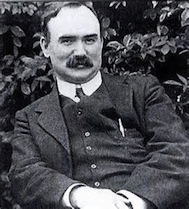
We can agree with Keir, though, about James Connolly’s advocacy of the exercise of Irish self-determination. Connolly, who had always been consistent in this, was able to place those Socialists in the Irish Citizen Army amongst the leadership of the Irish democratic movement in 1916. This was quite an achievement, considering that the working class constituted a relatively small proportion of the population of in Ireland. This situation was, of course, itself a product of the uneven economic development imposed upon the Irish nation under the imperial Union.
Therefore, it is a pity that the SWP was not around when the Socialist Republican, James Connolly Society marches were being held in Edinburgh from 1992. The Labour led city council, the courts, the police, Loyalists and other neo-Fascists were either legally or physically opposing these marches. At the time of the 1993 James Connolly march, the SWP chose to go to the Borders hoping to find a few Nazi worshippers at the site of Rudolf Hess’s wartime plane crash! But, the SWP has been unable to recognise ‘real’ British Fascists, so keen is it to claim that the only problem lies with those German Nazi-influenced Fascists who import their nasty foreign ideologies.
b) The exercise of meaningful Scottish self-determination is the principle, and the break-up of the UK and US/British imperial alliance is the strategy, on which to build an independent class campaign

So, what is the principle, which Socialists should uphold in the lead-up to, and the aftermath of, the Scottish independence referendum on September 18th, 2014? In addressing the ‘National Question’, Keir has taken us quickly through the thinking of four very important Marxists. Yet, this romp provides us with no clarity at all about the principle of self-determination as applied to Scotland.
Keir draws these conclusions. “Therefore, while support for the right of self-determination of the oppressed is a principle, as is the right of workers to secede if they so choose, it does not mean this has to be exercised nor is it the correct choice to make in every historical situation.”
But Keir has already argued that Scotland historically has not been oppressed – so no right of self-determination on these grounds then. Neither is Keir suggesting, that by September 2014, the Scottish working class could have created its own workers’ semi-state based on workers’ councils, which could then exercise “the right of workers to secede”. And, the polling officers are certainly not going to check people’s working class credentials before they are permitted to vote in the SNP government’s referendum!
Yet, once the principle of national self-determination has been abandoned, what are we left with? Keir tells us, “Everything depends on circumstances”. So again, it is all back to that ‘mood music’. And, without any principles or strategy, everything can be reduced to tactics!
Who are the SWP’s tactics meant to impress? Keir makes it clear. “What is desperately lacking in the SNP and the official Yes campaign is any inspiring vision of an independent Scotland leading the fight for serious wealth redistribution to tackle the deep-seated economic and social problems that ordinary people endure” [117]. There is a strong danger in adopting such a stance that the Left in Scotland ends up seeing its role as offering advice to the SNP’s official ‘Yes’ campaign.
The real alternative to this involves making a closer examination of ‘the right of self-determination’. Once the principle of ‘the right of self-determination’ is linked concretely to the strategy of the ‘break-up of the UK and US/British imperial alliance’, this leads Socialists to support for the exercise of self-determination in Scotland. Then, we can develop an independent class campaign, not one that tails the SNP.
Traditionally, those Socialists, claiming to be in the Leninist/Bolshevik tradition, have made a comparison between support for ‘the right of self-determination’ and ‘the right of divorce’. Lenin argued that suggesting “freedom to secede {from a state} encourages separatism, is as foolish and hypocritical as accusing those who advocate freedom of divorce of encouraging the destruction of the family ties.” In other words, any recommendation to exercise that right to secede/divorce is confined to strictly limited conditions.
Lenin then outlines the conditions under which the exercise of this right secession, or ‘national divorce’, is permissible. “They will… resort to secession only when national oppression and national friction make joint life absolutely intolerable and hinder any and all economic intercourse”. If we go back to the analogy Lenin made just before this, about “freedom to divorce” in a marriage, then divorce should only happen, when a husband’s continued physical abuse makes a wife’s life absolutely intolerable, made even worsen by denying her an adequate income.
So, how does this version of national self-determination work, when applied to Scotland? A few British Marxists deny that Scotland is a nation at all, and they claim that Britain is a not a ‘couple in union’ but a single ‘person’. Clearly, if this were true, there can be no recognition of the Scotland’s right of national self-determination. This would amount, in effect, to splitting oneself apart.
Most British Marxists, though, do recognise Scotland’s ‘right to self-determination’, but do not believe the conditions exist here to justify its exercise. Their thinking is based on the sort of analogy Lenin used above, about when it is appropriate to support divorce in a marriage.
However, looking at marriage, and other forms of voluntary union between the sexes today, in the light of the experience and impact of the post-1960’s worldwide movement for women’s emancipation, liberation and self-determination, we can appreciate the limits of Lenin’s understanding of self-determination. His thinking dates from a period when the women’s movement had made considerably less impact upon wider society [118].
Nowadays, it is recognised that many couples’ relationships benefit by separation before their relationship has descended to the one-sided physical abuse, material neglect, which Lenin’s own analogy would suggest, or to the possible mental torture and infidelity [119] he neglects.
There is another aspect of the denial of self-determination, which Lenin’s own marriage analogy does not consider. People in marriages (and looser partnerships today) are also involved in socio-economic relationships with wider society. Thus a husband may use his wife, or she may volunteer to help him in these relationships. Examples might include, where husbands sell their wives’ sexual services to other men, or where both husband and wife become involved in criminal activities, e.g. planned robberies.
When we examine the UK and the wider world, it is very clear that this involves the British ruling class in an exploitative and oppressive imperial relationships, even if nowadays, the ruling class, also has to team up with other ‘gangs’, e.g. from the US and EU to get its way. In the past, British Navy and Army press gangs forced men into taking ‘the king’s shilling’ before embarking on journeys of imperial rapine and slaughter.
However, a subordinate partner may come to realise that these are not such good arrangements after all; even if initially, there appeared to be some shared ‘benefits’, e.g. the distribution of loot from their (imperial) robberies. This partner may decide that she wants to withdraw from this relationship and make ‘a more honest living’.
Today, the movement for Scottish self-determination finds itself in this position. This was highlighted last year when a very substantial minority of SNP conference delegates (probably an actual majority of the party’s wider members) declared their continued opposition to Scotland participating in the world’s no. 1 ‘robber gang’ – NATO. And, in this, Socialists in Scotland and beyond support them. The SNP leadership, in contrast, argued for a commitment to this NATO ‘gang’. That will certainly mean the continuation of an abusive relationship, with renewed demands for the subordinate partner to join in the making of further threats, i.e. by holding on to that Trident ‘club’ too.
And, in drawing attention to this division within the SNP, mirroring the effects of the pressure of the abusive partner and his fellow bullies, we also see the limits of the above analogy. Because, of course, Scotland is not a single ‘person’ or a united nation, but a class divided nation.
c) Self-determination is the Socialist Republican and Communist answer to the alienation we experience under capitalism
 We need to widen our concept of self-determination. This means seeing how it relates to a Socialist/Communist strategy to overcome, not only our exploitation and oppression, but also our alienation. Socialists argue that the ending of capitalist exploitation comes about through our emancipation from wage slavery. We argue that the elimination of capitalist oppression can be achieved through our liberation from capitalist state structures, and by democratising every aspect of our social lives.
We need to widen our concept of self-determination. This means seeing how it relates to a Socialist/Communist strategy to overcome, not only our exploitation and oppression, but also our alienation. Socialists argue that the ending of capitalist exploitation comes about through our emancipation from wage slavery. We argue that the elimination of capitalist oppression can be achieved through our liberation from capitalist state structures, and by democratising every aspect of our social lives.
However, under capitalism, we also experience several forms of alienation. Alienation arises from our lack of control over the work we do, or how we do it. Alienation arises from our lack of control over the products we make or help to distribute. Alienation arises from the destructive relationship capitalism places us in with regard to our natural environment. Alienation arises because we are forced to relate to others through competition, rendering many forms of cooperation impossible.
The ending of the many forms of alienation, which we experience under capitalism, is achieved through our self-determination. In a future communist society full self-determination extends to cover every aspect of both our social and individual lives, or as Marx suggested – a society where the “the free development of each is the condition of the free development of all.”
Therefore, national self-determination is only one aspect, albeit an important one, in overcoming the alienation arising within capitalist nation-states, which are themselves part of the global corporate imperial order.
At present, apologists for the UK state claim that ‘Britishness’ unites the peoples and nations of England, Scotland, Wales and Northern Ireland. However, we experience this unity only in an alienated form. To accept it, we have to be subjects of the Crown, debtors to British Treasury and the City, and support the UK’s participation in British imperial wars.
At the 2012 Olympic Games held in London, the imperial capital, Danny Boyle’s Isles of Wonder was preceded by a Red Arrows display, whilst the Queen featured prominently. The symbolism was very clear and the British Unionist, Labour Party bought into it wholesale. Meanwhile, those Scottish Nationalists of the SNP leadership tried to add some Scottish saltires to the pre-Games warm-up in Edinburgh, as the Olympic torch was taken round the provinces [120]. This, once more, highlights their very limited understanding of self-determination, and their continued subservience before ‘Britishness’.
Left Unionists argue that we should accept the alienation we experience under the UK’s constitutional set-up. Indeed, through the continued support for the official British Labour Party and the existing official Trade Union Movement, they hope we can just forget our alienation altogether, or grow to love it. Otherwise, they claim that the only alternative is to be separated from everyone else in England, Wales and Northern Ireland, because only their Unionist, Imperialist and Monarchist UK can guarantee that unity.
In contrast, as Socialist Republicans and Scottish Internationalists, our answer lies in achieving the fullest national self-determination on an all-round basis. This means trying to set up non-alienated forms of association between the workers of Scotland, England, Wales and Ireland based on a Socialist Republican approach. It also means promoting an ‘Internationalism from Below’ strategy to break-up the alienating UK state and British Empire, and sever our relationship with US imperialism, which alienates us from the overwhelming majority of the exploited and oppressed in the rest of the world.
When Lenin counterposed his ‘proletarian self-determination’ to national self-determination, he appreciated that this could only be realised in a society where workers had already taken power. Clearly though, this situation could not arise, unless independent class organisations already existed, which had the confidence to challenge the capitalist class for power.
We still have to develop those independent class organisations. It is their absence, today, which has led to so much demoralisation and despair amongst the working class, and the seeking for false saviours. However, as soon as independent class organisations develop, they will transform the political landscape. This should the number one priority on the Left.
Then we can more effectively counterpose our genuine national self-determination to the British Unionists’ completely alienating UK sham; and to the SNP leadership’s much degraded and alienating Scottish ‘Independent-Lite’. They only want as much ‘self-determination’ as can enhance their class allies’ own power.
Far too often, the leaderships’ top-down bureaucratic divide-and-rule methods, employed in the British Labour Party and British Socialist organisations, mirror the methods of the UK state. This is why the development of independent class organisations means we have to develop new forms of self-determination and association within these bodies too.
In January 1991, the Self-Determination and Power [121] event was held in the Pearce Institute in Govan. Those attending this event understood self-determination in that wider sense of overcoming the alienation caused by capitalism in all aspects of our lives – both social and individual, whether on a class, nationality, environmental, or gender basis. The women’s movement has also been working with a similar wider view of self-determination (or self-realisation) too. Such thinking has the capacity to link up with Marx’s own vision of a communist society where all forms of alienation have been transcended.
Unless we take a wider class view, linking self-determination with opposition to alienation, exploitation and oppression, then the idea of national self-determination ends up getting reduced to abstract legal principles, themselves based on alienated ways of thinking. Thus, self-determination can become equated with documents like the Fourteen Points, drawn up by US president Woodrow Wilson in 1918 [122], or the Atlantic Charter, drawn up by the Allies in 1942, which formed the basis for the purely aspirational Declaration of the United Nations in 1945.
Under ‘Maginot Marxist’ forms of thinking, such an approach gets trapped in other forms of abstract and alienated thinking. These can involve the use of Stalin’s criteria for the definition of a ‘nation’ and attempting to apply Lenin’s limited criteria for the exercise of national-self determination – tick the requisite number of boxes and see if they apply. Resort to such thinking nearly always takes place in a defensive context, where previous practice has been unable to prevent unforeseen situations from arising. This is because these ‘orthodox Marxist’ practitioners remain trapped in their own alienated thought categories, which constitute a barrier to real understanding and effective action.
d) Oppression amounts to more than repression – the modern approach
A new more modern understanding of national self-determination also leads to a fuller comprehension of oppression. Many on the Unionist Left, following the abusive marriage analogy, equate oppression with repression. Oppression, however, involves the effective denial of democratic rights, including the right of national self-determination. This may not take the immediate form of direct repression. You can be fairly sure though, that if any movement for national self-determination develops to exercise this right, the attempt to create fear and the threat of repression will not be far away.
Furthermore, drawing from their Darwinian evolutionary understanding of the natural world, Kautsky’s and Lenin’s notion, that assimilation towards a single common identity in the human world, is the natural and best course for societies to take, has to be questioned. The need for bio-diversity is now very much appreciated; whilst there are growing concerns about the longer-term environmental and human effects, if a few man-made genetically modified plant strains displace the many natural strains.
Thus, although any individual’s desire to assimilate into their new national culture should be supported, integration rather than assimilation offers the prospect of a more culturally enriched society for all. Take a light-heated cultural example on the culinary front. We would all be worse off – both Asian Scots and non-Asian Scots – if assimilation within Scotland led to the loss of Indian restaurants. And, what would those former Indian, but now fully assimilated Scots have gained? We could all eat out at Greggs!

More seriously, though, there are still people around who disparage non-standard English or non-English literature in Scotland, writing it off as parochial. However, we have the poetry of Robert Burns, much of it written in an Ayrshire Scots dialect. This uses the whole range of human experience and nature, and draws its content from over the world. Burns’ poetry has been translated into many of the world’s languages. The sentiments behind “A man’s a man for a’ that” have become appreciated across the globe.
Rural and small town Scottish dialects are also used in the Lewis Grassic Gibbon’s classic Sunset Song. Contemporary Caithness born poet and critic, John Manson, not only writes dialect poetry, he has translated East European, Italian and French poetry into Scots.
Scottish urban dialect writers include the Glasgow poets, the late Edwin Morgan and Tom Leonard and the Cumnock poet, Rab Wilson; Glasgow’s James Kelman the Booker Prize winning author of How Late It Was, How Late and Irving Welsh from Edinburgh (or more accurately Leith!) author of the best-selling Trainspotting.
Those who have written in modern Scots/Lallans, include the poet Hugh MacDairmid, including his classic, A Drunk Man Looks At A Thistle; the playwright and poet, Liz Lochhead, translator of Euripides’ Medea; the songwriter and poet, Hamish Henderson, author of that Scottish internationalist anthem, Freedom Come All Ye, and the first translator of Gramsci into English. The Gaelic language has also produced the poet, Somhaire MacGill-Eain/Sorley Maclean, writer of the An Cuilithion 1939/The Cuillin 1939, a profoundly political poem, European-wide in its scope.
Nearly all of these writers have also been confident dealing with non-Scottish themes. Many have translated work from other languages into Scots. Most have also written some of their work in standard English. Thus, the cultural richness of this diverse language tradition (and so much of it from the Left too) should be quite apparent. Assimilation to standard English writing norms would leave us all culturally much the worse off.
So, using a more up-to-date understanding of the importance of national self-determination, what does this amount to in Scotland today? First, we need to link this back with the UK’s union state form with its Crown Powers, and the British ruling class strategy of maintaining the UK’s role in the world in alliance with US imperialism. The hybrid-British sections of the ruling class have been amongst its staunchest supporters.
Second, we have to appreciate that the SNP leadership’s ‘Independence-Lite’ proposals, although currently rejected by the British ruling class, do not challenge the fundamental basis of the UK constitution, nor US/British imperialism. Neither does ‘Independence–Lite’ constitute genuine Scottish self-determination.
It is only through the exercise of genuine self-determination that we can begin to win better economic and social conditions, not only in Scotland, but all of the constituent nations of the UK and divided Ireland.
The differential impact of the British ruling class’s ability to divide-and-rule has been very uneven. Ireland has historically been at the receiving end of its worst effects. Nevertheless, we have seen that the break-up of the UK state machine would benefit the majority of workers in Scotland, Wales and England too. And, precisely because of the unequal impact of national oppression within the UK, the best way of achieving this break-up is to build an ‘Internationalism from Below’ alliance based on independent class organisation, and to offer solidarity to those on the frontline. Currently that places Socialists in Scotland in a position of some responsibility.
_____________
6) ITS MY PARTY AND I’LL DO WANT I WANT TO
WHY THE SWP CC’S TACTICS ARE BAD FOR YOU!
a) The Right’s Independence-Lite, the Broad Left’s Charter for change tactic or the Rank and File’s socialist republican and ‘internationalism from below’ strategy

It is an indication of the depth of the current crisis in the SWP, that Keir’s pamphlet has appeared some time after that of the breakaway International Socialist Group’s Britain Must Break, written by James Foley. Although Keir’s pamphlet is less comprehensive, his concluding section does go beyond that of James and the ISG. Whereas James offers no distinct political platform for the ISG’s work in the wider movement for Scottish self-determination (particularly within the Radical Independence Campaign/RIC which the ISG initiated), Keir gives us the SWP’s Charter for change.
It is not clear, though, how the SWP intends to use this Charter for change. Will members argue for its relevance as a campaigning tool in RIC; will they link it to the actual wider economic, social and cultural struggles that will inevitably arise; or will this just become another aspirational wish list for the official ‘Yes’ campaign to take on board?
If Keir and the SWP are serious about the fourteen demands of the Charter for change, then there is no way their primary orientation can be upon the SNP’s ‘Yes’ campaign. For, with the possible exception of nuclear power station decommissioning, none of these demands is supported, or is ever likely to be supported by the SNP leadership. Most would also be vigorously contested by the SNP’s business backers, as well as by the British ruling class, the UK government and the US and EU.
The SNP government has clearly put forward its own ‘Independence-Lite’ proposals and is trying to ensure that, through the official ‘Yes’ campaign, the demand for Scottish self-determination is firmly separated from most of our wider struggles. These go against the interests of the SNP’s big business backers. One clear consequence of this is, as we have already seen, that ‘self-determination’ has been reduced to the political reforms that would best benefit a wannabe Scottish ruling class.
Keir puts a strong emphasis on the role of the trade union movement in the current struggle for Scottish independence. Therefore, to help us get a better understanding of the Charter for change and its relationship with official ‘Yes’ campaign’s Independence-Lite proposals, it may help to compare these by using an analogy in a trade union setting, and examining three approaches – Right, Broad Left and Rank and File – in the context of a pay dispute.
Independence-Lite would represent the proposals being put forward by the Right wing union leadership. They have taken stock of the overall situation, and bowed to the strength of employers and the situation on the international market. Nevertheless, they have been able come up with a set of limited demands, which could possibly form the basis for future negotiations.
The precondition for this is that all the members put aside other pressing demands, and no matter how provoked, let the employers impose their will over these issues. The priority is building the maximum support for an indicative vote in a ballot of union members. They hope to win the employers’ acquiescence, if their more limited demands are shown to have enough support. Therefore, not annoying the employers too much takes precedence.
We could say that Independence-Lite represents a £2 a week pay increase, at a time when a £5 rise is needed just to maintain members’ standards of living. Keir has noted that the Right is going to find it “difficult to muster enthusiasm for a Yes vote” for their proposals amongst the members. Why throw your whole weight behind such a campaign, which does not even begin to meet your minimum needs?
The Charter for change, though, represents an alternative Broad Left set of demands. Added together, they amount to a £6 a week pay rise. A major problem, though, is how are these demands, many of which could benefit the members, going to be won? We know that the Right union leaders have been in ‘social partnership’ with government and employers for so long, that they are unlikely to be turned away from their own very limited Independence-Lite proposals.
Nevertheless, like the Right, the Broad Left is ‘realistic’. Only their ‘realism’ is not based on an unquestioning acceptance of the employer’s apparently strong position. Instead the Broad Left is overwhelmed by the fact that although members are willing to contemplate some change, and a minority are even willing to take some action, the majority is still not sure. Some union members also back the Right, arguing that if we jettison some members’ demands now, then we may have more chance persuading the employers in the future.
Therefore, the Broad Left confines its activity to putting pressure on the Right leadership to change its approach. Sometimes the Broad Left is prepared to back more limited members’ action around issues that have already provoked unrest. However, they are more cautious about extending their support to issues they claim could be divisive. The Broad Left is not committed to building a movement, which could take the wider campaign completely out of the hands of the Right.
Meanwhile, the Right uses its control of the union machinery and resorts to more and more bureaucratic manoeuvres to ensure it retains control. They rule some local branch motions, which support the Charter for change, out-of-order. However, they also say that they are going to consult the members about future possibilities, but will only take these up after the 2014 ballot on immediate proposals, since ‘Things can only get better’ after that!
The Right hope that this approach will divert members’ attention away from any of their immediate and pressing needs, and from any commitment to a more radical challenge to the employers now. Privately the Right acknowledge that the members will only get a few crumbs – if they are lucky! However, the Right is looking forward to possible future negotiations held in better quality hotels with luxury room service and high quality recreational provision. Others amongst the Right are already involved in secret negotiations with the employers behind-the-scenes.
Keir and the SWP appear to broadly approve of the Broad Left’s conciliatory approach towards the Right. As a result, they hope to win some immediate supporters for their Charter for change. However, these people could be quickly lost again, when the members become demoralised by employer attacks they had not been warned of, or angry when they begin to appreciate the need for more decisive action, but are opposed by the Right when they want to take any independent action.
A key problem with the Broad Left’s approach is that they are caught in the bind created by the Right’s ballot. The Broad Left can see this as the only door to the possibility of raising their demands in the future, so the Right is effectively calling the shots. The Broad Left has no real long-term strategy, and their thinking is confined to appealing to the middle ground against the Right, mainly within the existing constitutional structures. Therefore, the Broad Left elevate the Right’s tactic [123] – maximising the vote for the ballot – to their strategy. They have to spend a lot of time countering the Right’s charges of disloyalty or undermining the ballot vote.
So, how does a Socialist Republican or Rank and File approach tackle these problems? The Rank and File’s ‘realism’ is based on having a strategy which recognises both the existing strengths of the employers’ position and of the Right, but which understands the contradictions in their approaches. These can provide the opportunities to open up a much broader challenge, beyond the control of the employers and of the official union machine.
First, the employers’ promises of solving the present crisis are becoming less and less believable, especially as they only seek to protect and improve their own conditions, whilst stepping up their attacks on greater numbers of union members, and extending their attacks to others outside the union. Therefore, the Right’s argument that members ‘hold their fire’ for sake of the ballot, and ignore the plight of others, is more likely to be challenged in the near future. When sections of the members take action themselves, they usually quickly drop much of their earlier more cautious, ‘leave it to our leaders’ approach. They become much more critical and want to become directly involved.
A Rank and File strategy would also look beyond the immediate ranks of those involved in current struggle. Seemingly marginal sections of our class – those dependent on specific welfare provision, or migrant workers, currently isolated from other workers – are already facing attacks, and have shown some preparedness to fight back now. One advantage these groups do have is that they are less likely to be policed by union officials. There are also other groups, who although not necessarily all workers, have become involved in campaigns, which challenge the employers’ wider interests. They are interested in making links.
Therefore, the Rank and File approach is, in effect, arguing for an ‘industrial republican’ approach, which involves taking independent action, and drawing wider numbers of those prepared to challenge both the employers and the Right controlled union machine into action.
To those on the Right who say, that by giving every group who takes up struggle our wholehearted support, we could put off others, or make the employers less willing to offer us some concessions, Rank and Filers would answer in the following manner. It is precisely by linking up with theirs and other struggles that we can win wider support on an independent class basis, and begin to develop the type of campaign that could achieve a £10 a week increase.
b) Developing a strategy to achieve genuine Scottish self-determination
So, let us move now beyond this trade union pay claim analogy, and turn to the campaign for meaningful self-determination. The first thing Keir’s Charter for change should have drawn attention to, is the fact that the SNP leadership’s Independence-Lite does not match up to its purported claims. It fails to offer us genuine self-determination. This is a bit like agreeing to take industrial action for a pay claim less than the rise in the cost of living.
Keir’s Charter for change makes no mention of the UK state’s draconian powers. This is why he raises no demand to oppose the Crown Powers. This is a bit like accepting the employers can rewrite any agreements when it suits them, remove union members from their workplaces whenever they like, and use goon squads against members at work or in the streets – and that is just for starters!
The Independence-Lite negotiations will be conducted under the UK’s rules, with British Unionist parties within the SNP negotiating team. This is a bit like having pay negotiations conducted in the employers’ offices, in an atmosphere where open or veiled threats are constantly made, and where the union side has agreed to take some employer supporting negotiators into its team! Therefore, another missing demand is for the convening of a Scottish Constituent Assembly. Such an assembly could draw upon a popular mandate, and if necessary, can call upon and mobilise wider support, when the UK state exerts its pressure.
Furthermore, Socialist Republicans can understand the underlying reasons why, if the referendum were to be conducted today, there is little doubt that the ‘Yes’ vote would be defeated. However, the current situation has arisen because of a combination of two main factors.
The first of these is the less than inspiring economic and social future offered by the SNP government. The official ‘Yes’ campaign makes no meaningful link between the purely constitutional ‘Independence-Lite’ proposals to be voted on in 2014 and the economic reality faced by the majority today. All our current needs are reduced to aspirational demands for the future, after September 2014. This is because, as we have seen, the campaign’s political limits are firmly set by the SNP government’s favoured big business backers. In effect, all we are ‘promised’ is an updated version, in 2014, of Tony Blair and New Labour’s ‘promises’ back in 1997.
The second and flip side to this is the current lack of any concerted working class fight back. There is resistance, but it remains patchy and sporadic. This is the situation, which leads to workers looking to ‘saviours from above’ – whether it be the SNP’s ‘Independence–Lite’, or the prospect of an Ed Miliband Labour government.
In the absence of workers’ self-activity, political options become reduced to choosing between the perceived “lesser of two evils”. Many who support the SNP seem prepared to ignore the role of the present Holyrood government and SNP-run local councils in implementing austerity measures. Many who support Labour seem to have very short memories about the last Labour government, and also ignore the role of Labour councils in Scotland in implementing austerity measures.
So, how do we develop a strategy, when the SNP government currently holds majority support amongst those wanting greater Scottish self-determination? One way to overcome passivity is to give backing now to those who are prepared to take action. Workers involved in self-activity become much more questioning. To make this important political link, we need to argue for our own immediate political alternative – the struggle for genuine Scottish self-determination, rather than tailing either the SNP government’s ‘Independence–Lite’ or the Red Paper Collective’s focus on a future Labour Westminster government.
An increased growth in working class resistance, between now and September 18th 2014, could well change the political setting. However, Socialists should not be just sitting on the sidelines waiting for this to happen. It is very important that Socialists connect with all the struggles, which are actually taking place.

Opposition to the ‘Bedroom Tax’ is not merely a fight against one particularly iniquitous Tory measure. The ‘Bedroom Tax’ is part of a generalised welfare counter-reform offensive, first planned by Tony Blair in conjunction with David (now Baron) Freud. These welfare counter-reforms represent an attack on the whole of our class. Socialists’ opposition should be mounted on this basis, not pretending that it is only the Con-Dem government we face. We should also seek, just as the Anti-Poll Tax Movement did, to link with those fighting in England, Wales and, in this case Northern Ireland also, once again on an ‘Internationalism from Below’ basis. Such a campaign should not be dependent on official structures, although, when these can provide assistance, they should be used.
Similarly, providing support to the vibrant Palestinian solidarity campaign in Scotland, is not some ‘peripheral’ issue, with little relevance to Scottish self-determination. Salmond’s retreat from his earlier more supportive stance for Palestine, towards greater accommodation with Israel, reflects the SNP leadership’s continuing accommodation to the demands of US/British imperialism. This will have further knock-on effects, not least over Trident.
Furthermore, if Socialists constantly promote our own version of genuine self-determination against the SNP’s ‘Independence-Lite’ and Labour’s ‘Devolution-Max’, then the growing awareness of this alternative option, could itself contribute, not only to a change in the political climate, but to giving more confidence to those involved in a widening array of partial economic, social, cultural and political struggles. This perspective, if adopted by the Radical Independence Campaign, is the one that would place Socialists in the best position in 2014, whatever the referendum result.
Could the SNP win the ‘Yes’ vote, on its own terms, in September 2014, i.e. without any wider mobilisations around the concrete issues facing our class? This seems unlikely, but not impossible. A new crisis could seriously damage the British ruling class and its political representatives. This could occur due to the very visible economic and social consequences of a further slide into recession, with no obvious governmental solution on hand.
Or, a crisis situation could come about due to the sudden revelation of some scandal involving prominent establishment or political figures. In these sorts of situations, the current ruling class backed ‘No’ alliance might find it harder to maintain its unity, and to coordinate the wider UK state response. Thus, the ‘Yes’ vote could slip through a hole in the British Unionists’ current fine-mesh, UK constitutional status quo net.
At present, though, the Scottish wannabe ruling class are dictating the terms of the debate within the Scottish self-determination campaign itself. They have rolled back demands they do not like, which were still present at the beginning of the official campaign period, e.g. opposition to NATO. These people have not thrown all their weight behind the SNP leadership’s official ‘Yes’ campaign though. They retain a critical detachment, because they have their own class interests to protect and advance. What they have highlighted is the necessity to maintain independent class organisation if you are going to have any real influence on the course of events. We can learn some valuable lessons from them in the conduct of class struggle!
If the SNP leadership won a ‘Yes’ vote, with its big business backers dictating its policies, then it would enter into negotiations with the Westminster government. The outcome of such negotiations could only amount to a profound disappointment for all those who were hoping to achieve more meaningful self-determination. The SNP government in office would also now be responsible for all the policy areas, previously reserved for Westminster. The SNP government’s class nature ensures that its first priority would be to satisfy its own big business backers. It would also mount the attacks required on our class to meet the demands of the City of London or the EU bankers.
If, however, a militant movement for genuine self-determination developed, drawing its strength from a widening range of working class and other challenges, could there still possibly be a majority ‘No’ vote? Yes, that could happen. However, ironically, that would still place Socialists and the working class in a better position, than a ‘Yes’ vote won on the SNP government’s terms, with worker passivity being a dominant factor. Instead, under these conditions of growing working class self-confidence, the Westminster government would be placed in the position of uncertainty of how to respond. Just ignoring (say) a 35%+ vote based on larger scale mobilisation and action, would not be a viable political option.
But then, how do we actually vote on September 18th? Clearly, if you think strategically, this becomes a tactical question depending on the balance of forces at the time. Thus, there are a number of situations, which could arise by September 18th 2014.
Keir does raise one option, albeit not one he thinks will be likely. He mentions Lenin’s “proletarian self- determination’. But this could only happen if workers were in a position to establish our own power directly. The necessary precondition for this, the existence of widespread independent class organisation, prepared to make such a challenge, does not exist at present – and I do not think that Keir would disagree in that assessment. Socialists are only at a very early stage in building such independent class organisation, although that indeed is exactly what we need just now.
But can it be ruled out in advance, that a substantial movement, not for direct “proletarian self-determination”, but for meaningful self-determination in Scotland, could yet develop? A key feature of such a movement would be its intense suspicion towards the SNP government’s proposed private negotiations with Westminster, heavily loaded in favour of the British Unionists. Many would not necessarily trust a process, which led to negotiations behind their back, and the further dilution of any meaningful Scottish self-determination at the hands of the SNP Holyrood government, its Scottish Unionist ‘allies’, and the UK Westminster government.
This is why raising the issue of a Constituent Assembly, which could take its own action to implement meaningful Scottish self-determination is important. If such a movement developed to the point that it could offer an immediate practical alternative to the SNP’s ‘Independence-Lite’ proposals, then a voting recommendation could be to boycott the official referendum.
However, what if the campaign for meaningful self-determination had not achieved the political weight that it could offer this immediate alternative? Then, it may be necessary to recommend a ‘Yes’ vote, whilst encouraging continued mobilisations beyond September 18th.
In such circumstances, it would clearly be necessary to understand what the implications of a ‘No’ majority vote could be. Growing numbers on the Right would like the opportunity of a ‘No’ vote to impose massive new cuts in social provision and end most universal benefits provision. Labour and the Tories are already in coalition in six Scottish Local Authorities (the SNP is in coalition with the Tories in one). Johann Lamont has given the Scottish Labour Party’s well-named Midwinter Commission the task of looking at those universal benefits, with Ruth Davidson cheering her on. The political consequences of a ‘No’ vote under such conditions, in 2014, could very much resemble the outcome of the ‘No’ vote in the 1979 Devolution referendum.
However, it is only when we come nearer to the actual referendum date, that we will have a fuller understanding of the balance of forces, and the need to discuss the tactical options we face. Our strategy should be the building of a movement, which has real political ambitions.
Furthermore, a lot of liberal, but currently relatively superficial support for the SNP’s proposals and strategy could become demoralised after a ‘No’ vote. Those personal opportunists, who are associated with any possible movement that can enhance their own careers, would also soon leave the scene. Yet, the underlying weakness of the UK state, and the continued international decline in the position of the British ruling class, would remain. Many amongst the Unionist Right and Left thought that, after the defeat of the 1979 Scottish Devolution referendum, the issue of Scottish self-determination had been killed off. They were to be disappointed.
Opposition first appeared within a new Scottish Cultural Renaissance, from the early 1980’s. Its champions were mainly Left in their thinking. Whatever the current ups and downs of support for Scottish self-determination amongst those involved in economic and social struggles, the cultural arena in Scotland is one where such support is likely to progress further.
Socialists should be in for the long haul, and show themselves to be the most consistent in the struggle for Scottish self-determination, especially when others less committed fall by the wayside. The reactionary form of the UK state remains, and the British ruling class sees its future in supporting US imperialism. This is why the exercise of the right of genuine Scottish self-determination is a principle. The purely tactical approach, advocated by Keir and the SWP, though, could lead back to Left Unionists politics – if the immediate ‘mood music’ were to change again, after a ‘No’ vote.
There is one last point, which reveals the lack of any strategy behind Kier’s Charter for change. He does not consider raising the issue of asking for solidarity beyond those who are directly involved in the ballot – in this case the September 18th 2014 ballot for a ‘Yes’ vote. Keir’s pamphlet has the subtitle No to nationalism. But nowhere is there one internationalist proposal in the Charter for change! For Socialists ‘No to nationalism’ should mean ‘Yes to internationalism’.
Keir appears unconsciously to have accepted the equivalent, in the political arena, to that in the economic arena, of the trade union Right and Broad Lefts’ self-denying ordinance, under the current Anti-Trade Union laws. To counter this, we need to adopt a Rank and File political strategy. This means making a wider ‘Internationalism from Below’ appeal to those in England, Wales and Ireland, not directly involved in the referendum, but who have a very definite interest in extending genuine self-determination throughout these islands. This is the solidarity we need to challenge the British ruling class, its UK state and the British Unionist parties. This is why we need a Socialist Republicanand ‘Internationalism from Below’ strategy.
c) Developing the demands to challenge the divisions promoted by British Unionists and the SNP leadership
Once you take in the political “anti-capitalist left”, as well as the “trade union movement”, invoked by Keir, the limitations of the Charter for change become even starker. They do, however, offer a more advanced platform than that originally proposed by the ISG for the RIC [124].
We have already seen that several key immediate policies are missing from the Charter for change. Nowhere is there a demand for genuine self-determination to challenge the SNP’s ‘Independence-Lite. There is no opposition to the Crown Powers, which are also accepted under the SNP’s support for the monarchy. There is no support for a Scottish Constituent Assembly to challenge the SNP government’s placing ‘independence’ negotiations in the shared hands of SNP and Unionist MSPs.
Nowhere is the demand for secular education mentioned. In a society, where leaving education and schools in the hands of religious hierarchies or self-appointed religious ‘representatives’ has led to sexual abuse of children and discrimination against and abuse of women, the provision of secular schools is an important issue [125].
Furthermore, it seems that both British Unionists and Scottish Nationalists, along with the Catholic hierarchy, want to promote the belief that Scotland is blighted by engrained religious sectarianism. Attempts to project the struggles of Scottish Presbyterians in the sixteenth and seventeenth century, in a world when they were often at the receiving end of repression, to the present day, actually disguises the real problem [126]. Today the problem we face is anti-Irish racism. Catholic Italian and Polish Scots have not been the targets of Loyalists (unless they wear Celtic tops and scarves!) There are also serious social effects to all this. Pre-demotion Rangers Celtic games led to a weekend spike in domestic violence directed against wives, partners and children of both sets of fans.
However, raising the issue of anti-Irish racism means addressing the implications of past discrimination against migrant Irish workers and their families in Scotland; the UK state’s support for national partition in Ireland; and since the Good Friday Agreement, its constitutional underpinning of social partition in Northern Ireland. British troops, including Scottish regiments, continue to be stationed there. It is this background that best explains those conflicts in Scotland’s Central Belt, misleadingly named ‘sectarianism’. This, of course, is not something the SNP leadership wants to confront either – Scottish regiments are so wonderful after all!

These issues all need to be addressed. The Orange Order and the Loyalists in Scotland encourage support for the most reactionary aspects of the UK state and ‘Britishness’ – the monarchy, an established or privileged role for Protestantism (with its exclusive ethnic rather than inclusive civic idea of who constitutes a nation), and idolisation of British militarism. Their marches are organised as triumphalist events, often associated with attempts to intimidate. Nor, should it escape anyone’s attention that the Orange Order and the Loyalists are vociferously opposed to the exercise of Scottish self-determination. Some are prepared to take the type of action that the state cannot be publicly seen to take part in.
Furthermore, whilst over economic issues, the SNP has tried to triangulate its policies to the Left of Labour, this has not been the case over social issues, such as gay rights and abortion. Here it has triangulated its policies to the Right. The SNP has manoeuvred to get the Catholic hierarchy’s, and Islamic religious organisations’ support, to try to undermine their traditional backing for the Labour Party.
Arguments opposing the raising of such issues can be anticipated. The claim will be made that they lead to division. However, not raising them, means that the groups effected will continue to endure the economic and social divisions created by the British Unionist state and its reactionary allies. There is no real alternative to offering solidarity to all those effected, if the people of Scotland are to make substantial progress and overcome the baleful legacy of economic and social division promoted by the UK state and the British Unionists, many of which are often accepted by Scottish Nationalists too.
This means trying to draw those neglected by the official ‘Yes’ campaign into our own wider-based alliance. This means prioritising the building of an effective independent class campaign, over the illusory desire to win a ‘Yes’ majority by accepting the arguments that such campaigning holds back a maximum ‘Yes’ vote. For every Right wing vote gained in such a manner, there will be others lost to a campaign for genuine self-determination for all people living in Scotland.
In his Charter for change, Kier shows some awareness of the problems involved in an uncritical support for state nationalisation. He adds “democratic social control” to the demand to “nationalise all the banks”. After all, the banks are virtually nationalised now – only under the banksters’ control!
However, this more critical awareness is dropped in Keir’s demand to ”Defend the welfare state”. The ‘welfare state’ comes in two parts – the ‘welfare’, or that component of our income made up by our social wage – education, health, housing (benefits), pensions, unemployment, sickness and disability benefits. However, the other part – the ‘state’ – comes along with a top-heavy bureaucratic apparatus, with its priority of jumping to the beck and call of their political bosses, and maintaining their own privileges (e.g. massive pay-offs followed by a return in well-paid consultancies).
Senior managers act as conduits for the demands of government and private employers – that is now part of their job description. That means imposing managerial directives that prioritise profit making and business methods of control. This is done to minimise attempts to provide welfare on the basis of social need. Democratisation needs to be extended to those social services under the state’s bureaucratic control.
Furthermore, support for differing forms of British Unionism, or for degrees of for Scottish Nationalism, have become strongly entrenched amongst these state managers. This is one reason why the battles between Labour and the SNP over state patronage have been so fierce. Their interests are not ours. When managerial grades become members of trade unions, they frequently try to limit the union’s activities. They pay particular attention to the protection of their privileged positions.
It is unlikely though, that Keir’s demand to ‘Defend the welfare state’, as opposed to ‘Defend social security’, is an oversight. This demand appears to be designed to appeal to that existing social democratic understanding prevalent amongst many Labour and ex-Labour members and supporters.
We can tell this, when we see Keir’s demand to ‘Repeal the Tory anti-trade union laws’. New Labour enthusiastically implemented these laws over a 14 year period! There is not the remotest chance they would be opposed by a future Ed Miliband Labour government either. They are now Tory and Labour anti-trade union laws. Neither have they been evenly targeted at all union members. Union leaders have been able to improve their pay and perks, whilst these laws have been in force; members have faced substantial losses over jobs, pay and conditions.
And, when it comes to campaigning, where is there any suggestion of extending this to England, Wales and Ireland, to challenge the bureaucratic ‘internationalism from above’ campaign of the British Unionists? Even Alex Salmond has made a pitch in London, for support for the SNP’s ‘Independence-Lite’ and upholding (some) good old British welfare state traditions!
Therefore, a Rank and File, Socialist Republican and Internationalism from Below strategy would amend some of the demands in Keir’s Broad Leftist Charter for change, and add others.
d) Developing the political organisation we need to challenge the British ruling class, its UK state and the Scottish wannabe ruling class and its SNP leadership backers
There is one last important consideration when it comes to developing a strategy for achieving meaningful self-determination, which can respond to the rapidly changing circumstances we are likely to face. This means looking at the type of organisation we require.
Yes, we want support from trade unionists, although primarily from the rank and file. What would it require to transform existing trade unions into the sort of organisations we require? All officials should be regularly elected and on the average pay of the members they represent. Then, their interests would become directly tied to their members’ interests. Officials’ pay and expenses should be subject to rank and file trade unionists’ scrutiny. No officials should be appointed to outside organisations run by the state or employers, unless elected by the members. Effective sovereignty in the union should lie with members in their workplaces, not in the union head offices.
There may also be occasions when existing unions have become so corrupt, or have failed to extend organisation to sections of workers, that the formation of new independent unions is the answer. This possibility cannot be ruled out on the grounds of maintaining a spurious trade union unity [127].

However, in his introduction, Kier also looks beyond the “trade union movement” to “the anti-capitalist left”. How, should our wider political forces organise though? Now, that the Radical Independence Campaign has been formed, this has become a more pressing issue. To begin with, it looked as if the RIC might just involve a group of people brought together by the ISG to form another front organisation. However, the ISG is having its own internal debates, and looking to better ways to organise.
Furthermore, demands were raised for the RIC to be democratised. This has meant the creation of active branches run on democratic lines. These could form the basis for a national democratic structure for the RIC. Other campaigning organisations could affiliate too, whilst the RIC could affiliate to other campaigns, provided they are themselves democratically organised. There are indications that this is now the organisational direction that the RIC may take. But, more still needs to be done if the RIC is to become the sort of organisation that can meet the initial aspirations of many who attended the national launch in Glasgow’s Radisson Blu last November 24th.
Fortunately, at the moment, there is no evidence that the SWP wants to set up its own front organisation over this issue. Given, its recent Left Unionist past, perhaps that is not so surprising! Furthermore, those SWP members, who are beginning to take a more critical attitude towards their Party’s methods, will perhaps better appreciate the hostility of other Socialists and other workers to the SWP’s Party fronts.
Other Socialists can easily spot the characteristics of an SWP front. They have no democratic and accountable structures. The SWP’s Central Committee (CC) determines their national activities. The role of SWP members in these fronts is not to think for themselves, or to engage meaningfully with others. The role of SWP members is to act as a transmission belt for decisions already made by the CC, and passed down through its appointed local organisers.
So, instead of that triumphalist clapping accompanies by jeering at others, which we have so often witnessed at such Party-front events, when the SWP manages to impose its will on the others by dubious methods, Socialists should welcome the opportunity that challenging debates present to us to stimulate our own thinking. A challenging debate is not one dominated by one person after another parroting the latest handed-down line, nor by hearing one report after another lauding “brilliant” activities; but one where participants are made to think outside their usual comfort zones.
Other people, usually trade unionists, have been invited to join SWP fronts, in a similar way that the SNP leadership has invited non-SNP members on to its official ‘Yes’ campaign’s National Advisory Board. Broad Left union leaders are particularly welcome in SWP circles. They can ‘talk Left’, even whilst they ‘walk Right’. They like the opportunity the SWP gives them to brush up their Leftist credentials in public gatherings. They are less keen to mobilise their members in other than token actions. They do not like to be politically challenged. Indeed, their aim is usually to avoid this at all costs.
Thus, there is an urgent need to provide an alternative to sectarian and opportunist methods (the two often go together). The SWP is not alone in this; it just provides a particularly blatant example. In contrast to such Party-fronts, Socialists need to begin with a shared commitment to democratic methods.
Debates are needed to decide upon the immediate policies and tactics to be used in campaigning. Key decision-making should be taken, not behind the scenes, nor left to office bearers, but at plenary events. Therefore, an open democratic space, where different viewpoints can be aired, needs to be developed. We need to appreciate the value of debates, which can lead to a new synthesis at a higher level of agreement. This would also help develop a tradition of genuine friendship, comradeship and solidarity.
A clear distinction needs to be made between the principles and demands used in a campaign over immediate issues, and the longer term aims of participating organisations. Demanding that the RIC adopt a Socialist or Communist label or platform would certainly be both divisive and unnecessary. Such ways of thinking, though, have not been a feature of SWP practice. Instead claims are made that it is not at all necessary to raise a Socialist profile at all (apart from individual recruitment to the SWP). The sort of argument first raised in the SSP has been resurrected – “Look, we agree over 90%, so let’s just ignore the 10% where we disagree”. Almost inevitably, it is by ignoring that 10%, that unforeseen situations arise, which overwhelm an organisation – the SSP being a classic recent example [128].
So what is the Socialist Republican and Communist alternative to SWP leadership methods if applied to the RIC? We should positively encourage discussions and debates between those participating who hold to different politics – Anarchist, Communist, Feminist, Left Green/Environmentalist, Left Nationalist, Radical Democrat, Socialist and Socialist Republican.
Thus, the open democratic space for decision-taking debates over immediate policies and campaigning should be extended to organising forums where such different viewpoints can be aired. Clearly, those advocating different approaches should not demand that their particular strategy form the exclusive political basis for campaigning. The relevance, or otherwise, of such political approaches, will be demonstrated through their ability to provide some useful guidance over the immediate demands and activities of the campaign.
Attractive day schools could be organised, using workshops and report backs and follow-up socials [129]. Publications could even be produced that highlight different political approaches so that informed debate continues outside such arenas. Modern information technology can also sustain such discussions in a number of ways.
And, what ideas would Socialist Republicans and Communists wish to have aired within the RIC? An understanding that capitalism is currently facing a multifaceted crisis moulds RCN thinking. At present the exploited and oppressed are witnessing a worldwide retrogression in living conditions, understood in their widest sense. Employment is in ever more precarious forms of work. The social wage is being depleted. Throughout the world there are new ‘enclosures’ and ‘clearances’ (of which one of the intentions behind the ‘Bedroom Tax’ provides an example). We face continued dilution of our civil rights alongside ever increasing state surveillance. We suffer from growing environmental degradation and never-ending wars.
The RCN would argue that there has never been a better, or a more necessary time, to outline what a Socialist Republican and Communist alternative could look like, based on the further development of real social forces in existing society. This is why we see an important link between meaningful Scottish self-determinationand a socialist/communist transformation of society. We argue that it is necessary to make this case publicly, so we can end the alienation, exploitation and oppression we are currently experiencing, and which the current capitalist system threatens to make even worse.
However, there is no intention to impose such beliefs on organisations campaigning for immediate demands. We would like to hear stimulating ideas from others, and will take heart from being part of wide-ranging discussions, which can help to create the preconditions for a real challenge to the current capitalist crisis-ridden order. It would set an excellent precedent if the RIC became such an arena, and therefore formed a step on the way to create that network of independent class organisations we so desperately need.
_____________
This review has concentrated on some of the contradictions of Keir’s pamphlet. Simultaneously riding the two horses of British Left Unionism and Scottish Left Nationalism is not something one can do without eventually enduring a painful split. It can be pursued for a limited period of time. After all, the SNP is currently riding the two horses of Scottish Nationalism and British Unionism, yoked together by the monarchy, the Crown Powers, the British High Command, NATO and the City of London. However, this pairing is likely to fall apart at the hurdle of the 2014 referendum – if not before.
The contradictions in Keir’s pamphlet need to be resolved in an open democratic fashion, since they include the type of arguments that will be encountered from both Left Nationalists and Left Unionists. This review is a contribution to that end. It would represent a welcome step forward for all Socialists in Scotland if, as a result of the crisis enveloping the party, SWP members emerged who are prepared to engage in these wider debates in a constructive and comradely manner.
Allan Armstrong, RCN, 23.3.13 (with amendments from Bob Goupillot, RCN, 17.4.13)
[1] Sometimes, the SWP will back these pamphlets up with a more theoretical explanation in its International Socialism magazine, particularly for the benefit of longer-standing members, who have to confront more sophisticated arguments from other Socialists.
[2] Back in 1979, the SWP had even opposed Labour’s Scottish Devolution proposals, something the old Communist Party was committed to, and the CWI (Militant) had accepted (after the STUC gave its support). They saw Devolution as being a necessary reform, before the journey along a ‘British road to socialism’ could be resumed. However, after the bitter experience of Thatcher-style British Unionism, from 1979, the SWP fell into line with the majority of the British Left in Scotland and went on to support New Labour’s 1997 Scottish Devolution proposals.
[3] There has long been some ambiguity on the British Unionist Left about the full extent of their chosen state. Is it just Great Britain or is it Great Britain and Northern Ireland? This ambiguity is present in Keir’s pamphlet too.
[4] The successor organisations coming out of the ISM include Frontline, which acts as sort of ‘Continuity’ ISM, and which gives support to the SSP; and the Democratic Green Socialists, who joined Solidarity.
[5] However, to be fair to the SWP, unlike the CPGB-WW, it has always recognised Scotland as being a nation, and unlike both the AWL and CPGB-WW, it has not provided a theoretical cover for Ulster Loyalism.
[6] See
[7] Donald Anderson is less forgiving of Neil Davidson because of his previous prominent role in supporting British Left Unionist politics in the SSP. Indeed, although Donald was particularly enthusiastic about Tommy Sheridan, recognising him as one of those ex-ISM members furthest along his desired Scottish Nationalist road (along with Tommy’s ex-Labour ally, Hugh Kerr), it was the presence of the then Left Unionist SWP within Solidarity that ensured Donald did not join up.
You get the distinct feeling, though, that if Donald and Tommy had not created quite such a ‘reputation’ for themselves, they both might have been allowed to join the SNP, like Hugh Kerr (from the Labour Party via the SSP, Solidarity and the Greens!)
[8] The issue of Glasgow and slavery and opposition to slavery is well dealt with in It Wisnae Us, a title that could have been drawn up with Donald in mind!
[9] See http://www.journal-online.co.uk/article/2694-academics-point-to-scotlands-role-in-slave-trade
[10] Oppression is linked with another important feature of all class societies – exploitation. Exploitation is the extraction of a surplus from subordinate classes to the benefit of another class/es. However, there can be no effective exploitation without oppression, so these two are closely linked.
There is a third concept, alienation, which is also useful in making a more rounded assessment of class societies. This later will be dealt with later when addressing the issue of self-determination.
[11] ‘Nationality’ is an ambiguous word in the English language. It can refer to all the people living within the territorial bounds of a particular nation, or to those belonging to a particular cultural group. This review will draw a distinction between these two. Ethnicity is a cultural category covering specific ethnic or ethno-religious groups, whereas a nation is a category that incorporates all those people living within the national territory, whatever their cultural background.
[12] The capitalist class, though, never gives up on its class war. Their competitive drive for profits ensures this. If they don’t screw us, somebody else will screw them. That is the nature of the capitalist beast.
[13] Surplus value is the form of surplus produce extracted from workers under capitalism, which is then divided amongst different sections of the capitalist class as profits, rent and interest.
[14] See section 6b
[15] Nationalist modes of thinking are openly accepted by Scottish Nationalists, and by many mainstream and further Right British Unionists. However, this is unacknowledged in the thinking of much of the British Unionist Left. This also contributes to that bizarre claim sometimes made by British Unionists (including those on the Left) that it is only the Scottish Nationalists who are Nationalist, but being British raises you above being a Nationalist!
[16] Of course, at this time, the ‘lower orders’ exercised no say in the constitutional or other matters of state, either in Scotland or England. However, they made their opposition known in riots in Edinburgh and other cities. The most radical wing of the Covenanters, who had led the resistance to Stuart absolutism in Scotland, opposed the Union. See Beyond Broadswords and Bayonets, a review of Neil Davidson’s Discovering the Scottish Revolution, 1692-1746, in Emancipation & Liberation, no 5/6.
[17] Keir mentions the earlier activities of the ‘British Undertakers’ from Scotland in Ulster before the 1707 Union. However, the activities of the various wings of the Covenanting Movement throughout the seventeenth century caused major problems both for the English Republicans to their Left, and the Stuart UK regime to their Right.
Scotland itself was divided between Covenanters, and on the other side, first the Episcopalians, later the Catholic James VII, and lastly the Jacobites. The leaders of the latter three groups provided a Right challenge to the Covenanters, William of Orange and the Hanoverians. It was not until the 1707 Act of Union that a Scottish-British ruling class, united with some common purpose, really began to make headway, and even then their position was not cemented until 1746.
[18] The Union flag, which was quickly amended in 1707 and 1801, to take in the saltires of Scotland and the Anglo-Irish (the St. Patrick saltire was never seen as a wider Irish symbol – that was the harp), the better to celebrate newfound British ruling class unity. However, it has not been amended to take on board later constitutional changes, which were largely forced on them by challenges from below.
Perhaps, a more suitable Union flag today would be quartered, with the English royal three lions passant, the Scottish royal lion rampant, the Welsh royal (Llewellyn crest) four lions passant, and a Red Hand of Ulster with some fingers chopped off to indicate the loss of 3 Ulster counties! The continued use of a now completely inappropriate Union flag (with its continued claim over Ireland, and denial of the existence of Wales) symbolically points to the conservative nature of the UK.
[19] The Liberal section of the British ruling class, at the time, if they ever gave it a thought, probably thought that Scotland and Ireland would assimilate to being British, in the way they thought the Welsh had. However, even in the case of the Welsh, such a viewpoint could only be entertained, because the vast majority of the Welsh, especially those speaking the Welsh language, were confined to the ‘lower orders’ and had no political voice. The old Welsh ruling class had indeed long ago assimilated as Anglo-Welsh.
[20] Some Radical Liberals kept elements of this programme alive, but like the Left within the Labour Party, in the next century, they were increasingly marginalised.
[21] We should be careful, though, when characterising such movements as ‘sectarian’. This suggests a primarily religious motivation, when in reality, the prime motivation of many such organisations was racist, e.g. anti-Irish, and anti-Gael.
[22] The continuity between the old Liberals’ ‘reform the Union and accept the British Empire’ Home Rule tradition and today’s SNP ‘reform the Union and accept the existing global corporate order’, are further explored in my essay in Unstated – Writers on Scottish Independence, edited by Scott Hames.
[23] Many of these convicts were transported for offences against property, especially in the context of enclosures in England and Wales, and clearances in Scotland and .The Famine’ and evictions in Ireland.
[24] This is not to forget the many thousands of ‘native troops’ utilised by the British Army, who also lost their lives in these wars. The indigenous peoples from the colonies were hard hit twice over – first fighting against British imperialism, then fighting for British imperialism! This pattern had even been anticipated inside the Union, in the transition from Jacobite-supporting warriors to members of the Highland regiments of the British Army.
[25] Indeed, there is no other country in the world to compare with Ireland. Ireland still has a lower population today, compared to that of 1847.
[26] Children have a remarkable capacity to learn what is required of them. This does not usually lead to blind obedience in schools, but to split social and cultural practice – one language for the classroom, one for the playground.
[27] This became very clear in Wales, when the Blue Books, a Westminster parliamentary enquiry into the disturbances so prevalent there at the time, placed much of the blame on the Welsh language!
[28] See, From Davitt to Connolly, the ‘Internationalism from Below’ challenge to the UK State and British Empire, 1879-95, by Allan Armstrong, to show the influence of the land struggles on the early Socialism and ‘New Trade Unionism’.
[29] See http://social.decomworld.com/projects-and-technologies/whatever-happened-uk-storing-carbon-abandoned-north-sea-wells
[30] And widening this campaign could prove very necessary. Labour’s Welsh First Minister, Carwyn Jones, has suggested that Trident be transferred to Milford Haven in Pembrokeshire to ‘create jobs’! The very worst traits of British Unionism can usually find their British Labour advocates!
[31] Some senior military officers can see that consecutive UK governments’ costly support for imperial posturing undermines some of the other military spending they would prefer.
[32] The Church of Scotland was not officially established. Nevertheless, it received the effective backing of the House of Lords during the 1843 Disruption, which was partly targeted at the continuing operation of patronage, which benefitted the large Scottish landlords in particular.
[33] There is less consciousness of being English-British amongst people living in England. This is because the English make up over 80% of the total population of the UK. So, for many, the terms ‘English’ and ‘British’ have become interchangeable. Sometimes you can see the pained realisation that this is not necessarily the case, when football supporters from Scotland and Wales refuse to accept that the Scottish and Welsh teams are, in effect, English reserve sides. Offence is taken when Scottish or Welsh fans do not transfer their support to England, when their teams have been knocked out of any international competition!
[34] Welsh landlords were allotted no specific representation in the House of Lords. However, most of the leading landlords in Wales, even if of distant Welsh origin, had assimilated into the dominant English culture. Some of these Anglo-Welsh landlords did hold seats in the House Lords.
[35] Indeed, it was not until the creation of the Scottish Parliament (and its non-subjection to the House of Lords), after 1997, that the last features of feudal land tenure (2000) were abolished and an opening made for communal land buy-outs (2003) in Scotland.
[36] First England (with Wales incorporated) and Scotland from 1707; then Great Britain (England and Scotland) and Ireland from 1801; then Great Britain and Northern Ireland from 1922, to England, Scotland, Wales and Northern Ireland from 1997. Wales has been upgraded from former provincial status to a nation. Northern Ireland remains a province, but has been given some of the Devolutionary powers, associated with the nations within the UK. Northern Ireland’s anomalous situation arises, of course because, under Partition, it has been separated form the Irish nation.
[37] This is one reason why particular ethnic community and religious charitable organisations often attempted to fill this role.
[38] There was also a small but significant in-migration of particular skilled workers from Scotland, some of whom would have had Orange connections.
[39] There was also a significant in-migration of Protestant Irish-British workers, many of whom would have had Orange connections.
[40] The situation was even more complex in Liverpool, because there were also significant amount of Protestant Irish-British, Lowland Scottish and Welsh (including many Welsh language speakers) in-migration.
[41] With integration ethnic groups maintain their specific cultural identities for family or community purposes whilst in all other respects becoming citizens of their nation-state, sharing common legal rights. With assimilation ethnic groups lose their previous identities and become citizens sharing the culture of the majority.
[42] The fact that James Connolly and James Larkin were born in Scotland and England, not Ireland, did not prevent them from being on the receiving end of numerous Unionist and Loyalist attacks (to which could be added attacks from some employer-backed Irish Catholic sectarian organisations too!)
[43] Of course Northern Ireland had its own highly repressive Special Powers Acts, which was on the statute book from 1922 to 1973, when they were taken over by Westminster under the Tories, when Stormont was abolished. This N.I. Special Powers Act was the envy of the South African apartheid government!
[44] Labour also managed to win back control of West Dunbartonshire and Renfrewshire, where the previous SNP administrations had tried to implement cuts in the face of either trade union or community opposition; whilst Labour increased its number of councillors in Aberdeen and Edinburgh, thereby retaking outright control of the first city, and only reluctantly joining a coalition with a depleted SNP in the second, after being rejected by their first choice there – the Tories!
[45] This was quite an achievement, when it is remembered that Labour simultaneously fought off a challenge by both the SNP and Glasgow First. Glasgow First had been formed by those increasingly marginal old-style Labour councillors whose politics amounted to little more than local clientilism, which provided them and their close supporters with various perks.
Official Labour councillors, however, supported a much more thoroughgoing alliance with big business interests. This allows for the promotion of much bigger projects (including Glasgow leader, Gordon Matheson’s recent abortive vanity project to revamp George Square). Deals with the large-scale corporate business sector provide considerably better financial rewards, more junkets and bigger perks for councillors.
[46] Neither are the SNP exempt from such ruling alliances. They are in coalition with the Tories in Dumfries and Galloway.
[47] Yes, on social issues, the pre-First World War Liberal Party had a considerably better record than today’s New Labour.
[48] Thanks to James Foley of the ISG for pointing this out (see Britain Must Break, p. 73).
[49] Apart from the short and unsuccessful interlude under Right-winger, John Swinney (2000-4), the SNP Chairmanship has passed to self-declared social democrats. Alex Salmond was Chair between 1990-2000 and resumed this position in 2004. Nicola Sturgeon, currently Depute Chair, is being groomed to succeed him.
Salmond, though, backed John Swinney for Depute leader, in the face of an already fading Left challenger, ‘Republican Rose’. Roseanna Cunningham. Following the path of so many former Left social democrats, she has fully made her peace with the SNP’s Centre leadership and has even courted the Right over the issue of gays.
[50] Tories and other conservative parties may, when the working class is better organised and providing a political challenge, concede certain economic and social reforms – but this is usually done reluctantly. Conservatives think that capitalism should benefit the traditional ruling class, the bosses and others who are seen to be the winners in the marketplace. ‘Plebs’ should be content to have a job and make the most of the periods of consumer boom. But we should also know our place and accept cutbacks in our living standards, when booms turn to recessions, or when we individually fall by the wayside through unemployment, invalidity, long-term sickness or old age.
Left social democrats, on the other hand, believe that increased regulation of the economy by the state, and ever-expanding economic and social reforms will, in themselves, bring about the transition to socialism. They see the enlarged role of the state not as state capitalism, but as constituting the essence of socialism. However, when post-war profit levels declined in the 1970’s, the majority of the capitalist class launched their neo-liberal counter-offensive, beginning in Chile, and extending to the UK and USA under Thatcher and Reagan. Left social democratic illusions in the near inevitability of state-led ‘socialist’ progress received a severe denting.
[51] This is also probably a strong reason why Hollande has taken a leaf out of Tony Blair’s book, and involved France in a diversionary war in Mali. There are, of course, other reasons for involvement in this war, which New Labour would also instantly recognise – maintaining corporate control over valuable minerals, providing the arms industry with a boost, and creating an atmosphere in which Muslims living in France can be scapegoated.
[52] See A tale of top storeys, basements and escalators on http://republicancommunist.org/blog/2012/09/16/britain-must-break-to-defend-real-labour-or-the-break-up-of-the-uk-to-advance-republican-socialism/
[53] Most, of course, did not pay their full taxes, and some virtually none at all. Mandelson had to resign government office twice over allegations of financial impropriety. He has continued to maintain close contact with several decidedly dodgy business figures. He also had the backing of the Chinese government for leadership of the IMF, and of David Cameron for leadership of the WTO!
Compare this ‘trickle down’ to the vast sums of lightly taxed or tax-avoided money ‘gushing upwards’ towards the bankers’ own pockets, and to finance the banks’ various international activities – many themselves illegal or criminally destructive.
[54] The last organised Left group in the SNP was the Socialist Republican Liberation. Some of its key members joined the SSP. The fact that, even without an organised Left, those opposing the SNP leadership’s dropping of party’s anti-NATO policy nearly succeeded, at last October’s party conference, is an indication of the extent of the Rightwards leap taken by the SNP – its ‘Clause 4’ moment.
[55] These factors have also made it easy to incorporate former traditional Right-wingers. Indeed, the less influential and more honorary post of SNP President has usually been given to the Right. The Right also have prominent positions in the SNP leadership and the Scottish government.
[56] The debate over NATO membership at last October’s SNP conference may appear to contradict this. However, as with Blair’s overthrow of Clause Four, at the 1994 Labour conference, the SNP leadership probably wanted a more public debate, to publicly draw attention to those that mattered, of the extent of their commitment to crush the opposition.
[57] The recent sad and premature death of Stephen Maxwell can be taken as representing the end of the real influence of such activists in the SNP. Stephen was consistently on the Left social democratic wing of the party. He was also an internationalist.
[58] Back in 2007, Salmond met the Queen at Balmoral. The outcome of their discussions were never revealed, but the SNP soon moved to a pro-monarchy stance, whilst Salmond has developed a sycophancy towards the Queen that makes Johann Lamont look like a closet republican! (See http://republicancommunist.org/blog/2012/06/05/pass-the-sickbag/)
After meeting Salmond, Donald Trump was able to get the SNP government, and SNP local councillors to railroad through his controversial golf course complex on the Menie Estate in Aberdeenshire. Salmond has also been involved in meetings with the equally odious Rupert Murdoch. In these two individuals’ cases, New Labour had set a precedent, with former Scottish First Minister, Jack McConnell meeting Trump, whilst Tony Blair developed a close relationship with Rupert Murdoch.
[60] There are certain terms, such as united front and popular front inherited from the Trotskyist tradition that the SWP still uses. However, for readers not so familiar with this tradition, a united front can be seen as a principled and democratically organised coalition, designed to develop independent class organisation. A popular front is a bureaucratically organised stitch-up in which working class organisations give their support to the immediate aims of another class and downplay our own independent class demands.
There is also another type of front, not widely acknowledged in the Trotskyist tradition – the Party sect front – because so many of its adherents utilise it themselves. The SWP and Socialist Party have been particularly fond of this method of organising – think Anti-Nazi League and Unite against Fascism, the Right to Work Campaign and Unite the Resistance; think Campaign for a New Workers Party and the National Shop Stewards Movement.
[61] This is also well dealt with in the chapter entitled Shiny Happy People in James Foley’s Britain Must Break (pp. 4-6)
[62] Indeed, the official ‘Yes’ organisers’ very public politeness has impressed some political campaign veterans, who have only experienced the notorious brusqueness of Labour Party officials, in their handling of others in any campaign! SSP leadership figures can remember the ‘welcome’ they got when they tried to join Labour’s ‘Yes, Yes’ campaign in 1997. Obviously, Labour still has some way before it takes on the latest up-to-date ‘happy-clappy’ public relations techniques. The election of Johann Lamont as Scottish Labour leader was not designed to speed up this process either!
[63] Former Left, Kenny MacAskill, in particular, played his Aneurin Bevin role for the party leadership. He cleared the road for the SNP Right to retain nuclear weapons in Scotland.
[64] Margaret Thatcher, Tony Blair and Gordon Brown were earlier beneficiaries of the IVLP.
65 Thanks to James Slaven of the James Connolly Society for bringing the information in this paragraph to my attention.
[66] See Treasure Islands – Tax Havens and the Men Who Stole the World, Nicholas Shaxson
[67] Some on the unrepentant Tory neo-liberal Right support such competition, even within the UK, since it would contribute to a driving down of costs, particularly labour costs. This is also one reason why we have recently seen the Tories taking up the idea of ending UK-wide public sector pay rates, in favour of new competitive regional and local pay rates.
[68] SNP infatuation with Scottish regiments has a long pedigree, especially amongst its old Right Populist wing, preceding the rise of the new Social Democratic wing of the party. These are the regiments of the British army that have served British unionism and imperialism from Culloden to Crossmaglen, and from the Heights of Abraham to Helmand Province.
[69] The reason for extending such a campaign to the whole of Ireland becomes clearer when we understand the British and Irish ruling classes’ shared political and economic strategy for these islands.
[70] Neither should an international campaign be confined to these islands, particularly in the context of generalised European austerity, and the EU bureaucracy’s active intervention in the political debate here. However, there is the problem of the lack of any serious Left European unity. The European Anti-Capitalist Alliance is little more than a diplomatic pact between the SWP (and its European affiliates) and the United Secretariat of the Fourth International. It has organised no real solidarity actions for those workers in Greece, Spain, Portugal, Ireland, Italy, and now Cyprus, who are facing the European bankers’ (backed in this respect by The City) draconian austerity measures.
[71] For a fuller historical account of British ruling class strategy and the opposition it has faced see:- http://republicancommunist.org/blog/2012/01/11/internationalism-from-below-2/
[72] The British ruling class dealt with the initial rise of Plaid Cymru and the SNP in the late 1960’s with one of their classic delaying responses – a Royal Commission. The 1969 Crowther Commission produced the Kilbrandon Report more than 4 years later, then it was allowed to gather dust!
[73] The fact a serious Irish Republican challenge emerged can be laid at the feet of the failure of the British ruling class and its UK state to seriously address the Civil Rights Movement’s demands to reform Northern Ireland. Instead, they conciliated ‘No Surrender’, ‘Just Say No’, Ulster Unionism and turned to physical repression. British troops’ action in Derry on Bloody Sunday, January 30th 1972, effectively marked the transition to the Republican phase of the struggle.
[74] Indeed the Republicans threatened to overturn Thatcher’s earlier claim to make “Northern Ireland as British as Finchley” by nearly making Brighton as Irish as Belfast!
[75] The very name of this Agreement showed how little concern Thatcher and her supporters had for Scotland and Wales at this time. Strictly speaking it should have been the ‘British-Irish Agreement’.
[76] Indeed in Wales, they continued to think a English/Welsh language speaking cultural divide-and-rule strategy would prevent any serious Welsh democratic political movement from developing.
[77] In Scotland, only the city of Edinburgh ‘benefitted’ from the switch to finance. However, although the city’s own banking and insurance sector simultaneously expanded to provide more jobs, it increasingly became a subordinate sector of The City and overseas corporate finance.
[78] This happened quite rapidly in Scotland, under Shadow Scottish Secretary, Donald Dewar, but later and more slowly in Wales, under Shadow Welsh Secretary, Ron Davies. Here the consequences of decades of unionist divide-and-rule politics were still strongly felt.
More radical forces, including some SNP supporters, had initially set up the SCC. However, once the SCC refused to add an ‘Independence’ option to its proposed Devolution referendum, the SNP officially withdrew its backing, only to sneak back on board the Devolution train, and campaign for the New Labour proposals in 1997.
[80] There are clear warning signals here about the likely consequences of tail-ending the official national SNP ‘Yes’ campaign. Already, the more radical Scottish Independence Convention (modelled to some extent on the SCC) has handed complete control over to the SNP ‘Yes’ campaign officials. And clearly today, this campaign intends to put as much blue water between itself and any anti-austerity mobilisations, as the SCC, backed by Labour, did with the anti-poll tax mobilisations in the 1980’s.
[81] For a brief period, New Labour attempted an extension of Devolution to the English regions, but English regionalism did not enjoy the same levels of support as the national movements in Scotland or Wales; whilst the new Stormont settlement was designed to bring Unionists and Nationalists into the same devolved institutions. English regional devolution was quietly dropped. This despite its obvious appeal for those British Unionists who like to equate nations with regions, much like the Castilian Spanish ruling class, threatened by political developments in Euskadi and Catalunya, has tried to achieve through its own asymmetrical Devolution reforms there.
[82] Indeed opposition to the ‘Peace Process’ and/or ‘Devolution-all-round’ is now confined to UKIP (who have absorbed some of the old Right Tory intransigents), True Unionist Voice (who have taken in the old Unionist ultras mainly from the DUP) and the Loyalist ultra-Right.
[83] In Ireland, where the economic crisis is deeper, this process has led to a series of Croke Park Agreements. Irish trade union leaders have helped the government and bosses impose concerted attacks on members’ jobs, pay and conditions, in order to pay off debts of corrupt banksters, especially those heading the Anglo-Irish Bank.
[84] This referendum was passed by a majority of 63.5% to 36.5%, with 21 local authority areas in favour and only 1 on the border opposing, a considerable advance on the much weaker devoltion proposals of 1997, which just barely passed by 50.3% to 49.7% with 11 local authority areas in favour and 11 against.
[85] The only organised opposition came form the remnant conservative unionist wing of the Labour Party and some still recalcitrant Welsh Tories who united as True Wales. UKIP beckons!
[86] However, the deepening the residential apartheid in working class communities, especially those separated by Belfast’s ‘peace walls’, has also created the seeds of future problems.
[87] The attempts by the tiny CPI-Unity, the remaining Official Republicans, the Socialist Party and the SWP, to bring about workers unity in the North around economic issues, leads to an even more abject tail-ending of trade union officials and their tokenistic actions, compared to many Socialists over here. Some of these union officials are organised under the ITUC’s Northern Ireland Committee. This is wholly tied to the ‘New Unionist’ political settlement, and its consequent subordination to the corporate bosses. They are seen as the source of much hoped for inward investment to bring about job creation in an area of such high unemployment.
[88] The very fact that Loyalists place so much emphasis on defending symbols, e.g. the right to march through Nationalist areas, the right to mark out territory with Loyalist banners, triumphalist arches, and red, white and blue painted kerbs, and flying the Union flag, shows that they too expect relatively little material benefits in today’s economic conditions. This is one reason they seek some psychological comfort in maintaining the public symbols of Unionist supremacy.
[89] The DUP, in particular, were extremely rattled when their leader Peter Robinson lost the East Belfast Westminster seat to Naomi Long of the Alliance Party. She voted for the compromise motion that brought Belfast City Council in line with Stormont and other local councils in limiting the number of days, which the Union Jack could fly over the City Hall.
[90] Tensions would undoubtedly have risen to the surface between those, especially people like Hugh Kerr, who saw an increased SSP Holyrood presence as means to create a wider Scottish Nationalist coalition government with the SNP, and those who ‘stuck to their guns’ in order to develop a much more profound challenge to the UK state. However, after the split arising from ‘Tommygate’, instead of any SSP MSPs being in the position of holding the balance of power in the 2007 Holyrood elections, the sitting SSP and Solidarity MSPs were all defeated.
[91] Both the US and EU could change their positions though, if the forces demanding UK withdrawal from the EU became a significant threat.
[92] Neil Davison of the SWP spoke at the Republican Scotland, What Is Real Democracy workshop at the November 24th Radical Independence Conference in Glasgow. He was particularly clear about the dangers of devolving apparent powers to local communities. This can fit in very nicely with the cost-cutting agenda of Cameron’s Big Society. Keir does identify the embryonic beginnings of such a strategy, when he talks about New Labour’s ‘“strategy of ‘devolving the axe.’” More recently, Labour has been quick to promote more comprehensive notions of local devolution of responsibility. In Labour controlled Coventry local council, the electorate has been being balloted on what cuts they would prefer! See
http://republicancommunist.org/blog/2012/08/28/councillor-adopts-principled-stance-against-the-cuts/
[93] In this sentence Keir also makes an appeal to the “anti-capitalist left”. However, it is difficult to see how the SWP could shoehorn such a campaign into its own front organisation, Globalise the Resistance, after the ISG organised the 800 strong Radical Independence Conference, in Glasgow’s Radisson-Blu, held on November 24th 2011. With some prompting from below, the organisers have gone on to form local groups, which even the SWP have felt obliged to join.
[94] Actually it was across the whole of the UK, since Northern Irish public sector workers also participated.
[95] See http://republicancommunist.org/blog/2012/08/18/pensions-dispute/
[96] An attempt was made to provide cover for this political conservatism, when the SWP CC raised the slogan, “All out, stay out” for November 30th. This slogan, though, was meant for political posturing on the Left, and was not seriously raised by any of their elected trade union officials or officers. This Left posturing came from the same political stable as that of a certain, Martin Smith, then SWP National Secretary, who organised his members to gatecrash the ACAS talks in the airport workers dispute in 2010!
[97] There is similar with much of the Scottish Left’s self-delusional support for the benefits of winning the maximum ‘Yes’ vote in the 2014 referendum. The SNP leadership has made it abundantly clear what it intends to do with any ‘Yes’ majority vote. This is why, as in the case of trade union struggles, we need to pursue independent class campaigns. These need to be built up to defy those leaders who will accept major climb-downs at our expense.
[98] For a critique of the Left Unionist politics of the Red Paper Collective see:- http://republicancommunist.org/blog/2012/10/08/scottish-self-determination-and-the-actually-existing-labour-movement-2/
[99] As if these two Labour politicians have not been central to dismantling of so much of the post-war welfare state.
[100] Irish public (and private) sector workers have of course been subject to ruthless attacks and successive Fianna Fail/Green and Fine Gael/Labour governments in order to satisfy the EU and The City’s banksters.
[101] Neither does the continuing organisational unity of all-Britain, all-UK, or all islands (Britain plus Ireland) trade unions ensure united action across borders. The main purpose behind maintaining such bureaucratic unity is to ensure the maximum funds to pay for officials’ salaries and expenses, and junkets for their supporters at trade union conferences.
[102] The Tories’ ban on GCHQ workers at Cheltenham being trade unionist was lifted, as a tokenistic substitute. This tokenism resembled New Labour’s introduction of a minimum wage. This was set so low, that in effect, the state subsidises the worst employers. The New Labour government topped up these low wages with various state-paid tax credits and benefits. Nowadays, many employers blatantly ignore even this law, paying way below the minimum hourly wage, particularly through the device of extending their workers’ hours of unpaid work.
[103] UNITE’s Broad Left general secretary, Len McCluskey, refused to back the John McDonnell, for Labour Party leader in the last election. He gave his support to Ed Miliband. Miliband even refused to give his backing to the November 30th Pensions Strike. McDonnell was the sole candidate opposing Anti-Trade Union Laws. McCluskey is one of those Broad Left leaders skilled in talking Left, but walking Right.
[104] And, of course, as in the case of so many other Labour organisational shake-ups, those councillors who got to head-up an Aleo, also received a substantial financial bonus to supplement their pay and expenses.
[105] See http://republicancommunist.org/blog/2012/10/08/scottish-self-determination-and-the-actually-existing-labour-movement-2/
[106] There is also increasingly a case for trade unionism to move beyond workplaces into the wider community becoming, in effect, social unions. This way worker could much more effectively defend and improve their ‘social wage’, in the form of social communist provision, too.
[107] In many cases, these discussions may initially have to take place outside existing workplaces, given the current level of managerial harassment.
[108] The word ‘contribute’ is used deliberately, because a genuine socialist republican politics must involve the working class in its widest terms, not just those currently in employment. Such politics needs to extend to cover all our class’s activities and interests, including social and cultural, as well as championing the interests of all oppressed groups, from an independent class perspective.
[109] They were smart enough not to introduce the measure in Northern Ireland, where there was unlikely to have been many recruits prepared to act as enforcing registration officers or bailiffs on either the Falls or Shankill roads!
[110] The highpoint of this for the SNP was Jim Sillar’s stunning electoral victory over Labour in Govan in 1988. Militant, still embedded within the Labour Party, opposed any independent Anti-Poll Tax electoral challenge at the time.
[111] The French Army built the Maginot Line along the French/German before the First World War. It was thought to offer an impregnable defence against any German attack. However, the Germans implemented their von Sclieffen Plan, which just bypassed the Maginot Line by invading France through Belgium. ‘Maginot Marxism’ involves the erection of a seemingly impregnable Marxist defence, which is rigid in its orthodoxy, but just as trapped in fixed thinking, when it comes to dealing with the fluid situation involved in class struggle.
[112] This is the first line of the last verse of Hamish Henderson’s Scottish internationalist anthem, Freedom Come All Ye
[113] If you were to look at what Marx had to see about those he termed ‘non-historic peoples’, e.g. Czechs, the Southern Slavs, the Scots Gaels, the Bretons, today its language would be considered racist.
[114] There is one partial exception to this, and that was the Bolsheviks in Latvia. This is dealt with Latvia in my Internationalism from Below, Book IV, which will be published on-line when completed. However, the completed chapter dealing with Latvia can be received in electronic form if requested.
[115] The situation in Finland and Ukraine between 1917 and early 1918, are also dealt with in my uncompleted Internationalism from Below, Book IV. The chapters dealing with these two nations can also be received on request.
[116] By multinational, Lenin here means, in effect, multi-nation, like the UK – England, Scotland, Wales and part of Ireland; not multinational, in the sense of having people from several ethnic groups/nationalities living mixed together within a particular nations as, of course, England, Scotland, Wales and Ireland all do.
[117] It seems a pity, in the light of this, that the SWP not did not find reason to support Scottish independence many years go. Then they, like the SSP, might have been awarded a position on the official ‘Yes’ campaign’s NAB! They could have added their Charter for change to the aspirational wish list of all those others, who have been promised ‘things can only getter better’ – but only after 2014!
[118] It is significant that Lenin and the Bolsheviks had considerable difficulties when faced with activities of Alexandra Kollontai and the Zhenotel, the Women’s Section of the Central Committee of the new CPSU. Its leading activists went considerably beyond the more limited notions of relationships between the sexes than Lenin and many other Bolsheviks considered appropriate.
[119] This marriage analogy could be extended. An approximate equivalent of infidelity would be when one area transferred to another, either by force, e.g. Alsace-Lorraine (from France to Germany in 1871 and back again in 1918), or as the result of the 1920 plebiscites which divided the territories of former German imperial East Silesia and also of Austrian imperial Carinthia.
[120] Of course, British Unionists pointed out that the saltire was already there in the Union flag nowhere more so than in Scotland! Johann Lamont claimed that “We’ve seen the detoxifying of the Union flag”, whilst supporting British imperialist participation in Afghanistan, and anywhere else the UK state decides to fly the ‘Butchers Apron’.
[121] http://edinburghanarchists.noflag.org.uk/2011/11/the-day-noam-chomsky-came-to-town/ and http://republicancommunist.org/blog/2012/11/20/cultural-debates-and-struggles-over-the-wider-meaning-of-self-determination-in-scotland-2/
[122] President Wilson’s Fourteen Points were very much designed to diminish the worldwide effect of the Bolsheviks own Declaration on the Rights of the People of Russia, and their Decree on Peace, repudiating any annexations, in November 1917. In this regard, the Fourteen Points were similar in intention to Sidney Webb’s Clause 4 for the Labour Party, originally drawn up at the same time.
[123] The Right control the union machine, so they can always make some recovery in the face of a possible setbacks in the face of the employers.
[124] One indication of the rather underdeveloped nature of the original RIC demands is there is no mention of opposition to NATO. This soon became the defining issue amongst those supporting more meaningful self-determination for Scotland.
[125] Within secular schools, students should still have the right to leave school to attend particular religious events The increasing number of religious faiths found amongst children in Scottish schools has led to inequalities in official religious holiday provision. Children from Christian faiths often holidays on days like Good Friday, whereas children wanting to attend specific Moslem, Hindu, Sikh and Jewish religious ceremonies have to get official permission to leave school. Perhaps, instead of having specific official Christian school holidays, all children should be allowed a certain number of days off, when they can attend religious ceremonies. ‘Freethinking’ children would of course be free to use the entitled number of holidays for whatever purpose they saw fit.
Christmas could remain as a general official holiday. It is already much more of a capitalist ‘consumer-fest’ than a religious occasion. Christians, those from other religious faiths, and freethinkers could choose to make it something different though.
[126] Furthermore, it ignores the contribution made by Scots-Irish Presbyterians to the republican United Irishmen, particularly in Belfast and Counties Antrim and Down.
[127] One example of a possible missed opportunity was the Offshore Industry Liaison Committee covering workers in the North Sea. From the late 1970’s existing union leaders fell over themselves to promote sectional division, mainly to ensure money remained in particular unions hands, to pay for officials’ pay and perks. What was needed, though, was a united union. This could have developed the strength to challenge the Tory government by oilrig occupations, backed by wider solidarity. If, such action had taken place at the time of the Miners’ Strike, the outcome could have been very different. Today, the OILC has been subsumed the RMT’s Right controlled Maritime Workers’ section
[128] http://republicancommunist.org/blog/2011/12/23/beyond-the-ssp-and-solidarity-forgive-and-forget-or-listen-learn-and-then-move-on/
[129] There are many others, especially young people, who could offer more imaginative suggestions too.
